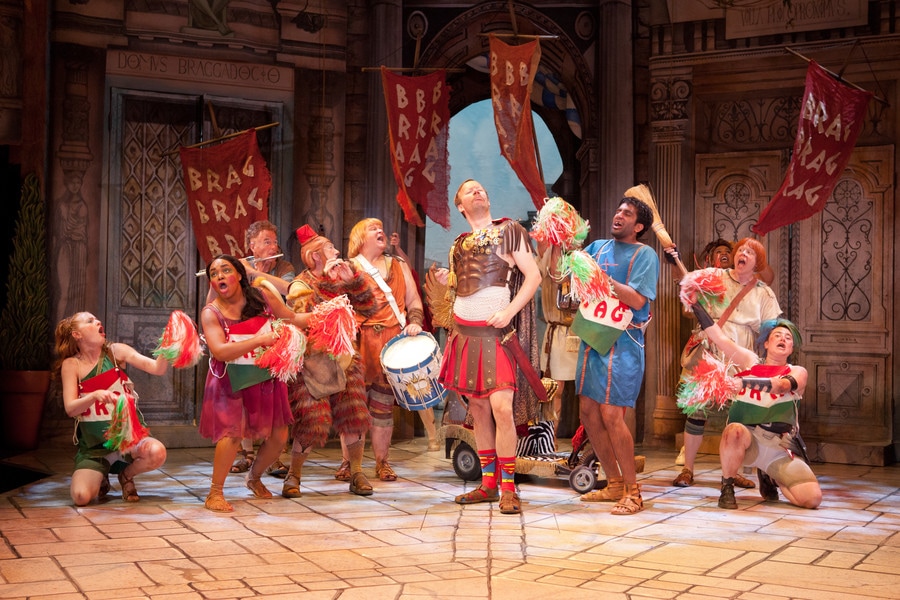 Four wealthy entrepreneurs on a Pacific island in Love's Labour's Lost. Photo by Johan Persson.
Four wealthy entrepreneurs on a Pacific island in Love's Labour's Lost. Photo by Johan Persson.
LOVE’S LABOUR’S LOST
April 18, 2024
RSC, Stratford-upon-Avon, until Saturday, May 18, 2024
“A jest’s prosperity lies in the ear of him that hears it.” So says one of the characters in Shakespeare’s knockabout comedy Love’s Labour’s Lost, which sees four lads struggling to keep to their vow of three years’ monastic existence after the arrival on the scene of four lovable ladies.
It's down to you, then, as an audience member. As one of Will’s more obscure, not to say obtuse, offerings, this is a curious choice as the curtain-raiser on the joint artistic directorship of Tamara Harvey and Daniel Evans, who have been in post almost a year but whose programming is only now coming on-stream.
Neither directs here, handing the reins instead to RSC debutante Emily Burns, whose recent tour of Macbeth with Ralph Fiennes and Indira Varma couched a sturdy production in some vivid modern-day trappings. She pulls off a similar trick here, locating the play on a private Pacific island and introducing the four lads as wealthy young entrepreneurs looking for a paradise escape.
The setting is sumptuous, thanks in no small part to Joanna Scotcher’s extraordinary set, a giant revolve housing the entrance to a swanky Tracy Island-type hideaway, two sweeping staircases and a couple of life-size palm trees. With additional square footage offered by the apron stage, the space transforms into a tennis court, a spa and even, in one inspired scene, a golf course.
The performances tend towards the epic too, with an over-the-top comedy Spaniard in the shape of Jack Bardoe’s Don Armado, an urbane and verbose Tony Gardner as Holofernes and, on shore leave from his role in Our Flag Means Death, a spiky and enjoyable Nathan Foad in the tricky role of the clown Costard. Meanwhile, Luke Thompson’s Berowne is grounded and highly watchable, with Ioanna Kimbook providing a three-dimensional foil to his lovelorn suitor.
It’s notable that all bar two of the cast are also newbies to the RSC, and it will be interesting to see if the Harvey-Evans axis continues to bring in creative colleagues from their past lives. But there’s some RSC continuity in the form of veteran Paul Englishby’s delightful Hawaiian-inspired music, which runs as a thread through the whole production.
Ultimately, the play relies heavily on some fairly turgid wordplay and a lot of references that were relevant in Shakespeare’s day – which might explain why it isn’t often done. Some judicious pruning in both these regards wouldn’t have gone amiss, also helping to trim the excessive three-hour running time, and while the physical comedy and nuance-free farce are always a winner with audiences, they do feel as if they’re stretched a bit thin at times.
It’s a big, brash, busy production with only a short run, so maybe there’s value in its rarity as well as its broad laughs. It may not offer much in the way of clues about the RSC’s forthcoming menu, but as an aperitif it has plenty of breezy appeal.
April 18, 2024
RSC, Stratford-upon-Avon, until Saturday, May 18, 2024
“A jest’s prosperity lies in the ear of him that hears it.” So says one of the characters in Shakespeare’s knockabout comedy Love’s Labour’s Lost, which sees four lads struggling to keep to their vow of three years’ monastic existence after the arrival on the scene of four lovable ladies.
It's down to you, then, as an audience member. As one of Will’s more obscure, not to say obtuse, offerings, this is a curious choice as the curtain-raiser on the joint artistic directorship of Tamara Harvey and Daniel Evans, who have been in post almost a year but whose programming is only now coming on-stream.
Neither directs here, handing the reins instead to RSC debutante Emily Burns, whose recent tour of Macbeth with Ralph Fiennes and Indira Varma couched a sturdy production in some vivid modern-day trappings. She pulls off a similar trick here, locating the play on a private Pacific island and introducing the four lads as wealthy young entrepreneurs looking for a paradise escape.
The setting is sumptuous, thanks in no small part to Joanna Scotcher’s extraordinary set, a giant revolve housing the entrance to a swanky Tracy Island-type hideaway, two sweeping staircases and a couple of life-size palm trees. With additional square footage offered by the apron stage, the space transforms into a tennis court, a spa and even, in one inspired scene, a golf course.
The performances tend towards the epic too, with an over-the-top comedy Spaniard in the shape of Jack Bardoe’s Don Armado, an urbane and verbose Tony Gardner as Holofernes and, on shore leave from his role in Our Flag Means Death, a spiky and enjoyable Nathan Foad in the tricky role of the clown Costard. Meanwhile, Luke Thompson’s Berowne is grounded and highly watchable, with Ioanna Kimbook providing a three-dimensional foil to his lovelorn suitor.
It’s notable that all bar two of the cast are also newbies to the RSC, and it will be interesting to see if the Harvey-Evans axis continues to bring in creative colleagues from their past lives. But there’s some RSC continuity in the form of veteran Paul Englishby’s delightful Hawaiian-inspired music, which runs as a thread through the whole production.
Ultimately, the play relies heavily on some fairly turgid wordplay and a lot of references that were relevant in Shakespeare’s day – which might explain why it isn’t often done. Some judicious pruning in both these regards wouldn’t have gone amiss, also helping to trim the excessive three-hour running time, and while the physical comedy and nuance-free farce are always a winner with audiences, they do feel as if they’re stretched a bit thin at times.
It’s a big, brash, busy production with only a short run, so maybe there’s value in its rarity as well as its broad laughs. It may not offer much in the way of clues about the RSC’s forthcoming menu, but as an aperitif it has plenty of breezy appeal.
 Samuel Barnett and Victoria Yeates as Ben and Imo. Photo by Ellie Kurttz.
Samuel Barnett and Victoria Yeates as Ben and Imo. Photo by Ellie Kurttz.
BEN AND IMO
February 29, 2024
RSC, The Swan, Stratford-upon-Avon, until Saturday, April 6, 2024
There are countless examples across the history of the arts of so-called geniuses behaving monstrously, yet being forgiven and remaining beloved because their extraordinary gifts somehow bestow immunity upon them. From Mozart’s arrogant petulance to Wagner’s antisemitism, the work is often hard to separate from the creator.
The conflation of artist with their art is just as virulent today – perhaps more so, thanks to the ubiquity of social media – meaning that Johnny Depp’s personal life has made him difficult to employ in Hollywood, while JK Rowling continues to prompt boycotts by former Harry Potter fans with her anti-trans posturing.
All of this and more is the tricky subject of Mark Ravenhill’s two-hander play Ben and Imo, which turns the spotlight on the pre-eminent 20th century British composer Benjamin Britten and, in particular, his appalling relationship with Imogen Holst, daughter of Planets composer Gustav and Britten’s assistant in the composition and preparation of the 1953 Coronation opera Gloriana.
Just how much leeway a titan of the artistic world should be granted is a fascinating, intractable question that Ravenhill teases out without ever coming to a conclusion. So we are exposed to Britten goading, haranguing, manipulating and screaming at Imogen – no slouch in the composition stakes herself but willing to subsume her own creativity solely in order to enable Britten’s. He’s bitchy, vicious and, above all, cruel, yet she continues to tolerate his childish outbursts and emotional stuntedness for the sake of the end result, the music.
Samuel Barnett and Victoria Yeates relentlessly circle each other, metaphorically and literally on Soutra Gilmour’s piano-dominated revolving set, sizing each other up, testing each other’s boundaries and wrangling the best possible work out of the chaos of their maladjusted partnership. There’s plenty of light and shade to match the east coast seasons as nine intense months pass between Imo’s arrival and the impending opening of the opera, and the two players deliver top-notch performances.
But there’s a notable hole in the shape of Ben’s life partner and muse, the tenor Peter Pears, for whom he wrote most of his leading roles and whose absence here makes the set-up feel lopsided, like a tripod with a missing leg. There’s also been a clear decision not to engage with posthumous suggestions of Britten’s latent paedophilia and focus instead on the maelstrom of monstrosity that is apparently a necessary component of creative genius.
In her final contribution as RSC interim artistic director before the new season launches under Tamara Harvey and Daniel Evans, Erica Whyman directs, delineating and powerfully dramatising the highs and lows in the to-and-fro dialogue and giving a new life to Ravenhill’s 2013 radio play, reworked a decade on for the Swan stage.
And if we’re still no closer to understanding why brilliant artists can’t be pleasant people – or at least functioning adults – instead of tortured monsters, we can at least hop on for a rollercoaster ride around the creation of an important work of art.
February 29, 2024
RSC, The Swan, Stratford-upon-Avon, until Saturday, April 6, 2024
There are countless examples across the history of the arts of so-called geniuses behaving monstrously, yet being forgiven and remaining beloved because their extraordinary gifts somehow bestow immunity upon them. From Mozart’s arrogant petulance to Wagner’s antisemitism, the work is often hard to separate from the creator.
The conflation of artist with their art is just as virulent today – perhaps more so, thanks to the ubiquity of social media – meaning that Johnny Depp’s personal life has made him difficult to employ in Hollywood, while JK Rowling continues to prompt boycotts by former Harry Potter fans with her anti-trans posturing.
All of this and more is the tricky subject of Mark Ravenhill’s two-hander play Ben and Imo, which turns the spotlight on the pre-eminent 20th century British composer Benjamin Britten and, in particular, his appalling relationship with Imogen Holst, daughter of Planets composer Gustav and Britten’s assistant in the composition and preparation of the 1953 Coronation opera Gloriana.
Just how much leeway a titan of the artistic world should be granted is a fascinating, intractable question that Ravenhill teases out without ever coming to a conclusion. So we are exposed to Britten goading, haranguing, manipulating and screaming at Imogen – no slouch in the composition stakes herself but willing to subsume her own creativity solely in order to enable Britten’s. He’s bitchy, vicious and, above all, cruel, yet she continues to tolerate his childish outbursts and emotional stuntedness for the sake of the end result, the music.
Samuel Barnett and Victoria Yeates relentlessly circle each other, metaphorically and literally on Soutra Gilmour’s piano-dominated revolving set, sizing each other up, testing each other’s boundaries and wrangling the best possible work out of the chaos of their maladjusted partnership. There’s plenty of light and shade to match the east coast seasons as nine intense months pass between Imo’s arrival and the impending opening of the opera, and the two players deliver top-notch performances.
But there’s a notable hole in the shape of Ben’s life partner and muse, the tenor Peter Pears, for whom he wrote most of his leading roles and whose absence here makes the set-up feel lopsided, like a tripod with a missing leg. There’s also been a clear decision not to engage with posthumous suggestions of Britten’s latent paedophilia and focus instead on the maelstrom of monstrosity that is apparently a necessary component of creative genius.
In her final contribution as RSC interim artistic director before the new season launches under Tamara Harvey and Daniel Evans, Erica Whyman directs, delineating and powerfully dramatising the highs and lows in the to-and-fro dialogue and giving a new life to Ravenhill’s 2013 radio play, reworked a decade on for the Swan stage.
And if we’re still no closer to understanding why brilliant artists can’t be pleasant people – or at least functioning adults – instead of tortured monsters, we can at least hop on for a rollercoaster ride around the creation of an important work of art.
 Madeleine Mantock and Tom Varey as Agnes and Will in Hamnet. Photo by Manuel Harlan.
Madeleine Mantock and Tom Varey as Agnes and Will in Hamnet. Photo by Manuel Harlan.
HAMNET
April 12, 2023
RSC, Swan Theatre, Stratford-upon-Avon, until June 17, 2023
It’s probably been anticipated with as much fervour as the latest play by that young upstart Shakespeare. Lolita Chakrabarti’s adaptation of Maggie O’Farrell’s bestselling novel reimagining the lives and relationships of Will, Anne and their children has already sold out in Stratford and is transferring to London’s Garrick Theatre in the autumn.
Directed by acting artistic director Erica Whyman, the RSC picked this show to reopen its remodelled Swan Theatre, with new seats (featuring arms, no less) and a shortened stage. Its wood and crimson upholstery are as cosy and welcoming as they always were, with a bit of added comfort.
With its pedigree and literary antecedents, Hamnet is a solid, reliable seller. This is the theatre which, pre-pandemic, gave us a line of classy book adaptations, from Robert Harris’s Imperium to Hilary Mantel’s Wolf Hall, and this latest addition to the repertoire fits in perfectly to the roll call. It may not be as epic, as moving or as historically intriguing, but it’s got plenty to offer in the way of warmth and wit.
Chakrabarti condenses O’Farrell’s dense narrative into just over a couple of hours, filleting the story to focus on Anne Hathaway – here provocatively renamed Agnes as a symbol of reclaiming her identity from the imagined versions of four centuries of historians. The first half is all plot, with a succession of vignettes culminating in the birth of the Shakespeares’ eponymous son, and it gallops along beside some brisk furniture removal by the 16-strong cast.
Things really get interesting in the second half, though, when Madeleine Mantock’s Agnes is put through the wringer by her children’s various illnesses and the absence of her gallivanting playwright husband, played with panache by Tom Varey. Mantock holds the piece together superbly, leaping between eras and emotions with calm assurance and tugging at the heartstrings along the way.
Tom Piper’s simplistic design allows the theatre itself to do a lot of the heavy lifting, which will make its proscenium-arch transfer challenging, but there are times when things get overly fussy and busy to the detriment of the storytelling – a charge that can also be laid at some of the performances.
But the overall effect is one of considerable care, charm and concern to give voice to some of the lesser-known players in the Shakespeare history, positing a plausible alternative to the accepted version of events – which, as O’Farrell has pointed out, is just as much guesswork as her interpretation.
It’s a good-looking show that aims to make something theatrical out of a prize-winning historical novel. It may not always hit the mark but it’s a bold and worthy attempt.
April 12, 2023
RSC, Swan Theatre, Stratford-upon-Avon, until June 17, 2023
It’s probably been anticipated with as much fervour as the latest play by that young upstart Shakespeare. Lolita Chakrabarti’s adaptation of Maggie O’Farrell’s bestselling novel reimagining the lives and relationships of Will, Anne and their children has already sold out in Stratford and is transferring to London’s Garrick Theatre in the autumn.
Directed by acting artistic director Erica Whyman, the RSC picked this show to reopen its remodelled Swan Theatre, with new seats (featuring arms, no less) and a shortened stage. Its wood and crimson upholstery are as cosy and welcoming as they always were, with a bit of added comfort.
With its pedigree and literary antecedents, Hamnet is a solid, reliable seller. This is the theatre which, pre-pandemic, gave us a line of classy book adaptations, from Robert Harris’s Imperium to Hilary Mantel’s Wolf Hall, and this latest addition to the repertoire fits in perfectly to the roll call. It may not be as epic, as moving or as historically intriguing, but it’s got plenty to offer in the way of warmth and wit.
Chakrabarti condenses O’Farrell’s dense narrative into just over a couple of hours, filleting the story to focus on Anne Hathaway – here provocatively renamed Agnes as a symbol of reclaiming her identity from the imagined versions of four centuries of historians. The first half is all plot, with a succession of vignettes culminating in the birth of the Shakespeares’ eponymous son, and it gallops along beside some brisk furniture removal by the 16-strong cast.
Things really get interesting in the second half, though, when Madeleine Mantock’s Agnes is put through the wringer by her children’s various illnesses and the absence of her gallivanting playwright husband, played with panache by Tom Varey. Mantock holds the piece together superbly, leaping between eras and emotions with calm assurance and tugging at the heartstrings along the way.
Tom Piper’s simplistic design allows the theatre itself to do a lot of the heavy lifting, which will make its proscenium-arch transfer challenging, but there are times when things get overly fussy and busy to the detriment of the storytelling – a charge that can also be laid at some of the performances.
But the overall effect is one of considerable care, charm and concern to give voice to some of the lesser-known players in the Shakespeare history, positing a plausible alternative to the accepted version of events – which, as O’Farrell has pointed out, is just as much guesswork as her interpretation.
It’s a good-looking show that aims to make something theatrical out of a prize-winning historical novel. It may not always hit the mark but it’s a bold and worthy attempt.
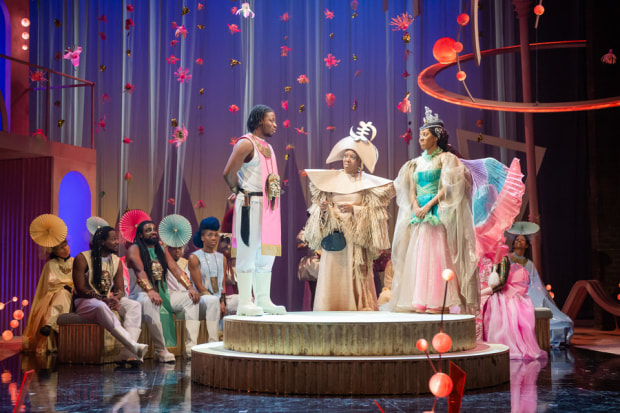 The cast of Roy Alexander Weise's new RSC production of Much Ado About Nothing. Photo by Ikin Yum.
The cast of Roy Alexander Weise's new RSC production of Much Ado About Nothing. Photo by Ikin Yum.
MUCH ADO ABOUT NOTHING
February 18, 2022
RSC, Royal Shakespeare Theatre, Stratford-upon-Avon
Roy Alexander Weise directs an Afrofuturist production of one of Shakespeare's most popular plays.
For Michael Davies’s full review, visit whatsonstage.com.
February 18, 2022
RSC, Royal Shakespeare Theatre, Stratford-upon-Avon
Roy Alexander Weise directs an Afrofuturist production of one of Shakespeare's most popular plays.
For Michael Davies’s full review, visit whatsonstage.com.
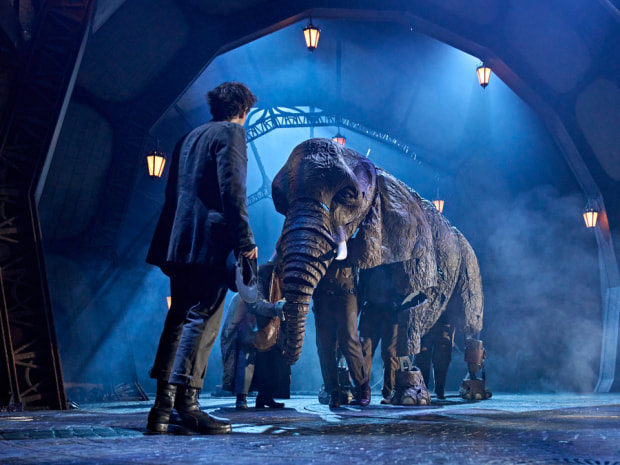 The Magician's Elephant conjures up some impressive imagery. Photo by Manuel Harlan.
The Magician's Elephant conjures up some impressive imagery. Photo by Manuel Harlan.
THE MAGICIAN'S ELEPHANT
October 29, 2021
RSC, Royal Shakespeare Theatre, Stratford-upon-Avon
The RSC conjures up a musical spectacle for a family audience.
For Michael Davies’s full review, visit whatsonstage.com.
October 29, 2021
RSC, Royal Shakespeare Theatre, Stratford-upon-Avon
The RSC conjures up a musical spectacle for a family audience.
For Michael Davies’s full review, visit whatsonstage.com.
THE COMEDY OF ERRORS
July 20, 2021
RSC, Garden Theatre, Stratford-upon-Avon, until Sunday, September 26, 2021, then touring
The Royal Shakespeare Company return to live theatre in a newly-built temporary space on the banks of the River Avon. For Michael Davies's full review visit whatsonstage.com.
July 20, 2021
RSC, Garden Theatre, Stratford-upon-Avon, until Sunday, September 26, 2021, then touring
The Royal Shakespeare Company return to live theatre in a newly-built temporary space on the banks of the River Avon. For Michael Davies's full review visit whatsonstage.com.
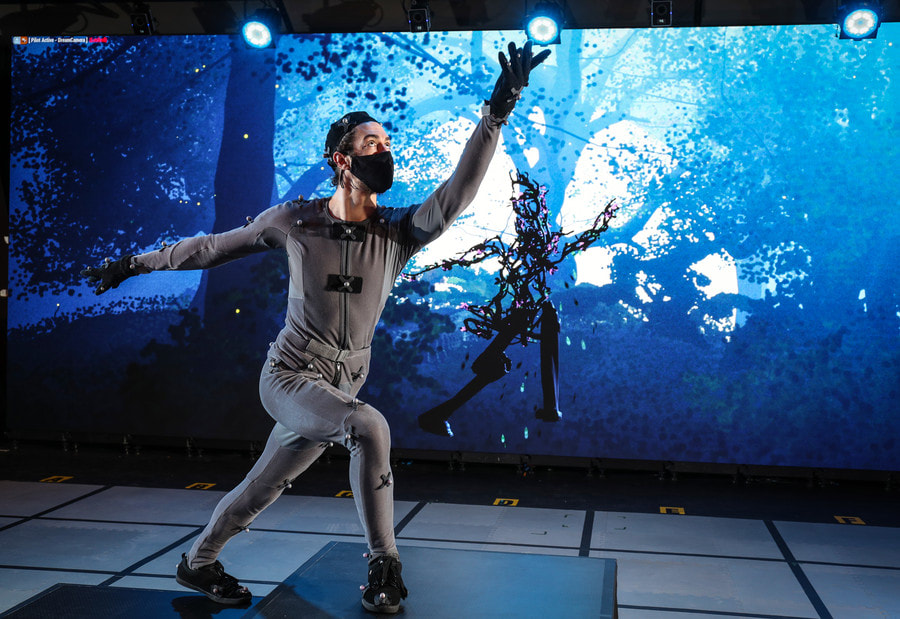 Jamie Morgan in his mo-cap suit for Dream. Photo by Stuart Martin / RSC
Jamie Morgan in his mo-cap suit for Dream. Photo by Stuart Martin / RSC
DREAM
March 16, 2021
RSC, online until Saturday, March 20, 2021
Billed as a research and development project by the RSC in collaboration with a number of digital and other partners, Dream has only the flimsiest connection with Shakespeare’s nominal source material, A Midsummer Night’s Dream. In fact, it’s a 25-minute exploration of the latest techniques and ambitions of motion-capture, testing how it might work in live performance.
Given that it was originally intended to be staged in a theatre before the pandemic struck, it’s a little unfair to this online version that it can no longer be judged for its potential in a real venue. Instead, the team have created what they jargonistically refer to as “the volume” – a cube of performance space in which actors in motion-capture (or “mo-cap”, to coin more jargon) suits move around, then to be transmogrified by the wonders of the technology into virtual avatars.
These figures move around in a digitally-created world – the forest from A Midsummer Night’s Dream – playing with form and movement to generate a weird visual something-or-other. And if the reviewer’s vocabulary appears to have evaporated, it’s because the technology has outrun traditional forms of critique.
What can certainly be said about it is that it’s not a show in any conventional sense. There’s no narrative as such, merely the chance to watch the digital creations interact with each other in what are clearly remarkably clever ways. For fee-paying ticket-holders, there’s a rather spurious opportunity to join in by using your device to “drop” fireflies into the proceedings at strategic moments.
But if technology isn’t your bag, and you can’t picture the future of theatre as computer-generated graphics instead of real-life actors demonstrating their craft, it all ends up feeling a bit self-indulgent. As R&D it’s interesting enough: theatre it isn’t.
March 16, 2021
RSC, online until Saturday, March 20, 2021
Billed as a research and development project by the RSC in collaboration with a number of digital and other partners, Dream has only the flimsiest connection with Shakespeare’s nominal source material, A Midsummer Night’s Dream. In fact, it’s a 25-minute exploration of the latest techniques and ambitions of motion-capture, testing how it might work in live performance.
Given that it was originally intended to be staged in a theatre before the pandemic struck, it’s a little unfair to this online version that it can no longer be judged for its potential in a real venue. Instead, the team have created what they jargonistically refer to as “the volume” – a cube of performance space in which actors in motion-capture (or “mo-cap”, to coin more jargon) suits move around, then to be transmogrified by the wonders of the technology into virtual avatars.
These figures move around in a digitally-created world – the forest from A Midsummer Night’s Dream – playing with form and movement to generate a weird visual something-or-other. And if the reviewer’s vocabulary appears to have evaporated, it’s because the technology has outrun traditional forms of critique.
What can certainly be said about it is that it’s not a show in any conventional sense. There’s no narrative as such, merely the chance to watch the digital creations interact with each other in what are clearly remarkably clever ways. For fee-paying ticket-holders, there’s a rather spurious opportunity to join in by using your device to “drop” fireflies into the proceedings at strategic moments.
But if technology isn’t your bag, and you can’t picture the future of theatre as computer-generated graphics instead of real-life actors demonstrating their craft, it all ends up feeling a bit self-indulgent. As R&D it’s interesting enough: theatre it isn’t.
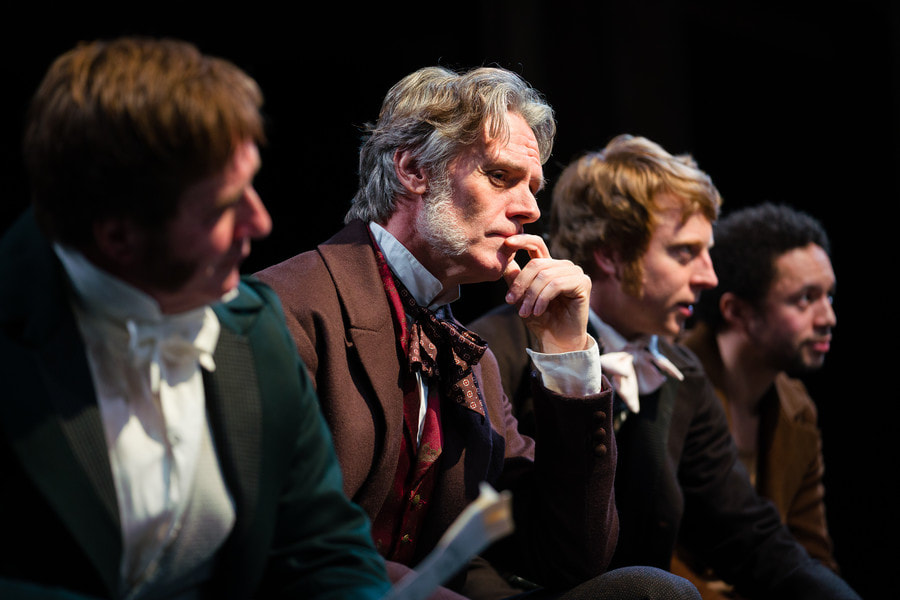 Richard Clothier, second left, as reformer Alexander Boyd in The Whip. Photo by Steve Tanner © RSC
Richard Clothier, second left, as reformer Alexander Boyd in The Whip. Photo by Steve Tanner © RSC
THE WHIP
February 11, 2020
RSC, The Swan Theatre, Stratford-upon-Avon, until Saturday, March 21, 2020
Juliet Gilkes Romero asks some difficult questions in this period piece, ostensibly about the abolition of slavery but plenty of modern resonances.
For Michael Davies’s full review, visit whatsonstage.com
February 11, 2020
RSC, The Swan Theatre, Stratford-upon-Avon, until Saturday, March 21, 2020
Juliet Gilkes Romero asks some difficult questions in this period piece, ostensibly about the abolition of slavery but plenty of modern resonances.
For Michael Davies’s full review, visit whatsonstage.com
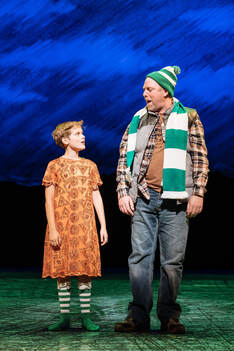 Toby Mocrei and Rufus Hound in The Boy in the Dress. Photo by Manuel Harlan © RSC
Toby Mocrei and Rufus Hound in The Boy in the Dress. Photo by Manuel Harlan © RSC
THE BOY IN THE DRESS
November 27, 2019
RSC, Royal Shakespeare Theatre, Stratford-upon-Avon, until Sunday March 8, 2020
When David Walliams first turned his hand to writing stories for children in 2008, there were many who hailed him as the natural successor to Roald Dahl. It probably helped that his illustrator was Dahl’s former collaborator Quentin Blake and there was plenty of giggle-inducing snot, farts and general unpleasantness.
It’s easy to see the parallels – and that might be a clue as to what prompted the RSC, in its search for a follow-up to its hit musical Matilda, to settle on this story, the tale of Dennis Sims, whose secret desire to dress up like a girl lands him in hot water at school. What’s interesting is that 11 years ago, the premise might have seemed daring – shocking, even. Today it feels a little old-fashioned, quaint, sweet.
Playwright Mark Ravenhill has done a terrific job with the script, keeping all the naughtiness that children love so much but also filling it with smart one-liners, clever gags and poignancy. If the ending feels a bit of a cheat and less than earned, it’s not for want of trying.
Gregory Doran’s production ticks all the right boxes too. On a fabulously ingenious set designed by Robert Jones, with sharp choreography from Aleta Collins and superb musical direction by Alan Williams – commanding a storming 11-piece band – the show looks and sounds magnificent. Voices are crystal clear, like the storytelling, and production values are everything you could wish for, from some balletic football sequences to a sparkling first-act disco scene.
The performances too are wonderful, led on press night by Toby Mocrei in the title role. His acting and singing are full of authentic emotion, and he has the charisma to carry a show that asks a lot of its young cast. Rufus Hound is beautifully touching as his would-be hardman dad, while the ever-reliable Forbes Masson delivers a terrifying turn as the Scottish headmaster Mr Hawtrey, channelling the teacher in Pink Floyd’s The Wall – even down to shouting his abuse through a megaphone.
The question everyone will really be asking is this: with songs by pop superstar Robbie Williams and his regular co-writer Guy Chambers, does the music stand up? Well, the short answer is yes… to a point. The pair certainly have a wicked way with a memorable tune, as Robbie’s chart career can attest, and there’s more than one catchy refrain repeated along the way here. Whether they constitute musical theatre is probably up for debate: for my money, the outpouring of feelings is too often too on-the-nose, while rhyming and scansion appear to have been cheerfully dispensed with, to have the giants of the genre looking anxiously over their shoulders.
But there’s no debating the response of the audience at this Stratford press night, 24 hours ahead of a gala opening that was expected to attract some major names. Most of the auditorium was on its feet in delight. If a show prompts this kind of eager acceptance that being different is OK, then that’s got to be a good thing, surely.
November 27, 2019
RSC, Royal Shakespeare Theatre, Stratford-upon-Avon, until Sunday March 8, 2020
When David Walliams first turned his hand to writing stories for children in 2008, there were many who hailed him as the natural successor to Roald Dahl. It probably helped that his illustrator was Dahl’s former collaborator Quentin Blake and there was plenty of giggle-inducing snot, farts and general unpleasantness.
It’s easy to see the parallels – and that might be a clue as to what prompted the RSC, in its search for a follow-up to its hit musical Matilda, to settle on this story, the tale of Dennis Sims, whose secret desire to dress up like a girl lands him in hot water at school. What’s interesting is that 11 years ago, the premise might have seemed daring – shocking, even. Today it feels a little old-fashioned, quaint, sweet.
Playwright Mark Ravenhill has done a terrific job with the script, keeping all the naughtiness that children love so much but also filling it with smart one-liners, clever gags and poignancy. If the ending feels a bit of a cheat and less than earned, it’s not for want of trying.
Gregory Doran’s production ticks all the right boxes too. On a fabulously ingenious set designed by Robert Jones, with sharp choreography from Aleta Collins and superb musical direction by Alan Williams – commanding a storming 11-piece band – the show looks and sounds magnificent. Voices are crystal clear, like the storytelling, and production values are everything you could wish for, from some balletic football sequences to a sparkling first-act disco scene.
The performances too are wonderful, led on press night by Toby Mocrei in the title role. His acting and singing are full of authentic emotion, and he has the charisma to carry a show that asks a lot of its young cast. Rufus Hound is beautifully touching as his would-be hardman dad, while the ever-reliable Forbes Masson delivers a terrifying turn as the Scottish headmaster Mr Hawtrey, channelling the teacher in Pink Floyd’s The Wall – even down to shouting his abuse through a megaphone.
The question everyone will really be asking is this: with songs by pop superstar Robbie Williams and his regular co-writer Guy Chambers, does the music stand up? Well, the short answer is yes… to a point. The pair certainly have a wicked way with a memorable tune, as Robbie’s chart career can attest, and there’s more than one catchy refrain repeated along the way here. Whether they constitute musical theatre is probably up for debate: for my money, the outpouring of feelings is too often too on-the-nose, while rhyming and scansion appear to have been cheerfully dispensed with, to have the giants of the genre looking anxiously over their shoulders.
But there’s no debating the response of the audience at this Stratford press night, 24 hours ahead of a gala opening that was expected to attract some major names. Most of the auditorium was on its feet in delight. If a show prompts this kind of eager acceptance that being different is OK, then that’s got to be a good thing, surely.
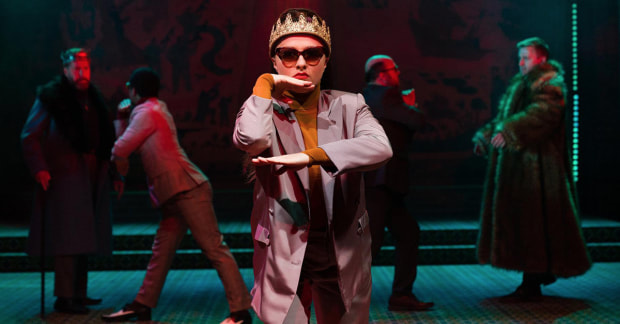 Thoroughly modern monarch: Rosie Sheehy as King John. Photo by Steve Tanner © RSC.
Thoroughly modern monarch: Rosie Sheehy as King John. Photo by Steve Tanner © RSC.
KING JOHN
* * * *
September 26, 2019
RSC, The Swan Theatre, Stratford-upon-Avon, until Saturday March 21, 2020
RSC debutant director Eleanor Rhode gives Shakespeare’s lesser-performed royal play a vibrant makeover for Brexit Britain.
Read Michael Davies’s full review at whatsonstage.com
* * * *
September 26, 2019
RSC, The Swan Theatre, Stratford-upon-Avon, until Saturday March 21, 2020
RSC debutant director Eleanor Rhode gives Shakespeare’s lesser-performed royal play a vibrant makeover for Brexit Britain.
Read Michael Davies’s full review at whatsonstage.com
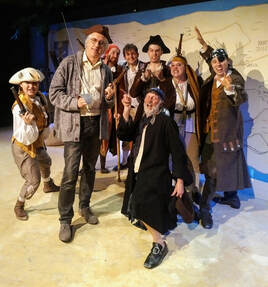 Kidnapped: The cast surround our critic Michael Davies (second left) in a superfluous attempt to influence his review.
Kidnapped: The cast surround our critic Michael Davies (second left) in a superfluous attempt to influence his review.
TREASURE ISLAND
August 16, 2019
Tread the Boards Productions, The Attic Theatre, Stratford-upon-Avon, until Monday, September 21 2019
Never mind 15 men on a dead man’s chest, Tread the Boards’ latest micro-triumph is a swashbuckling romp through Robert Louis Stevenson’s timeless classic delivered by just seven men and women. And a parrot. And a couple of muppets.
And that should tell you all you need to know about this daft but delightful adaptation of the pirate yarn. It’s manic, it’s madcap and it’s moulded to provide a couple of entertaining hours that are very silly indeed. If it wasn’t for that catchy title Stevenson gave it nearly 150 years ago, then Carry On Captain would probably serve just as well.
For this irreverent take on the mutineers’ masterpiece is rooted in a world of very British humour, with glimpses of Basil Fawlty, Blackadder and even ’Allo ’Allo peeking through the yarn that’s being spun. That’s not to say that the adaptation isn’t true to Stevenson’s original – the spine of the story, with its cast of murky characters, sticks closely to the novel. But director John-Robert Partridge never lets duty to the author get in the way of a good gag. Or a bad one, come to that.
In fact, if truth be told, the script is crammed full of jokes that are about as lame as the peg-leg pirate Long John Silver (played with over-the-top relish by Partridge himself). And therein lies much of its charm. The multi-tasking actors love every moment of their costume-changing, identity-swapping anarchy, and the fun is infectious.
From Inspector Clouseau to The Liver Birds, no turn is left unstoned. There’s a brilliantly executed musical interlude in which Matilda Bott and Josh Radcliffe playing a crazed medley of chart hits on duelling ukuleles. There’s a seafaring journey through the Bermuda Triangle featuring every kind of triangle you could imagine, from isosceles to musical. And there are references to every cultural pirate in the book: Jack Sparrow happily rubs shoulders with Captain Pugwash. And there aren’t many places you could write that sentence.
Throw in some wandering eye-patches, special ‘ocean’ effects and some panto-style routines with mops and water-pistols, and it’s about as close as you can get to guaranteeing… well, theatrical treasure. Don’t let on, but the Attic marks the spot.
August 16, 2019
Tread the Boards Productions, The Attic Theatre, Stratford-upon-Avon, until Monday, September 21 2019
Never mind 15 men on a dead man’s chest, Tread the Boards’ latest micro-triumph is a swashbuckling romp through Robert Louis Stevenson’s timeless classic delivered by just seven men and women. And a parrot. And a couple of muppets.
And that should tell you all you need to know about this daft but delightful adaptation of the pirate yarn. It’s manic, it’s madcap and it’s moulded to provide a couple of entertaining hours that are very silly indeed. If it wasn’t for that catchy title Stevenson gave it nearly 150 years ago, then Carry On Captain would probably serve just as well.
For this irreverent take on the mutineers’ masterpiece is rooted in a world of very British humour, with glimpses of Basil Fawlty, Blackadder and even ’Allo ’Allo peeking through the yarn that’s being spun. That’s not to say that the adaptation isn’t true to Stevenson’s original – the spine of the story, with its cast of murky characters, sticks closely to the novel. But director John-Robert Partridge never lets duty to the author get in the way of a good gag. Or a bad one, come to that.
In fact, if truth be told, the script is crammed full of jokes that are about as lame as the peg-leg pirate Long John Silver (played with over-the-top relish by Partridge himself). And therein lies much of its charm. The multi-tasking actors love every moment of their costume-changing, identity-swapping anarchy, and the fun is infectious.
From Inspector Clouseau to The Liver Birds, no turn is left unstoned. There’s a brilliantly executed musical interlude in which Matilda Bott and Josh Radcliffe playing a crazed medley of chart hits on duelling ukuleles. There’s a seafaring journey through the Bermuda Triangle featuring every kind of triangle you could imagine, from isosceles to musical. And there are references to every cultural pirate in the book: Jack Sparrow happily rubs shoulders with Captain Pugwash. And there aren’t many places you could write that sentence.
Throw in some wandering eye-patches, special ‘ocean’ effects and some panto-style routines with mops and water-pistols, and it’s about as close as you can get to guaranteeing… well, theatrical treasure. Don’t let on, but the Attic marks the spot.
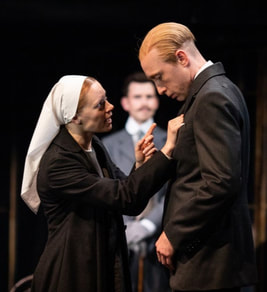 Lucy Phelps and Sandy Grierson star in Measure for Measure. Photo by Helen Maybanks © RSC.
Lucy Phelps and Sandy Grierson star in Measure for Measure. Photo by Helen Maybanks © RSC.
MEASURE FOR MEASURE
* * * *
July 4, 2019
RSC, Royal Shakespeare Theatre, Stratford-upon-Avon, until Thursday, August 29, 2019
Artistic director Gregory Doran directs the last of the summer’s three Shakespeare plays at the RSC.
For Michael Davies’s full review, visit whatsonstage.com
* * * *
July 4, 2019
RSC, Royal Shakespeare Theatre, Stratford-upon-Avon, until Thursday, August 29, 2019
Artistic director Gregory Doran directs the last of the summer’s three Shakespeare plays at the RSC.
For Michael Davies’s full review, visit whatsonstage.com
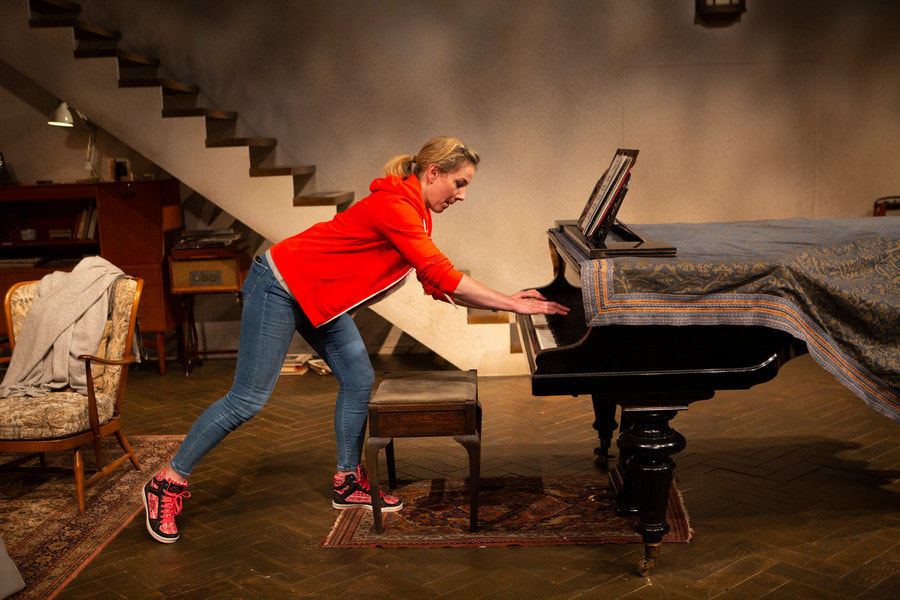 Jeany Spark intrigues in Crooked Dances at The Other Place. Photo by Ellie Kurttz © RSC.
Jeany Spark intrigues in Crooked Dances at The Other Place. Photo by Ellie Kurttz © RSC.
CROOKED DANCES
* * *
June 26, 2019
RSC, The Other Place, Stratford-upon-Avon, until Saturday, July 13, 2019
A new play by Robin French intrigues with its bewildering jumble of ideas and themes.
For Michael Davies’s full review, visit whatsonstage.com
* * *
June 26, 2019
RSC, The Other Place, Stratford-upon-Avon, until Saturday, July 13, 2019
A new play by Robin French intrigues with its bewildering jumble of ideas and themes.
For Michael Davies’s full review, visit whatsonstage.com
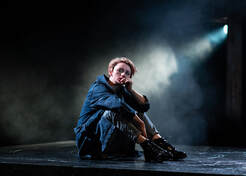 Jodie McNee in Venice Preserved. Photo by Helen Maybanks © RSC.
Jodie McNee in Venice Preserved. Photo by Helen Maybanks © RSC.
VENICE PRESERVED
* * * *
May 30, 2019
RSC, The Swan Theatre, Stratford-upon-Avon, until Saturday September 7, 2019
Michael Davies finds Thomas Otway’s ‘dangerously enticing’ Restoration thriller, directed by Prasanna Puwanarajah, moody and captivating in equal measure.
For the full review, visit whatsonstage.com
* * * *
May 30, 2019
RSC, The Swan Theatre, Stratford-upon-Avon, until Saturday September 7, 2019
Michael Davies finds Thomas Otway’s ‘dangerously enticing’ Restoration thriller, directed by Prasanna Puwanarajah, moody and captivating in equal measure.
For the full review, visit whatsonstage.com
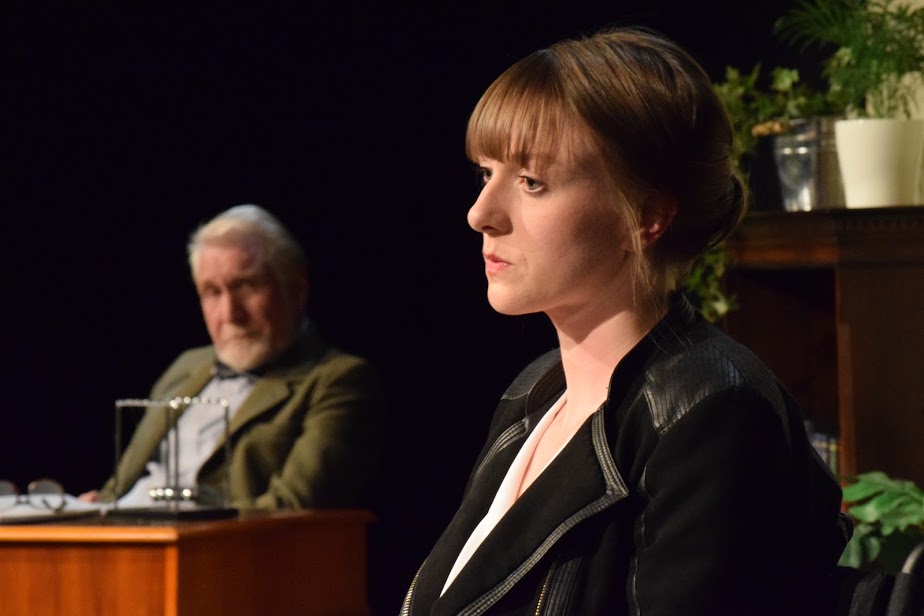 Martin Bourne and Katherine Parker-Jones in Aspect Theatre's Duet for One. Photo by David Jones.
Martin Bourne and Katherine Parker-Jones in Aspect Theatre's Duet for One. Photo by David Jones.
DUET FOR ONE
May 16, 2019
Aspect Theatre, The Attic Theatre, Stratford-upon-Avon, until Saturday, May 18, 2019
This fascinating two-hander was written in 1980 by playwright Tom Kempinski as a vehicle for his then wife, Frances de la Tour. It was subsequently made into a film starring Julie Andrews, and enjoyed a 2009 West End revival with Juliet Stevenson and Henry Goodman.
It reveals, appointment by appointment, the nerve-shredding state of mind of concert violinist Stephanie Abrahams as she offloads to her psychiatrist Dr Feldmann about her struggles with incipient multiple sclerosis. The disease has forced her to give up her career and, over the course of six sessions with the shrink, she approaches her situation with everything from chipper breeziness to outright fury.
Although denied by the playwright, the narrative bears striking similarities to the real-life story of cellist Jacqueline du Pré, and director Marc W Dugmore’s production uses Mendelssohn intelligently to frame and partition the scenes, setting us firmly in a world of classical music. Indeed, the central question posed by the script – is it possible to survive without culture? – is reinforced at every turn.
The tautness of the piece fits well in Stratford’s Attic space. Katherine Parker-Jones as Stephanie and Martin Bourne as the psychiatrist played the roles a couple of years ago at the Swan studio in Worcester and are revisiting the play as the first production by a new company, Aspect Theatre. Aspect will be back at the Attic in November with Patrick Marber’s take on Strindberg, After Miss Julie.
As the debut show from a new company, Duet for One sets a high benchmark. Bourne makes an almost cruelly enigmatic Feldmann, refusing to answer questions or responding with just a raised eyebrow in his cat-and-mouse attempt to get Stephanie to talk. For her part, Parker-Jones carries the burden of the emotional heft of the piece – not to mention a mountainous number of lines – and captures perfectly the broken spirit of an artist denied the ability to create.
They work strongly together, playing off each other with a deftness that is often strikingly effective. The pacing lags from time to time, and the moments of discovery, confession and rage occasionally lack the spark of real electricity, but it’s a sound, sympathetic rendering of a powerful play that deserves a much bigger audience than turned out on this Thursday night in Stratford.
May 16, 2019
Aspect Theatre, The Attic Theatre, Stratford-upon-Avon, until Saturday, May 18, 2019
This fascinating two-hander was written in 1980 by playwright Tom Kempinski as a vehicle for his then wife, Frances de la Tour. It was subsequently made into a film starring Julie Andrews, and enjoyed a 2009 West End revival with Juliet Stevenson and Henry Goodman.
It reveals, appointment by appointment, the nerve-shredding state of mind of concert violinist Stephanie Abrahams as she offloads to her psychiatrist Dr Feldmann about her struggles with incipient multiple sclerosis. The disease has forced her to give up her career and, over the course of six sessions with the shrink, she approaches her situation with everything from chipper breeziness to outright fury.
Although denied by the playwright, the narrative bears striking similarities to the real-life story of cellist Jacqueline du Pré, and director Marc W Dugmore’s production uses Mendelssohn intelligently to frame and partition the scenes, setting us firmly in a world of classical music. Indeed, the central question posed by the script – is it possible to survive without culture? – is reinforced at every turn.
The tautness of the piece fits well in Stratford’s Attic space. Katherine Parker-Jones as Stephanie and Martin Bourne as the psychiatrist played the roles a couple of years ago at the Swan studio in Worcester and are revisiting the play as the first production by a new company, Aspect Theatre. Aspect will be back at the Attic in November with Patrick Marber’s take on Strindberg, After Miss Julie.
As the debut show from a new company, Duet for One sets a high benchmark. Bourne makes an almost cruelly enigmatic Feldmann, refusing to answer questions or responding with just a raised eyebrow in his cat-and-mouse attempt to get Stephanie to talk. For her part, Parker-Jones carries the burden of the emotional heft of the piece – not to mention a mountainous number of lines – and captures perfectly the broken spirit of an artist denied the ability to create.
They work strongly together, playing off each other with a deftness that is often strikingly effective. The pacing lags from time to time, and the moments of discovery, confession and rage occasionally lack the spark of real electricity, but it’s a sound, sympathetic rendering of a powerful play that deserves a much bigger audience than turned out on this Thursday night in Stratford.
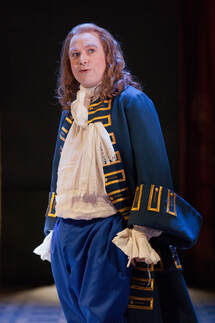
THE PROVOKED WIFE
* * *
May 9, 2019
RSC, The Swan Theatre, Stratford-upon-Avon, until Saturday September 7, 2019
John Vanbrugh’s broad, rather seedy 1697 comedy is given an unironic staging with Phillip Breen directing Caroline Quentin, Jonathan Slinger, Alexandra Gilbreath and Rufus Hound.
For Michael Davies’s full review, visit whatsonstage.com
Right: Rufus Hound as Constant in The Provoked Wife. Photo by Pete Le May © RSC.
* * *
May 9, 2019
RSC, The Swan Theatre, Stratford-upon-Avon, until Saturday September 7, 2019
John Vanbrugh’s broad, rather seedy 1697 comedy is given an unironic staging with Phillip Breen directing Caroline Quentin, Jonathan Slinger, Alexandra Gilbreath and Rufus Hound.
For Michael Davies’s full review, visit whatsonstage.com
Right: Rufus Hound as Constant in The Provoked Wife. Photo by Pete Le May © RSC.
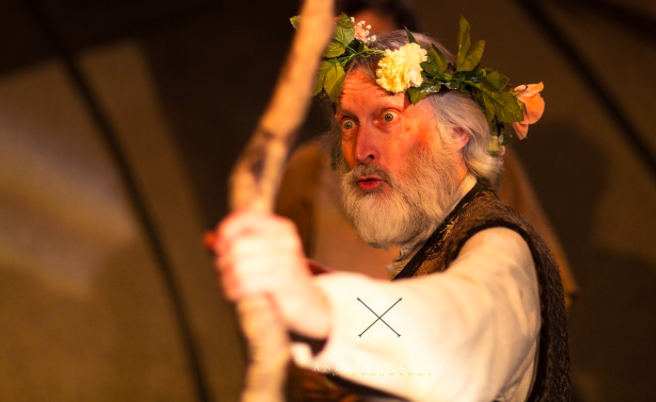 Poignant: Philip Leach in the title role of Tread the Boards' production of King Lear.
Poignant: Philip Leach in the title role of Tread the Boards' production of King Lear.
KING LEAR
April 14, 2019
Tread the Boards Productions, The Attic Theatre, Stratford-upon-Avon, until Sunday, April 21, 2019
You could hardly accuse Stratford’s fringe company Tread the Boards of not being ambitious. Not exactly graced with the resources of their internationally famous Shakespearean colleagues across Bancroft Gardens, this enterprising outfit celebrates its tenth year in the home of the Bard with two contrasting productions. Much Ado (reviewed below) provides the laughs: King Lear offers gravitas by the bucketload.
Anyone familiar with the company will not be surprised to learn that the sizeable ensemble has strength in depth, with even the smallest roles delivered with real talent and a youthful energy. Tread the Boards manage to source skilful actors in sufficient numbers to make a production of this scale really work in the tiny loft space of the Attic Theatre.
The wide and shallow playing space means the action is never more than a few inches away from the studio theatre audience, and director John-Robert Partridge exploits the opportunities for intimacy and immediacy that the intense proximity supplies. Effective lighting by Kat Murray and a simple set design by Zoe Rolph also contribute to the overall impact.
Among the players, Matilda Bott doubles intriguingly as Cordelia and the Fool, demonstrating both innocence as the former and a talent for tomfoolery as the latter, while Pete Meredith’s villainous Edmund is charismatic and sinister in equal measure. But the truth is that the acting is universally top-notch, and one of the greatest feathers in the cap of this small but beautifully formed troupe.
Appropriately enough, assuming the performing crown is Philip Leach in the title role. Generally accepted as the Everest of Shakespearean parts, Lear ranges from rage to insanity, poignancy to pathos, and Leach can do them all. There’s never a moment when he’s on stage when you find yourself analysing the acting: it’s always believable, truthful and emotionally engaging. The wayward monarch’s descent from megalomania to madness is intelligently drawn, and Shakespeare’s language is delivered with consistency and care.
At a little over three hours, the production could probably stand a tad more editing, but there’s no denying the quality of the company and its commitment to offering a visceral, vibrant alternative to the big boys (and girls) up the road. There’s nothing second-class about these citizens.
King Lear plays in repertory with Much Ado About Nothing until Sunday, April 21, 2019.
April 14, 2019
Tread the Boards Productions, The Attic Theatre, Stratford-upon-Avon, until Sunday, April 21, 2019
You could hardly accuse Stratford’s fringe company Tread the Boards of not being ambitious. Not exactly graced with the resources of their internationally famous Shakespearean colleagues across Bancroft Gardens, this enterprising outfit celebrates its tenth year in the home of the Bard with two contrasting productions. Much Ado (reviewed below) provides the laughs: King Lear offers gravitas by the bucketload.
Anyone familiar with the company will not be surprised to learn that the sizeable ensemble has strength in depth, with even the smallest roles delivered with real talent and a youthful energy. Tread the Boards manage to source skilful actors in sufficient numbers to make a production of this scale really work in the tiny loft space of the Attic Theatre.
The wide and shallow playing space means the action is never more than a few inches away from the studio theatre audience, and director John-Robert Partridge exploits the opportunities for intimacy and immediacy that the intense proximity supplies. Effective lighting by Kat Murray and a simple set design by Zoe Rolph also contribute to the overall impact.
Among the players, Matilda Bott doubles intriguingly as Cordelia and the Fool, demonstrating both innocence as the former and a talent for tomfoolery as the latter, while Pete Meredith’s villainous Edmund is charismatic and sinister in equal measure. But the truth is that the acting is universally top-notch, and one of the greatest feathers in the cap of this small but beautifully formed troupe.
Appropriately enough, assuming the performing crown is Philip Leach in the title role. Generally accepted as the Everest of Shakespearean parts, Lear ranges from rage to insanity, poignancy to pathos, and Leach can do them all. There’s never a moment when he’s on stage when you find yourself analysing the acting: it’s always believable, truthful and emotionally engaging. The wayward monarch’s descent from megalomania to madness is intelligently drawn, and Shakespeare’s language is delivered with consistency and care.
At a little over three hours, the production could probably stand a tad more editing, but there’s no denying the quality of the company and its commitment to offering a visceral, vibrant alternative to the big boys (and girls) up the road. There’s nothing second-class about these citizens.
King Lear plays in repertory with Much Ado About Nothing until Sunday, April 21, 2019.
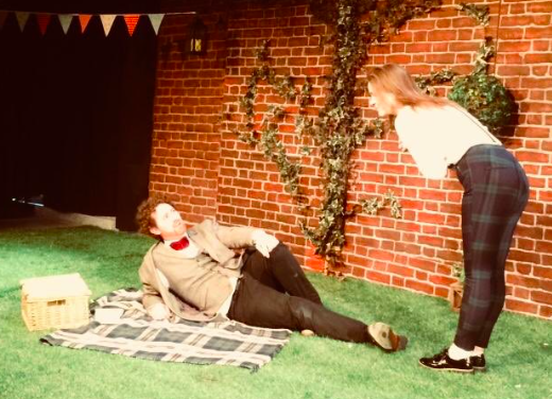 Brisk and breezy: John Robert Partridge and Alexandra Whitworth as Beatrice and Benedick.
Brisk and breezy: John Robert Partridge and Alexandra Whitworth as Beatrice and Benedick.
MUCH ADO ABOUT NOTHING
April 6, 2019
Tread the Boards Productions, The Attic Theatre, Stratford-upon-Avon, until Sunday, April 28, 2019
Those in the know understand that there is more to Stratford-upon-Avon’s Shakespearean offerings than the RSC. Just across Bancroft Gardens, snuggled in the beams of the Cox’s Yard complex, sits The Attic, whose resident company Tread the Boards regularly delivers some of the most consistently enjoyable and audience-friendly productions of the Bard that you could wish for.
Much Ado, directed by first-timers Matilda Bott and Robert Moore, follows in a long line of appealing, accessible productions of Will’s works, and brings the company’s usual spirit of playfulness and professionalism to bear on the tale of sparring partners Beatrice and Benedick.
Performed in modern dress, on a stage adorned with a lush green lawn and strung with fairy lights, this brisk, breezy interpretation wisely concentrates on the will-they-won’t-they pairing at its heart, while side plots involving the scheming uncle Don John and the dim-witted yokels who make up the neighbourhood watch are given just enough room to make sense without becoming a wearisome distraction.
John Robert Partridge as Benedick has a wonderful facility with the language, ranging intelligently from high comedy to charming pathos, and he’s ably supported by Georgia Kelly and Pete Meredith as his compatriots Donna Patricia and Claudio respectively. Alexandra Whitworth’s Beatrice has flashes of sparkle, and her interactions with her cousin Hero (Kate Gee Finch) are full of fun, while the directors contribute nice cameos as Don John (Moore) and Dogberry – a show-stealing turn in twinset and pearls by Bott.
The action is beautifully paced and the simplicity of the set and lighting (Kat Murray) helps keep the focus on the well-spoken text. The intimacy of the space means there’s precious little room for manoeuvre and every performing nuance is exposed, but with hands as safe as these, that’s never an issue.
Much Ado About Nothing plays in repertory with King Lear until Sunday, April 28, 2019.
April 6, 2019
Tread the Boards Productions, The Attic Theatre, Stratford-upon-Avon, until Sunday, April 28, 2019
Those in the know understand that there is more to Stratford-upon-Avon’s Shakespearean offerings than the RSC. Just across Bancroft Gardens, snuggled in the beams of the Cox’s Yard complex, sits The Attic, whose resident company Tread the Boards regularly delivers some of the most consistently enjoyable and audience-friendly productions of the Bard that you could wish for.
Much Ado, directed by first-timers Matilda Bott and Robert Moore, follows in a long line of appealing, accessible productions of Will’s works, and brings the company’s usual spirit of playfulness and professionalism to bear on the tale of sparring partners Beatrice and Benedick.
Performed in modern dress, on a stage adorned with a lush green lawn and strung with fairy lights, this brisk, breezy interpretation wisely concentrates on the will-they-won’t-they pairing at its heart, while side plots involving the scheming uncle Don John and the dim-witted yokels who make up the neighbourhood watch are given just enough room to make sense without becoming a wearisome distraction.
John Robert Partridge as Benedick has a wonderful facility with the language, ranging intelligently from high comedy to charming pathos, and he’s ably supported by Georgia Kelly and Pete Meredith as his compatriots Donna Patricia and Claudio respectively. Alexandra Whitworth’s Beatrice has flashes of sparkle, and her interactions with her cousin Hero (Kate Gee Finch) are full of fun, while the directors contribute nice cameos as Don John (Moore) and Dogberry – a show-stealing turn in twinset and pearls by Bott.
The action is beautifully paced and the simplicity of the set and lighting (Kat Murray) helps keep the focus on the well-spoken text. The intimacy of the space means there’s precious little room for manoeuvre and every performing nuance is exposed, but with hands as safe as these, that’s never an issue.
Much Ado About Nothing plays in repertory with King Lear until Sunday, April 28, 2019.
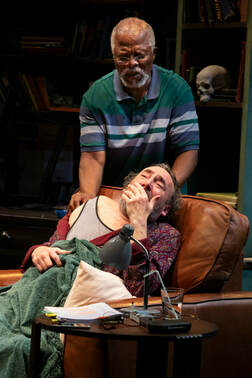 Black and white: John Kani and Antony Sher star in Kani's new play Kunene and the King. Photo by Ellie Kurttz © RSC.
Black and white: John Kani and Antony Sher star in Kani's new play Kunene and the King. Photo by Ellie Kurttz © RSC.
KUNENE AND THE KING
* * * *
April 3, 2019
RSC, Swan Theatre, Stratford-upon-Avon, until Tuesday, April 23, 2019
John Kani’s deeply personal new play about the impact of apartheid 25 years on stars the playwright and RSC stalwart Antony Sher.
For Michael Davies’s full review, visit whatsonstage.com
* * * *
April 3, 2019
RSC, Swan Theatre, Stratford-upon-Avon, until Tuesday, April 23, 2019
John Kani’s deeply personal new play about the impact of apartheid 25 years on stars the playwright and RSC stalwart Antony Sher.
For Michael Davies’s full review, visit whatsonstage.com
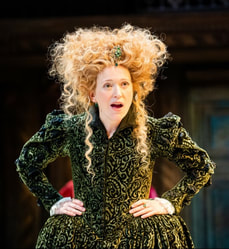 Tricky: Claire Price stars as Petruchia in the gender-swapped production of The Taming of the Shrew. Photo by Ikin Yum © RSC.
Tricky: Claire Price stars as Petruchia in the gender-swapped production of The Taming of the Shrew. Photo by Ikin Yum © RSC.
THE TAMING OF THE SHREW
* * * *
March 19, 2019
RSC, Royal Shakespeare Theatre, Stratford-upon-Avon, until Saturday August 31, 2019, then touring
A gender-swapped version of Shakespeare’s tricky play, directed by Justin Audibert, plays in rep with As You Like It and Measure for Measure.
For Michael Davies’s full review, visit whatsonstage.com
* * * *
March 19, 2019
RSC, Royal Shakespeare Theatre, Stratford-upon-Avon, until Saturday August 31, 2019, then touring
A gender-swapped version of Shakespeare’s tricky play, directed by Justin Audibert, plays in rep with As You Like It and Measure for Measure.
For Michael Davies’s full review, visit whatsonstage.com
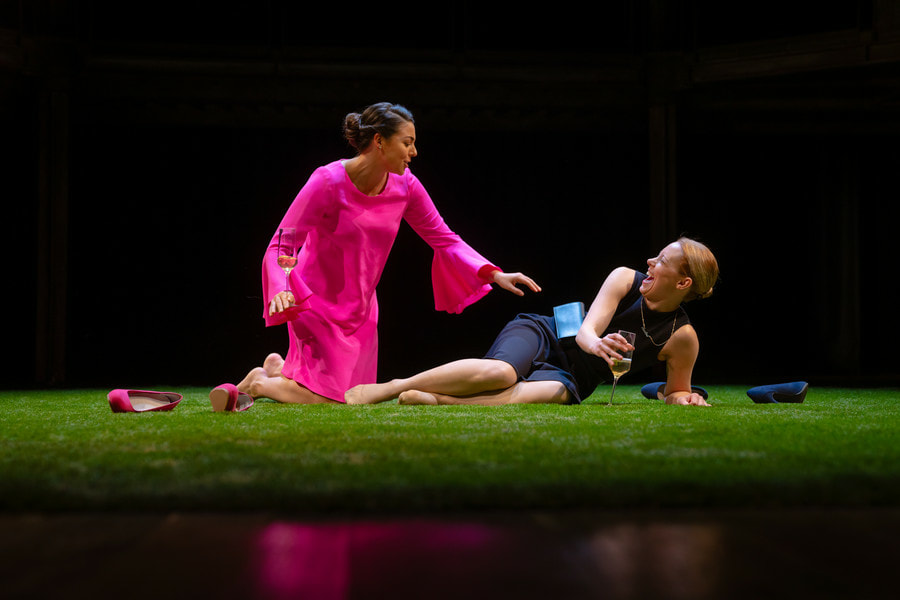 Sophie Khan Levy and Lucy Phelps as Celia and Rosalind. Photo by Topher McGrillis. © RSC.
Sophie Khan Levy and Lucy Phelps as Celia and Rosalind. Photo by Topher McGrillis. © RSC.
AS YOU LIKE IT
* * *
February 21, 2019
RSC, Royal Shakespeare Theatre, Stratford-upon-Avon, until Saturday August 31, 2019, then touring
Kimberley Sykes directs the first in the RSC’s new ensemble season.
For Michael Davies’s full review, visit whatsonstage.com
* * *
February 21, 2019
RSC, Royal Shakespeare Theatre, Stratford-upon-Avon, until Saturday August 31, 2019, then touring
Kimberley Sykes directs the first in the RSC’s new ensemble season.
For Michael Davies’s full review, visit whatsonstage.com
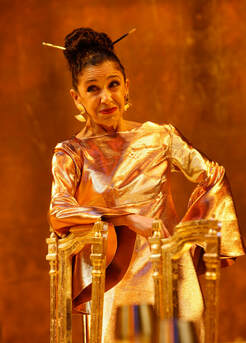 Kathryn Hunter stars as Timon of Athens. Photo by Simon Annand © RSC.
Kathryn Hunter stars as Timon of Athens. Photo by Simon Annand © RSC.
TIMON OF ATHENS
* * * *
December 12, 2018
RSC, Swan Theatre, Stratford-upon-Avon, until Friday, February 22, 2019
Kathryn Hunter stars in Simon Godwin’s filleted version of Shakespeare’s play.
For Michael Davies’s full review, visit whatsonstage.com
* * * *
December 12, 2018
RSC, Swan Theatre, Stratford-upon-Avon, until Friday, February 22, 2019
Kathryn Hunter stars in Simon Godwin’s filleted version of Shakespeare’s play.
For Michael Davies’s full review, visit whatsonstage.com
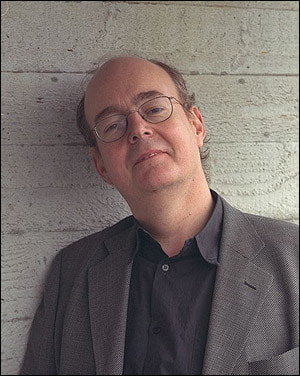 Trying It On: David Edgar, writer and performer.
Trying It On: David Edgar, writer and performer.
TRYING IT ON
* * * *
October 19, 2018
RSC, The Other Place, Stratford-upon-Avon, until Saturday, October 20, 2018
David Edgar’s 1983 play Maydays reaches the end of its all-too-brief run at Stratford’s The Other Place after shaking up quite a few preconceptions and shining a harsh spotlight on today’s political agenda. Now, to coincide with its closure, the playwright himself gives just three performances of his own one-man show as a kind of companion piece.
Devised following a conversation in which he mused about how he would explain his current political thinking to his younger self – 50 years younger, in fact – Trying It On is a glorious mix of self-effacing fallibility, hilarious pomposity-pricking and biting social comment. Its form (which I won’t divulge for fear of giving too much away) matches the brilliance of its content and it’s no trouble at all to set aside the acting shortcomings of a man who, by his own admission, hasn’t performed on a stage since his student days, and never professionally.
And while he doesn’t let himself off the hook, with frequent challenges to his relative inaction politically or his ‘selling out’ to become a mainstream writer, neither does he allow the audience to be complacent. Instead, we are invited to reflect on our own complicity in creating a world – and legacy – which could hardly be said to be inspiring to the generations coming along behind.
These tough messages are wrapped up in flashes of Edgar humour, but retain their sting nonetheless. Director Christopher Haydon and designer Frankie Bradshaw position their man in front of an array of cardboard boxes and filing cabinets which serve as both backdrop for projected images and video and useful containers for some selectively employed props. The effect is simple but clever, supplementing Edgar’s 90-minute monologue without ever overpowering it.
He’s said to have had second thoughts about going through with the whole project, but it’s a tribute to his resilience, natural charm and profundity that Trying It On carries such a powerful punch. It may not claim a gong for acting, but the production is unquestionably a winner.
* * * *
October 19, 2018
RSC, The Other Place, Stratford-upon-Avon, until Saturday, October 20, 2018
David Edgar’s 1983 play Maydays reaches the end of its all-too-brief run at Stratford’s The Other Place after shaking up quite a few preconceptions and shining a harsh spotlight on today’s political agenda. Now, to coincide with its closure, the playwright himself gives just three performances of his own one-man show as a kind of companion piece.
Devised following a conversation in which he mused about how he would explain his current political thinking to his younger self – 50 years younger, in fact – Trying It On is a glorious mix of self-effacing fallibility, hilarious pomposity-pricking and biting social comment. Its form (which I won’t divulge for fear of giving too much away) matches the brilliance of its content and it’s no trouble at all to set aside the acting shortcomings of a man who, by his own admission, hasn’t performed on a stage since his student days, and never professionally.
And while he doesn’t let himself off the hook, with frequent challenges to his relative inaction politically or his ‘selling out’ to become a mainstream writer, neither does he allow the audience to be complacent. Instead, we are invited to reflect on our own complicity in creating a world – and legacy – which could hardly be said to be inspiring to the generations coming along behind.
These tough messages are wrapped up in flashes of Edgar humour, but retain their sting nonetheless. Director Christopher Haydon and designer Frankie Bradshaw position their man in front of an array of cardboard boxes and filing cabinets which serve as both backdrop for projected images and video and useful containers for some selectively employed props. The effect is simple but clever, supplementing Edgar’s 90-minute monologue without ever overpowering it.
He’s said to have had second thoughts about going through with the whole project, but it’s a tribute to his resilience, natural charm and profundity that Trying It On carries such a powerful punch. It may not claim a gong for acting, but the production is unquestionably a winner.
 Distress call: Richard Cant as Jeremy in David Edgar's epic Maydays. Photo by Richard Lakos © RSC.
Distress call: Richard Cant as Jeremy in David Edgar's epic Maydays. Photo by Richard Lakos © RSC.
MAYDAYS
* * * *
October 12, 2018
RSC, The Other Place, Stratford-upon-Avon, until Saturday, October 20, 2018
It’s been 35 years since David Edgar’s exploration of the roots of Thatcherism was first staged by the RSC. Then, it was at The Barbican in London with a cast of 20 and a contemporary urgency that put a harsh spotlight on the failings of the political left.
Today, it’s got a surprisingly fresh feel to it, and much of that urgency remains. In reworking it for a cast half the size and the studio setting of Stratford’s Other Place, Edgar has transformed it into a history play that still carries significant resonance for a 2018 audience.
It’s political polemic, there are no two ways about it. And while the arguments are constantly shifting in the mouths and minds of the characters, it’s ultimately a hectoring, didactic piece of theatre that never quite breaks free of its politics to engage the heart as strongly as it does the brain.
That’s not to say it isn’t epic, timely and beautifully written, and in the hands of director Owen Horsley and his team it is impeccably delivered, with a carefully judged mix of vinegar and honey. Richard Cant’s pragmatic socialist Jeremy, in particular, smooths the edges of revolutionary zeal with disarming charm and credibility. Mark Quartley as his student Martin is all fire and vibrancy in his youth, but later swayed by middle age and his mentor into a new perspective.
The characters’ through lines are all clearly drawn and the way Edgar has restructured the piece to bring them together in the third part feels less contrived than it might, although his conclusions are far less tidy than his plotting. And quite right too: with the benefit of several decades of hindsight, and with the world in its current state of turmoil, things look much less straightforward than they used to. As Martin angrily demands of his erstwhile communist chums, how will we look back on these days and events in five years’ time?
Horsley and his designer Simon Wells accentuate the themes of each of Edgar’s three unevenly divided sections with the staging. The first part, performed in the round, focuses on the student anger of the post-war years and 1960s, when communal groups worked together to fight the battle of the oppressed. Switching to Cold War Eastern Europe, the theatre is reconfigured as a traverse stage, emphasizing the us-and-them nature of the struggle. By the third part, as Jeremy and Martin both succumb to the practicalities of a kind of libertarian conservatism, the staging has become a conventional end-on theatre – traditional and safe, one might infer.
But the power and strength of all the ensemble’s performances – whether major role or minor supporting player – make this far from safe, and fully in keeping with The Other Place’s stated mission to shake up our view of society. As its title implies, Maydays remains Edgar’s urgent distress call to an increasingly topsy-turvy world.
* * * *
October 12, 2018
RSC, The Other Place, Stratford-upon-Avon, until Saturday, October 20, 2018
It’s been 35 years since David Edgar’s exploration of the roots of Thatcherism was first staged by the RSC. Then, it was at The Barbican in London with a cast of 20 and a contemporary urgency that put a harsh spotlight on the failings of the political left.
Today, it’s got a surprisingly fresh feel to it, and much of that urgency remains. In reworking it for a cast half the size and the studio setting of Stratford’s Other Place, Edgar has transformed it into a history play that still carries significant resonance for a 2018 audience.
It’s political polemic, there are no two ways about it. And while the arguments are constantly shifting in the mouths and minds of the characters, it’s ultimately a hectoring, didactic piece of theatre that never quite breaks free of its politics to engage the heart as strongly as it does the brain.
That’s not to say it isn’t epic, timely and beautifully written, and in the hands of director Owen Horsley and his team it is impeccably delivered, with a carefully judged mix of vinegar and honey. Richard Cant’s pragmatic socialist Jeremy, in particular, smooths the edges of revolutionary zeal with disarming charm and credibility. Mark Quartley as his student Martin is all fire and vibrancy in his youth, but later swayed by middle age and his mentor into a new perspective.
The characters’ through lines are all clearly drawn and the way Edgar has restructured the piece to bring them together in the third part feels less contrived than it might, although his conclusions are far less tidy than his plotting. And quite right too: with the benefit of several decades of hindsight, and with the world in its current state of turmoil, things look much less straightforward than they used to. As Martin angrily demands of his erstwhile communist chums, how will we look back on these days and events in five years’ time?
Horsley and his designer Simon Wells accentuate the themes of each of Edgar’s three unevenly divided sections with the staging. The first part, performed in the round, focuses on the student anger of the post-war years and 1960s, when communal groups worked together to fight the battle of the oppressed. Switching to Cold War Eastern Europe, the theatre is reconfigured as a traverse stage, emphasizing the us-and-them nature of the struggle. By the third part, as Jeremy and Martin both succumb to the practicalities of a kind of libertarian conservatism, the staging has become a conventional end-on theatre – traditional and safe, one might infer.
But the power and strength of all the ensemble’s performances – whether major role or minor supporting player – make this far from safe, and fully in keeping with The Other Place’s stated mission to shake up our view of society. As its title implies, Maydays remains Edgar’s urgent distress call to an increasingly topsy-turvy world.
 Jude Owusu as Tamburlaine. Photo by Ellie Kurttz © RSC.
Jude Owusu as Tamburlaine. Photo by Ellie Kurttz © RSC.
TAMBURLAINE
* * * *
August 28, 2018
RSC, Swan Theatre, Stratford-upon-Avon, until Saturday, December 1, 2018
For ten years, Michael Boyd ran the RSC, overseeing the construction of the new main house and the redevelopment of The Other Place. This undoubtedly gave him invaluable insight into how the organisation’s three theatre spaces work, and it’s knowledge that he has put to excellent use in this condensed production of Christopher Marlowe’s bloody history plays.
The Swan is often cited by performers and directors alike as one of their favourite houses in the world, and on this showing it’s easy to see why. Designer Tom Piper has worked brilliantly with director Boyd to locate the many and varied battles and conquests in a semi-recognisable world of greatcoats, AK47s and metallic surfaces. Ladders, grilles and spot-welds abound, creating a kind of gothic dystopia familiar to sci-fi fans yet somehow clearly rooted in Marlowe’s Elizabethan milieu.
This, together with an explosive, percussion-heavy score by James Jones, lays the groundwork for some very fine ensemble performances, strongly reminiscent of the Shakespeare Histories cycle that Boyd directed when he ran the place. Some startling doubling of roles – often achieved with a knowing look to the audience – enables through lines of narratives to emerge even more clearly, so that the double-dealing brother of Persian king Mycetes later becomes the treacherous King of Hungary, both meeting a grisly end at the hands of the eponymous Tamburlaine.
Boyd’s smart decision to fillet Marlowe’s original two plays into one (albeit long) production pays off handsomely, with the storytelling placed firmly centre stage throughout. There may be moments when one bloodthirsty siege starts to look much like another, but the ingenuity of Tamburlaine in finding increasingly sickening and vengeful penalties for his enemies is particularly impressive.
Boyd wisely opts for symbolic representations of the on-stage executions and deaths by having victims smeared with blood from a bucket or, in more extreme cases, having the bucket’s contents emptied over them. On the basis of ‘less is more’, the impact of this symbolism is to enhance its power, even if it requires a small army of stagehands to clear up the mess in the interval.
There are many excellent performances across the company. David Sturzaker speaks the language impeccably and is unquestionably a star Shakespearian in the making; Rosy McEwen appears and sounds serenely controlled as the tyrant’s wife Zenocrate; and Sagar IM Arya and Debbie Korley make a tragic Turkish emperor and empress humiliated beyond endurance.
At the heart of the production is a towering performance from Jude Owusu, who gives Tamburlaine himself enough depth and dimension to range from our sympathy to our outright horror at the vulnerability of the man or the jaw-dropping inhumanity of the despot. He’s every inch the soldier, but also a loving husband reduced to a quivering wreck at the death of his queen. And yet he’s credibly capable of murdering the son who fails to live up to his ideals of what a warmongering ruler should be.
It’s dark, it’s highly resonant for these troubled times and it’s a gruelling three-and-a-quarter hours long, but as a tribute to the vibrant, rollicking narrative style of the young Kit Marlowe, it makes a noise almost as thunderous as the percussion.
* * * *
August 28, 2018
RSC, Swan Theatre, Stratford-upon-Avon, until Saturday, December 1, 2018
For ten years, Michael Boyd ran the RSC, overseeing the construction of the new main house and the redevelopment of The Other Place. This undoubtedly gave him invaluable insight into how the organisation’s three theatre spaces work, and it’s knowledge that he has put to excellent use in this condensed production of Christopher Marlowe’s bloody history plays.
The Swan is often cited by performers and directors alike as one of their favourite houses in the world, and on this showing it’s easy to see why. Designer Tom Piper has worked brilliantly with director Boyd to locate the many and varied battles and conquests in a semi-recognisable world of greatcoats, AK47s and metallic surfaces. Ladders, grilles and spot-welds abound, creating a kind of gothic dystopia familiar to sci-fi fans yet somehow clearly rooted in Marlowe’s Elizabethan milieu.
This, together with an explosive, percussion-heavy score by James Jones, lays the groundwork for some very fine ensemble performances, strongly reminiscent of the Shakespeare Histories cycle that Boyd directed when he ran the place. Some startling doubling of roles – often achieved with a knowing look to the audience – enables through lines of narratives to emerge even more clearly, so that the double-dealing brother of Persian king Mycetes later becomes the treacherous King of Hungary, both meeting a grisly end at the hands of the eponymous Tamburlaine.
Boyd’s smart decision to fillet Marlowe’s original two plays into one (albeit long) production pays off handsomely, with the storytelling placed firmly centre stage throughout. There may be moments when one bloodthirsty siege starts to look much like another, but the ingenuity of Tamburlaine in finding increasingly sickening and vengeful penalties for his enemies is particularly impressive.
Boyd wisely opts for symbolic representations of the on-stage executions and deaths by having victims smeared with blood from a bucket or, in more extreme cases, having the bucket’s contents emptied over them. On the basis of ‘less is more’, the impact of this symbolism is to enhance its power, even if it requires a small army of stagehands to clear up the mess in the interval.
There are many excellent performances across the company. David Sturzaker speaks the language impeccably and is unquestionably a star Shakespearian in the making; Rosy McEwen appears and sounds serenely controlled as the tyrant’s wife Zenocrate; and Sagar IM Arya and Debbie Korley make a tragic Turkish emperor and empress humiliated beyond endurance.
At the heart of the production is a towering performance from Jude Owusu, who gives Tamburlaine himself enough depth and dimension to range from our sympathy to our outright horror at the vulnerability of the man or the jaw-dropping inhumanity of the despot. He’s every inch the soldier, but also a loving husband reduced to a quivering wreck at the death of his queen. And yet he’s credibly capable of murdering the son who fails to live up to his ideals of what a warmongering ruler should be.
It’s dark, it’s highly resonant for these troubled times and it’s a gruelling three-and-a-quarter hours long, but as a tribute to the vibrant, rollicking narrative style of the young Kit Marlowe, it makes a noise almost as thunderous as the percussion.
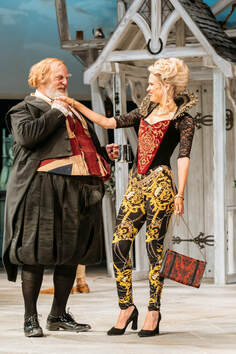 Very merry: David Troughton and Beth Cordingly. Photo by Manuel Harlan © RSC.
Very merry: David Troughton and Beth Cordingly. Photo by Manuel Harlan © RSC.
THE MERRY WIVES OF WINDSOR
* * *
August 14, 2018
RSC, Royal Shakespeare Theatre, Stratford-upon-Avon, until Saturday September 22, 2018
Fiona Laird’s modern-dress version transposes Windsor to Essex, with David Troughton starring as the fat knight Falstaff.
For Michael Davies’s full review, visit whatsonstage.com
* * *
August 14, 2018
RSC, Royal Shakespeare Theatre, Stratford-upon-Avon, until Saturday September 22, 2018
Fiona Laird’s modern-dress version transposes Windsor to Essex, with David Troughton starring as the fat knight Falstaff.
For Michael Davies’s full review, visit whatsonstage.com
THE WIZARD OF OZ
August 10, 2018
Tread the Boards Theatre Company, The Attic Theatre, Stratford-upon-Avon, until Monday, August 27, 2018
There can hardly be an adult alive today who does not know The Wizard of Oz inside out: thanks to perennial Christmas repetitions of the 1939 Judy Garland film, it’s pretty much in everybody’s DNA. Featuring the first major use of Technicolor, it is, of course, a colossal extravaganza of song, dance, special effects and big-budget spectacle.
Which might make you worry about the capabilities of a tiny production, performed by a cast of just seven in an intimate black-box studio theatre above a pub in Stratford-upon-Avon.
But if you think small scale means small ambition, then think again. Tread the Boards Theatre Company – fast approaching its tenth anniversary in the cosy Attic Theatre – manages to make this energetic, joyful production into something that is every bit as spectacular as its glossy predecessor.
Some of it they achieve by borrowing freely from the movie, including Dorothy’s signature song Over the Rainbow, large chunks of instantly recognisable dialogue and the gleeful cackle of the Wicked Witch of the West. But the rest is pure Tread the Boards, an effervescent mixture of idiosyncratic humour, knockabout silliness and, above all, crystal-clear storytelling.
This adaptation veers away from its film forebear in numerous narrative ways, including a number of wonderfully over-the-top character roles by Daniel Arbon, who spends half the time channelling Monty Python and the other half Robin Williams. In fact, he’d be in danger of stealing the show from Dorothy and her three travelling companions were it not for the fact that they are uniformly superb.
Matilda Bott is beautifully wide-eyed and innocent as the little girl blown by a tornado to faraway Oz, and her consistency and charm form a crucial linchpin to proceedings. Around her spin a trio of lovable, laughable turns in the shape of John-Robert Partridge’s deftly slapstick Scarecrow, Robert Moore’s endearingly empathetic Tin Man and James Tanton’s sweetly pathetic Lion. All three judge their performances to perfection, never stealing the limelight but creating a team that you constantly root for.
Ashleigh Dickinson is a delightful presence in her anchoring roles as Auntie Em and Glinda the Good Witch, while Alexandra Whitworth relishes every moment of her villainous doubling as Miss Gulch and the Wicked Witch of the West. But it’s the creativity and imagination of the overall production that ultimately lifts this Wizard of Oz into something rather special.
Whether it’s the brilliantly conceived Munchkins, the cleverly executed trickery of the Wizard himself or the hilariously tongue-in-cheek special effects, there’s never a moment when the audience isn’t in on the company’s joke: the constraints of the space and the limitations of budget are circumvented again and again with moments of near-genius that, far from minimising the dramatic effect, actually enhance it by the sheer audacity of their execution.
Director Partridge and his creative team certainly know how to use their resources to the max. And with a laugh squeezed out at every opportunity, there’s as much here to entertain the adults as the younger members of the audience. With just a couple of weeks left to run, until the August bank holiday weekend, this show comes highly recommended.
August 10, 2018
Tread the Boards Theatre Company, The Attic Theatre, Stratford-upon-Avon, until Monday, August 27, 2018
There can hardly be an adult alive today who does not know The Wizard of Oz inside out: thanks to perennial Christmas repetitions of the 1939 Judy Garland film, it’s pretty much in everybody’s DNA. Featuring the first major use of Technicolor, it is, of course, a colossal extravaganza of song, dance, special effects and big-budget spectacle.
Which might make you worry about the capabilities of a tiny production, performed by a cast of just seven in an intimate black-box studio theatre above a pub in Stratford-upon-Avon.
But if you think small scale means small ambition, then think again. Tread the Boards Theatre Company – fast approaching its tenth anniversary in the cosy Attic Theatre – manages to make this energetic, joyful production into something that is every bit as spectacular as its glossy predecessor.
Some of it they achieve by borrowing freely from the movie, including Dorothy’s signature song Over the Rainbow, large chunks of instantly recognisable dialogue and the gleeful cackle of the Wicked Witch of the West. But the rest is pure Tread the Boards, an effervescent mixture of idiosyncratic humour, knockabout silliness and, above all, crystal-clear storytelling.
This adaptation veers away from its film forebear in numerous narrative ways, including a number of wonderfully over-the-top character roles by Daniel Arbon, who spends half the time channelling Monty Python and the other half Robin Williams. In fact, he’d be in danger of stealing the show from Dorothy and her three travelling companions were it not for the fact that they are uniformly superb.
Matilda Bott is beautifully wide-eyed and innocent as the little girl blown by a tornado to faraway Oz, and her consistency and charm form a crucial linchpin to proceedings. Around her spin a trio of lovable, laughable turns in the shape of John-Robert Partridge’s deftly slapstick Scarecrow, Robert Moore’s endearingly empathetic Tin Man and James Tanton’s sweetly pathetic Lion. All three judge their performances to perfection, never stealing the limelight but creating a team that you constantly root for.
Ashleigh Dickinson is a delightful presence in her anchoring roles as Auntie Em and Glinda the Good Witch, while Alexandra Whitworth relishes every moment of her villainous doubling as Miss Gulch and the Wicked Witch of the West. But it’s the creativity and imagination of the overall production that ultimately lifts this Wizard of Oz into something rather special.
Whether it’s the brilliantly conceived Munchkins, the cleverly executed trickery of the Wizard himself or the hilariously tongue-in-cheek special effects, there’s never a moment when the audience isn’t in on the company’s joke: the constraints of the space and the limitations of budget are circumvented again and again with moments of near-genius that, far from minimising the dramatic effect, actually enhance it by the sheer audacity of their execution.
Director Partridge and his creative team certainly know how to use their resources to the max. And with a laugh squeezed out at every opportunity, there’s as much here to entertain the adults as the younger members of the audience. With just a couple of weeks left to run, until the August bank holiday weekend, this show comes highly recommended.
 Peter Hamilton Dyer as the newspaper editor in #WeAreArrested. Photo by Ellie Merridale.
Peter Hamilton Dyer as the newspaper editor in #WeAreArrested. Photo by Ellie Merridale.
MISCHIEF FESTIVAL
* * * *
June 6, 2018
RSC, The Other Place, Stratford-upon-Avon, until Saturday, June 23, 2018
There’s a dictum frequently trotted out to dramatists that they derive their greatest potency if they “show, don’t tell”. By a strange quirk of programming – and writing, come to that – the current double bill offered in the round under the RSC’s annual Mischief Festival banner demonstrates the exact opposite.
Day of the Living is a devised piece based around the unsolved disappearance in 2014 of 43 student teachers from a Mexican college. It could be said to suffer from the devisers’ curse: too many ideas and not enough restraint. While the underlying factual narrative is, of course, horrifying and an entirely appropriate topic for a festival aimed at unsettling the received wisdom, its execution in this ramshackle, half-formed way does little either to educate those of us who are ignorant of the details or to shine a spotlight on “life and the Mexican spirit”, as the programme optimistically puts it.
Instead we get every in-vogue theatrical device, from verbatim survivor testimony and masks to pastiche Mariachi music and slow-motion re-enactments, with some Mexican history, wrestling and a song about turtles thrown in along the way. It’s vivid, brash and confusing, but the hotch-potch of chaotic ideas ends up being counterproductive to its central theme of endemic corruption.
By contrast, #WeAreArrested is a model of subtlety and nuance, and all the more powerful because of it. Up first in the double bill, it is by far the more effective and affecting of the pair. It’s essentially a 75-minute monologue telling the story, in his own largely dispassionate words, of the Turkish newspaper editor Can Dundar’s road to exile.
Intelligently curated by director Sophie Ivatts and RSC literary manager Pippa Hill, and enhanced by a handful of magical stage effects, Dundar’s words are delivered impeccably by Peter Hamilton Dyer as a completely credible journalist juggling personal priorities with professional integrity. Occasionally other figures pop up – his wife, his son, his boss – for a few brief interactions, but the play is a formidable tour de force for Dyer, and his neutral, reportage style of delivery is beautifully judged to accentuate the nightmare story that is unfolding. When he does finally allow his emotions to erupt, it’s electrifying.
The debate about truth, facts and fake news could hardly be more apposite, and #WeAreArrested explores these ideas from a journalist’s perspective. What it also does, with well-judged elegance, is make them work dramatically as well. It’s deeply moving and intellectually potent.
* * * *
June 6, 2018
RSC, The Other Place, Stratford-upon-Avon, until Saturday, June 23, 2018
There’s a dictum frequently trotted out to dramatists that they derive their greatest potency if they “show, don’t tell”. By a strange quirk of programming – and writing, come to that – the current double bill offered in the round under the RSC’s annual Mischief Festival banner demonstrates the exact opposite.
Day of the Living is a devised piece based around the unsolved disappearance in 2014 of 43 student teachers from a Mexican college. It could be said to suffer from the devisers’ curse: too many ideas and not enough restraint. While the underlying factual narrative is, of course, horrifying and an entirely appropriate topic for a festival aimed at unsettling the received wisdom, its execution in this ramshackle, half-formed way does little either to educate those of us who are ignorant of the details or to shine a spotlight on “life and the Mexican spirit”, as the programme optimistically puts it.
Instead we get every in-vogue theatrical device, from verbatim survivor testimony and masks to pastiche Mariachi music and slow-motion re-enactments, with some Mexican history, wrestling and a song about turtles thrown in along the way. It’s vivid, brash and confusing, but the hotch-potch of chaotic ideas ends up being counterproductive to its central theme of endemic corruption.
By contrast, #WeAreArrested is a model of subtlety and nuance, and all the more powerful because of it. Up first in the double bill, it is by far the more effective and affecting of the pair. It’s essentially a 75-minute monologue telling the story, in his own largely dispassionate words, of the Turkish newspaper editor Can Dundar’s road to exile.
Intelligently curated by director Sophie Ivatts and RSC literary manager Pippa Hill, and enhanced by a handful of magical stage effects, Dundar’s words are delivered impeccably by Peter Hamilton Dyer as a completely credible journalist juggling personal priorities with professional integrity. Occasionally other figures pop up – his wife, his son, his boss – for a few brief interactions, but the play is a formidable tour de force for Dyer, and his neutral, reportage style of delivery is beautifully judged to accentuate the nightmare story that is unfolding. When he does finally allow his emotions to erupt, it’s electrifying.
The debate about truth, facts and fake news could hardly be more apposite, and #WeAreArrested explores these ideas from a journalist’s perspective. What it also does, with well-judged elegance, is make them work dramatically as well. It’s deeply moving and intellectually potent.
ROMEO AND JULIET
* * * *
May 1, 2018
RSC, Royal Shakespeare Theatre, Stratford-upon-Avon, until Friday, September 21, 2018
Erica Wyman directs a youthful and energetic interpretation of Shakespeare’s tragic love story.
For Michael Davies’s full review, visit whatsonstage.com
* * * *
May 1, 2018
RSC, Royal Shakespeare Theatre, Stratford-upon-Avon, until Friday, September 21, 2018
Erica Wyman directs a youthful and energetic interpretation of Shakespeare’s tragic love story.
For Michael Davies’s full review, visit whatsonstage.com
RICHARD III
April 5, 2018
Tread the Boards Theatre Company, The Attic Theatre, Stratford-upon-Avon, until Sunday, April 22, 2018
The tradition of actor-manager may have died out in most of our mainstream theatres, but it seems the template is alive and well and delivering quality work on the Stratford fringe.
Tread the Boards Theatre Company, established in 2009, has spent most of the last decade building its reputation as the area’s leading fringe company under the management of husband-and-wife producer and director Catherine Prout and John-Robert Partridge. Partridge offered a fine Henry V last year - it’s his company, so why not? - and now takes centre stage again in a clear, comprehensible production of the Bard’s most villainous history, Richard III.
But it would be wrong to portray Tread the Boards as some kind of vanity project, putting on shows just so its leading man can play the best parts. Make no mistake about it: Partridge is up to the job. His Henry was statesmanlike and rousing, his Richard is equally persuasive, only this time in the opposite direction. With a deformity that is convincing without being over-the-top, he utters some of Shakespeare’s most recognisable lines with a freshness that catches you by surprise. There’s a scheming twinkle in his eye and his ultimate downfall from despotism is marked by a raging passion that fills the tiny studio space of The Attic Theatre in Cox’s Yard.
Director Jonathan Legg is constantly always aware of sightlines and visual variety, keeping actors and action moving whenever possible, but even running at more than three hours (and yes, it could probably stand some cutting), interest rarely flags.
Much of this is due to the hard work of the 13-strong ensemble cast, rendering this Richard as more than a one-man turn. Among the impressive support, David Hubball makes a poignant Clarence, murdered by his brother Richard for reasons he clearly cannot begin to fathom. Kate Gee-Finch and Matilda Bott are both moving as two of the many queens wronged by the usurper, and it’s good to see students from Stratford College doing more than simply making up the numbers as they are given valuable professional experience with a local company.
Playing in repertory with the group’s other spring Shakespeare, A Midsummer Night’s Dream, this Richard is strong and effective, even if it seems to be a harder sell on paper than its comedy partner.
Richard III and A Midsummer Night’s Dream run until Sunday, April 22, 2018.
April 5, 2018
Tread the Boards Theatre Company, The Attic Theatre, Stratford-upon-Avon, until Sunday, April 22, 2018
The tradition of actor-manager may have died out in most of our mainstream theatres, but it seems the template is alive and well and delivering quality work on the Stratford fringe.
Tread the Boards Theatre Company, established in 2009, has spent most of the last decade building its reputation as the area’s leading fringe company under the management of husband-and-wife producer and director Catherine Prout and John-Robert Partridge. Partridge offered a fine Henry V last year - it’s his company, so why not? - and now takes centre stage again in a clear, comprehensible production of the Bard’s most villainous history, Richard III.
But it would be wrong to portray Tread the Boards as some kind of vanity project, putting on shows just so its leading man can play the best parts. Make no mistake about it: Partridge is up to the job. His Henry was statesmanlike and rousing, his Richard is equally persuasive, only this time in the opposite direction. With a deformity that is convincing without being over-the-top, he utters some of Shakespeare’s most recognisable lines with a freshness that catches you by surprise. There’s a scheming twinkle in his eye and his ultimate downfall from despotism is marked by a raging passion that fills the tiny studio space of The Attic Theatre in Cox’s Yard.
Director Jonathan Legg is constantly always aware of sightlines and visual variety, keeping actors and action moving whenever possible, but even running at more than three hours (and yes, it could probably stand some cutting), interest rarely flags.
Much of this is due to the hard work of the 13-strong ensemble cast, rendering this Richard as more than a one-man turn. Among the impressive support, David Hubball makes a poignant Clarence, murdered by his brother Richard for reasons he clearly cannot begin to fathom. Kate Gee-Finch and Matilda Bott are both moving as two of the many queens wronged by the usurper, and it’s good to see students from Stratford College doing more than simply making up the numbers as they are given valuable professional experience with a local company.
Playing in repertory with the group’s other spring Shakespeare, A Midsummer Night’s Dream, this Richard is strong and effective, even if it seems to be a harder sell on paper than its comedy partner.
Richard III and A Midsummer Night’s Dream run until Sunday, April 22, 2018.
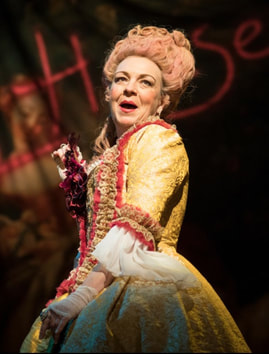 Sophie Stanton as Mrs Rich. Photo by Helen Maybanks © RSC.
Sophie Stanton as Mrs Rich. Photo by Helen Maybanks © RSC.
THE FANTASTIC FOLLIES OF MRS RICH
* * *
April 3, 2018
RSC, Swan Theatre, Stratford-upon-Avon, until Friday, August 3, 2018
Sophie Stanton entertains as social climber Mrs Rich in this obscure satire dusted off by Jo Davies.
For Michael Davies’s full review, visit whatsonstage.com
* * *
April 3, 2018
RSC, Swan Theatre, Stratford-upon-Avon, until Friday, August 3, 2018
Sophie Stanton entertains as social climber Mrs Rich in this obscure satire dusted off by Jo Davies.
For Michael Davies’s full review, visit whatsonstage.com
A MIDSUMMER NIGHT’S DREAM
March 31, 2018
Tread the Boards Theatre Company, The Attic Theatre, Stratford-upon-Avon, until Sunday, April 22, 2018
While the RSC’s current fare across Bancroft Gardens offers blood by the bucketload in the shape of Macbeth and The Duchess of Malfi, Stratford’s leading fringe company Tread the Boards has taken the nifty programming decision to go for something far more family-friendly.
It may not be very springlike in name, but A Midsummer Night’s Dream certainly resembles an April daffodil: bright, fresh and pleasing to the eye. In the intimate, close-quartered environment of The Attic Theatre at Cox’s Yard, it engages and entertains in equal measure and delights audiences from young children to those of us of a more mature vintage.
Directed by the company’s artistic director John-Robert Partridge, this version is neatly filleted to an hour or so each way, which keeps the momentum tumbling along, and the sense of fun is palpable throughout, whether it’s the sparring between childhood friends-turned-rivals Hermia (Matilda Bott) and Helena (Kate Gee-Finch) or the daft antics of the Rude Mechanicals, here played as a mixture of stereotypical amateur theatrical types to great effect.
Edward Manning’s Bottom (if you’ll pardon the expression) is all melodramatic bluster, while Robert Moore mines twice the comic magic from his doubling of Athenian romeo Lysander and hilarious car mechanic Flute - looking far too comfortable in high heels and a frock.
There are some nice touches of humour, from the poor beleaguered stage manager to the doddering old tea lady, and every opportunity for laughs is eagerly seized. And while this might not make for the most subtle of interpretations of the Bard’s most popular play, there’s no denying it’s charming, intimate and full of fun.
A Midsummer Night’s Dream plays in repertory with Richard III until Sunday, April 22, 2018.
March 31, 2018
Tread the Boards Theatre Company, The Attic Theatre, Stratford-upon-Avon, until Sunday, April 22, 2018
While the RSC’s current fare across Bancroft Gardens offers blood by the bucketload in the shape of Macbeth and The Duchess of Malfi, Stratford’s leading fringe company Tread the Boards has taken the nifty programming decision to go for something far more family-friendly.
It may not be very springlike in name, but A Midsummer Night’s Dream certainly resembles an April daffodil: bright, fresh and pleasing to the eye. In the intimate, close-quartered environment of The Attic Theatre at Cox’s Yard, it engages and entertains in equal measure and delights audiences from young children to those of us of a more mature vintage.
Directed by the company’s artistic director John-Robert Partridge, this version is neatly filleted to an hour or so each way, which keeps the momentum tumbling along, and the sense of fun is palpable throughout, whether it’s the sparring between childhood friends-turned-rivals Hermia (Matilda Bott) and Helena (Kate Gee-Finch) or the daft antics of the Rude Mechanicals, here played as a mixture of stereotypical amateur theatrical types to great effect.
Edward Manning’s Bottom (if you’ll pardon the expression) is all melodramatic bluster, while Robert Moore mines twice the comic magic from his doubling of Athenian romeo Lysander and hilarious car mechanic Flute - looking far too comfortable in high heels and a frock.
There are some nice touches of humour, from the poor beleaguered stage manager to the doddering old tea lady, and every opportunity for laughs is eagerly seized. And while this might not make for the most subtle of interpretations of the Bard’s most popular play, there’s no denying it’s charming, intimate and full of fun.
A Midsummer Night’s Dream plays in repertory with Richard III until Sunday, April 22, 2018.
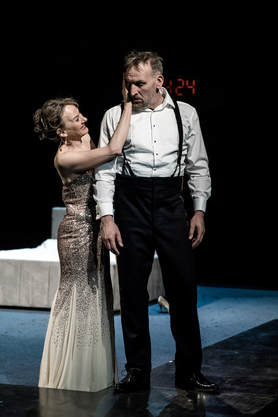 Niamh Cusack and Christopher Eccleston as the Macbeths. Photo by Richard Davenport © RSC.
Niamh Cusack and Christopher Eccleston as the Macbeths. Photo by Richard Davenport © RSC.
MACBETH
* * *
March 23, 2018
RSC, Royal Shakespeare Theatre, Stratford-upon-Avon, until Tuesday, September 18, 2018
There’s a note in the programme of this new production of Shakespeare’s tautest thriller that makes explicit the link between Macbeth and modern horror films. Director Polly Findlay is clearly a fan of the genre. So we get many references – some subtle, many far less so – to the movies, from freeze-frame blackouts to jump-cut edits, all in the name of creating suspense, tension and those all-important thrills.
The bad news is that much of this conceptualising is superfluous at best, positively damaging to Shakespeare’s drama at worst. The good news is that the RSC won’t give a damn what I or any other critics think as the Stratford run is pretty much sold out. And quite right too: casting Christopher Eccleston and Niamh Cusack as the despicable double-act in this most accessible of tragedies deserves a decent audience response.
So leaving aside the popular appeal of the production, kicking off a new season for the company with some fresh graphics and a full slate of female directors, it’s still pertinent to ask: is it any good?
Well, to be honest, it’s something of a mixed bag. It looks great, crisply and cleanly designed by Fly Davis with a modern aesthetic (although that does prompt awkward questions such as why does nobody have a gun for a weapon, or carry a mobile phone?). Fine Shakespearean performances from the likes of Edward Bennett as the far too sidelined Macduff or Tim Samuels as a chilling Lennox make one suspect they may have wandered in from a different production altogether. And Rupert Cross’s visceral, aggressive soundscape helps set the mood in a brutal kind of way.
On the down side, some heavy-handed dramaturgy hacks the Bard’s text about with no compunction and not much compassion, distributing lines to all and sundry, turning the comedic Porter into a devilish, oily omnipresence in the hands of Michael Hodgson, and rendering the witches as cute onesie-clad kids reciting their spells in childish monotone and thus robbing them of any menace.
And here lies the crux of the problem for me. Ostensibly a claustrophobic, driven thriller shot through with tension and inevitability, Findlay’s Macbeth becomes strangely pedestrian and plodding, in spite of all the devices she throws at it in an attempt to make it urgent. There’s plenty of splicing between scenes, chopping up speeches and even a ticking on-stage clock that counts down two hours to Macbeth’s moment of truth. But somehow they all fail to reinforce the text’s inherent sense of time rushing headlong out of Maccy B’s control.
Cusack fares better than Eccleston in the roles at the heart of the play. She’s given some fabulous frocks and sensational shoes to wear, and she manages to imbue Lady M with a sense of fragility alongside the outward bravura. Eccleston, meanwhile, never feels quite secure in the lines or the role, and while this might add a certain feeling of tension, it’s tension of the wrong kind: instead of being dragged gleefully towards Macbeth’s psychological collapse, the only true edge-of-the-seat moments are when you wonder who it is who’s actually missed their cue or fluffed a line.
It’s one version of Macbeth, even if it’s not quite the one that Will originally created. And while that’s fine for the GCSE syllabus students who can analyse the production at their leisure, it does make for something of a disappointment for those of us who love the play what he wrote.
* * *
March 23, 2018
RSC, Royal Shakespeare Theatre, Stratford-upon-Avon, until Tuesday, September 18, 2018
There’s a note in the programme of this new production of Shakespeare’s tautest thriller that makes explicit the link between Macbeth and modern horror films. Director Polly Findlay is clearly a fan of the genre. So we get many references – some subtle, many far less so – to the movies, from freeze-frame blackouts to jump-cut edits, all in the name of creating suspense, tension and those all-important thrills.
The bad news is that much of this conceptualising is superfluous at best, positively damaging to Shakespeare’s drama at worst. The good news is that the RSC won’t give a damn what I or any other critics think as the Stratford run is pretty much sold out. And quite right too: casting Christopher Eccleston and Niamh Cusack as the despicable double-act in this most accessible of tragedies deserves a decent audience response.
So leaving aside the popular appeal of the production, kicking off a new season for the company with some fresh graphics and a full slate of female directors, it’s still pertinent to ask: is it any good?
Well, to be honest, it’s something of a mixed bag. It looks great, crisply and cleanly designed by Fly Davis with a modern aesthetic (although that does prompt awkward questions such as why does nobody have a gun for a weapon, or carry a mobile phone?). Fine Shakespearean performances from the likes of Edward Bennett as the far too sidelined Macduff or Tim Samuels as a chilling Lennox make one suspect they may have wandered in from a different production altogether. And Rupert Cross’s visceral, aggressive soundscape helps set the mood in a brutal kind of way.
On the down side, some heavy-handed dramaturgy hacks the Bard’s text about with no compunction and not much compassion, distributing lines to all and sundry, turning the comedic Porter into a devilish, oily omnipresence in the hands of Michael Hodgson, and rendering the witches as cute onesie-clad kids reciting their spells in childish monotone and thus robbing them of any menace.
And here lies the crux of the problem for me. Ostensibly a claustrophobic, driven thriller shot through with tension and inevitability, Findlay’s Macbeth becomes strangely pedestrian and plodding, in spite of all the devices she throws at it in an attempt to make it urgent. There’s plenty of splicing between scenes, chopping up speeches and even a ticking on-stage clock that counts down two hours to Macbeth’s moment of truth. But somehow they all fail to reinforce the text’s inherent sense of time rushing headlong out of Maccy B’s control.
Cusack fares better than Eccleston in the roles at the heart of the play. She’s given some fabulous frocks and sensational shoes to wear, and she manages to imbue Lady M with a sense of fragility alongside the outward bravura. Eccleston, meanwhile, never feels quite secure in the lines or the role, and while this might add a certain feeling of tension, it’s tension of the wrong kind: instead of being dragged gleefully towards Macbeth’s psychological collapse, the only true edge-of-the-seat moments are when you wonder who it is who’s actually missed their cue or fluffed a line.
It’s one version of Macbeth, even if it’s not quite the one that Will originally created. And while that’s fine for the GCSE syllabus students who can analyse the production at their leisure, it does make for something of a disappointment for those of us who love the play what he wrote.
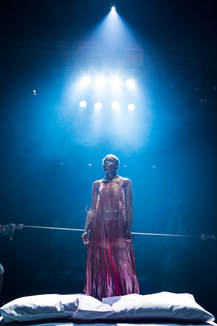 Bloodbath: Joan Iyiola in the title role of The Duchess of Malfi. Photo by Helen Maybanks © RSC.
Bloodbath: Joan Iyiola in the title role of The Duchess of Malfi. Photo by Helen Maybanks © RSC.
THE DUCHESS OF MALFI
* *
March 8, 2018
RSC, Swan Theatre, Stratford-upon-Avon, until Friday, August 3, 2018
Webster’s violent tale of two brothers’ revenge on their sister is given an unsubtle bloodbath interpretation by director Maria Aberg.
For Michael Davies’s full review, visit whatsonstage.com
* *
March 8, 2018
RSC, Swan Theatre, Stratford-upon-Avon, until Friday, August 3, 2018
Webster’s violent tale of two brothers’ revenge on their sister is given an unsubtle bloodbath interpretation by director Maria Aberg.
For Michael Davies’s full review, visit whatsonstage.com
IMPERIUM, Parts I and II
* * * * *
December 7, 2017
RSC, Swan Theatre, Stratford-upon-Avon, until Saturday, February 10, 2018
A stunning adaptation by Mike Poulton of the Cicero trilogy by Robert Harris, brought vividly to the stage by RSC artistic director Gregory Doran, and featuring a central double act of epic proportions from Richard McCabe and Joseph Kloska.
For Michael Davies’s full review, visit whatsonstage.com
* * * * *
December 7, 2017
RSC, Swan Theatre, Stratford-upon-Avon, until Saturday, February 10, 2018
A stunning adaptation by Mike Poulton of the Cicero trilogy by Robert Harris, brought vividly to the stage by RSC artistic director Gregory Doran, and featuring a central double act of epic proportions from Richard McCabe and Joseph Kloska.
For Michael Davies’s full review, visit whatsonstage.com
A CHRISTMAS CAROL
* * * *
December 6, 2017
RSC, Royal Shakespeare Theatre, Stratford-upon-Avon, until Sunday, February 4, 2018
David Edgar’s new adaptation of the Dickens classic stars Phil Davis as Scrooge in a production full of political resonance.
For Michael Davies’s full review, visit whatsonstage.com
* * * *
December 6, 2017
RSC, Royal Shakespeare Theatre, Stratford-upon-Avon, until Sunday, February 4, 2018
David Edgar’s new adaptation of the Dickens classic stars Phil Davis as Scrooge in a production full of political resonance.
For Michael Davies’s full review, visit whatsonstage.com
 Adrian Edmondson in full flow as Malvolio in Twelfth Night. Photo by Manuel Harlan. © RSC.
Adrian Edmondson in full flow as Malvolio in Twelfth Night. Photo by Manuel Harlan. © RSC.
TWELFTH NIGHT
* * *
November 10, 2017
RSC, Royal Shakespeare Theatre, Stratford-upon-Avon, until Saturday, February 24, 2018
The recent Judi Dench film Victoria and Abdul told the true story of the queen’s fascination and friendship in her later years with an Indian servant who became her ‘munshi’, or adviser. Christopher Luscombe’s new production of Twelfth Night for the RSC uses the same basic idea to build a Raj-infused, late-Victorian version of Shakespeare’s frothy comedy.
It’s a conceit that works well enough, although there isn’t quite the same sense of infectious vigour as in his double bill of Love’s Labour’s Lost and Much Ado About Nothing a few years back. What it shares with those memorable productions is a stunning look and a pervasive charm.
Simon Higlett’s gorgeous design gives us greenhouses, great halls and artists’ boudoirs with all the handsome panache of the era. Lighting designer Tim Mitchell shows them all off to beautiful advantage. Aurally, it’s a feast as well, with Nigel Hess’s pastiche score of Gilbert and Sullivan and music hall ditties giving a fresh take on one of the Bard’s more musical scripts.
Among the performances, Kara Tointon as the grieving countess Olivia fulfils the Victoria role stylishly, with a crystalline elegance and delivery. The munshi in this scenario is her fool, Feste, played simply and without unnecessary fireworks by Beruce Khan.
John Hodgkinson and Michael Cochrane make a fine, if rather elderly, double act as Sir Toby Belch and Sir Andrew Aguecheek, while Vivien Parry and Sarah Twomey relish their moments as below-stairs servants who turn the tables on their churlish superior, the steward Malvolio.
In this crucial role, alternative comedian and erstwhile Young One Adrian Edmondson reveals himself as a rather capable actor when he doesn’t have comedy violence to fall back on. Instead of the angry, dim-witted personae of former years, he has a nice line in understated pompous bombast and an affecting pathos when he’s gulled into his downfall.
He’s also given a comic song which raises plenty of laughs but sits rather uncomfortably with the flow of the show. Indeed, the overall tone of the production often feels strangely at odds with the tenor of Shakespeare’s bittersweet, almost melancholic piece and there is, for me, an over-reliance on visual gags and an over-insistence on the Victorian setting in everything from steam trains to pre-Raphaelite painting.
But it’s undoubtedly a crowd-pleaser and, with tickets shifting for the festive season, will do well for the company. It’s a sound, solid, entertaining rendition of a perennial favourite.
* * *
November 10, 2017
RSC, Royal Shakespeare Theatre, Stratford-upon-Avon, until Saturday, February 24, 2018
The recent Judi Dench film Victoria and Abdul told the true story of the queen’s fascination and friendship in her later years with an Indian servant who became her ‘munshi’, or adviser. Christopher Luscombe’s new production of Twelfth Night for the RSC uses the same basic idea to build a Raj-infused, late-Victorian version of Shakespeare’s frothy comedy.
It’s a conceit that works well enough, although there isn’t quite the same sense of infectious vigour as in his double bill of Love’s Labour’s Lost and Much Ado About Nothing a few years back. What it shares with those memorable productions is a stunning look and a pervasive charm.
Simon Higlett’s gorgeous design gives us greenhouses, great halls and artists’ boudoirs with all the handsome panache of the era. Lighting designer Tim Mitchell shows them all off to beautiful advantage. Aurally, it’s a feast as well, with Nigel Hess’s pastiche score of Gilbert and Sullivan and music hall ditties giving a fresh take on one of the Bard’s more musical scripts.
Among the performances, Kara Tointon as the grieving countess Olivia fulfils the Victoria role stylishly, with a crystalline elegance and delivery. The munshi in this scenario is her fool, Feste, played simply and without unnecessary fireworks by Beruce Khan.
John Hodgkinson and Michael Cochrane make a fine, if rather elderly, double act as Sir Toby Belch and Sir Andrew Aguecheek, while Vivien Parry and Sarah Twomey relish their moments as below-stairs servants who turn the tables on their churlish superior, the steward Malvolio.
In this crucial role, alternative comedian and erstwhile Young One Adrian Edmondson reveals himself as a rather capable actor when he doesn’t have comedy violence to fall back on. Instead of the angry, dim-witted personae of former years, he has a nice line in understated pompous bombast and an affecting pathos when he’s gulled into his downfall.
He’s also given a comic song which raises plenty of laughs but sits rather uncomfortably with the flow of the show. Indeed, the overall tone of the production often feels strangely at odds with the tenor of Shakespeare’s bittersweet, almost melancholic piece and there is, for me, an over-reliance on visual gags and an over-insistence on the Victorian setting in everything from steam trains to pre-Raphaelite painting.
But it’s undoubtedly a crowd-pleaser and, with tickets shifting for the festive season, will do well for the company. It’s a sound, solid, entertaining rendition of a perennial favourite.
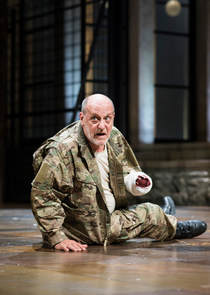 Powerful: David Troughton as Titus Andronicus. Photo by Helen Maybanks. © RSC
Powerful: David Troughton as Titus Andronicus. Photo by Helen Maybanks. © RSC
TITUS ANDRONICUS
* * * *
July 4, 2017
RSC, Royal Shakespeare Theatre, Stratford-upon-Avon, until Saturday, September 2, 2017, then transfers to The Barbican from December 7, 2017, to January 19, 2018
Blanche McIntyre directs David Troughton in the title role of Shakespeare’s gory early play, finding powerful contemporary resonances in her modern-day production.
For Michael Davies’s full review visit whatsonstage.com
* * * *
July 4, 2017
RSC, Royal Shakespeare Theatre, Stratford-upon-Avon, until Saturday, September 2, 2017, then transfers to The Barbican from December 7, 2017, to January 19, 2018
Blanche McIntyre directs David Troughton in the title role of Shakespeare’s gory early play, finding powerful contemporary resonances in her modern-day production.
For Michael Davies’s full review visit whatsonstage.com
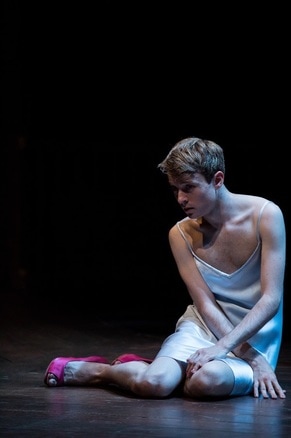 Boy plays girl: Matthew Tennyson as Salome. Photo by Isaac James. © RSC
Boy plays girl: Matthew Tennyson as Salome. Photo by Isaac James. © RSC
SALOME
* * *
June 23, 2017
RSC, Swan Theatre, Stratford-upon-Avon, until Wednesday, September 6, 2017
The whole premise of this production of Oscar Wilde’s strangest play is apparently predicated on celebrating the fiftieth anniversary of the decriminalisation of homosexuality. So director Owen Horsley makes a point of linking the two explicitly in the programme, examining Wilde’s own sexuality and reinforcing the notion with the cross-gender casting of Matthew Tennyson in the title role.
Tennyson struts the stage in a plain white nightie and shocking pink stilettos, his voice ranging from virtuosic falsetto to strangled estuary vowels. He’s sometimes majestic, occasionally awkward. Never was it clear to me why he is a boy playing a girl. There seems to be absolutely no exploration of alternate text readings, no playing with gender fluidity, no subtle – or blatant – reimagining of Wilde’s meaning and intent.
To say this is a wasted opportunity is something of an understatement. Wilde’s strikingly poetic language, his use of simile and metaphor, his rhythmic determination of narrative through layered and textured dialogue all cry out for a radical, even impressionistic treatment.
And sometimes we get it. Matthew Pidgeon’s wild-eyed Herod, juiced up on Roman wine and lasciviousness, is a thoroughly dramatic creation, a weak man vaulted into an unearned position of power who’s just ripe for exploitation at the hands of his devious young stepdaughter. Gavin Fowler’s representation of Iokanaan – John the Baptist, as he is known in the biblical version of the tale – has moments of high-flown lyricism to match the lines.
Designer Bretta Gerecke and her lightning partner Kristina Hjelm generate an atmosphere of lush dissolution, the strong but under-used ensemble are all on board with the concept of decaying hedonism, and there are glimpses of haunting beauty.
But there are also deep inconsistencies of style and approach which badly undermine the overall effect, not least in the ill-matched music of American songwriter Perfume Genius – real name Mike Hadreas. The lyrics of the two sub-1980s stadium rock anthems that are featured not only are impossible to discern but, even with the aid of the words in the programme, add absolutely nothing to the storytelling. Worse than that, they actually get in the way in a really big, loud and unhelpful manner.
The delivery of some of the lines is patchy, too. It’s as if there’s been no clear direction about whether to go with the Wildean flights of exoticism or simply play it natural. Unfortunately, natural just doesn’t work in this context.
It’s not a disaster by any means, and it’s an important historical landmark to see Wilde performed on an RSC stage for the first time. Seven out of ten for effort, five for execution.
* * *
June 23, 2017
RSC, Swan Theatre, Stratford-upon-Avon, until Wednesday, September 6, 2017
The whole premise of this production of Oscar Wilde’s strangest play is apparently predicated on celebrating the fiftieth anniversary of the decriminalisation of homosexuality. So director Owen Horsley makes a point of linking the two explicitly in the programme, examining Wilde’s own sexuality and reinforcing the notion with the cross-gender casting of Matthew Tennyson in the title role.
Tennyson struts the stage in a plain white nightie and shocking pink stilettos, his voice ranging from virtuosic falsetto to strangled estuary vowels. He’s sometimes majestic, occasionally awkward. Never was it clear to me why he is a boy playing a girl. There seems to be absolutely no exploration of alternate text readings, no playing with gender fluidity, no subtle – or blatant – reimagining of Wilde’s meaning and intent.
To say this is a wasted opportunity is something of an understatement. Wilde’s strikingly poetic language, his use of simile and metaphor, his rhythmic determination of narrative through layered and textured dialogue all cry out for a radical, even impressionistic treatment.
And sometimes we get it. Matthew Pidgeon’s wild-eyed Herod, juiced up on Roman wine and lasciviousness, is a thoroughly dramatic creation, a weak man vaulted into an unearned position of power who’s just ripe for exploitation at the hands of his devious young stepdaughter. Gavin Fowler’s representation of Iokanaan – John the Baptist, as he is known in the biblical version of the tale – has moments of high-flown lyricism to match the lines.
Designer Bretta Gerecke and her lightning partner Kristina Hjelm generate an atmosphere of lush dissolution, the strong but under-used ensemble are all on board with the concept of decaying hedonism, and there are glimpses of haunting beauty.
But there are also deep inconsistencies of style and approach which badly undermine the overall effect, not least in the ill-matched music of American songwriter Perfume Genius – real name Mike Hadreas. The lyrics of the two sub-1980s stadium rock anthems that are featured not only are impossible to discern but, even with the aid of the words in the programme, add absolutely nothing to the storytelling. Worse than that, they actually get in the way in a really big, loud and unhelpful manner.
The delivery of some of the lines is patchy, too. It’s as if there’s been no clear direction about whether to go with the Wildean flights of exoticism or simply play it natural. Unfortunately, natural just doesn’t work in this context.
It’s not a disaster by any means, and it’s an important historical landmark to see Wilde performed on an RSC stage for the first time. Seven out of ten for effort, five for execution.
VICE VERSA
* * * *
May 18, 2017
RSC, The Swan Theatre, Stratford-upon-Avon, until Saturday, September 9, 2017
The plays of Plautus get a modern updating from Phil Porter, with more than a hint of Up Pompeii about the broad comedy.
For Michael Davies’s full review, visit www.whatsonstage.com
* * * *
May 18, 2017
RSC, The Swan Theatre, Stratford-upon-Avon, until Saturday, September 9, 2017
The plays of Plautus get a modern updating from Phil Porter, with more than a hint of Up Pompeii about the broad comedy.
For Michael Davies’s full review, visit www.whatsonstage.com
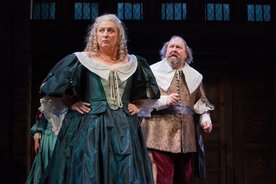 Northern humour: Caroline Quentin and Mark Addy as Lady Sarah and Sir John Hotham. Photo by Pete Le May. © RSC
Northern humour: Caroline Quentin and Mark Addy as Lady Sarah and Sir John Hotham. Photo by Pete Le May. © RSC
THE HYPOCRITE
* * *
April 7, 2017
RSC, The Swan Theatre, Stratford-upon-Avon, until Saturday, April 29, 2017
Based on the true(ish) story of Yorkshire’s biggest landowner and his vacillations between Royalists and Parliamentarians at the beginning of the English Civil War, The Hypocrite is a new comedy commissioned jointly from One Man, Two Guv’nors author Richard Bean by the RSC and Hull Truck Theatre.
The fact that it has already played in Hull, the current UK City of Culture, is not insignificant as it has not only helped that city’s profile in this auspicious year, but it has also guaranteed a clutch of promising reviews and a warm reception from its initial outing oop north. It may sound harsh to say it, but I suspect the play means much more to a Hull audience than it does in middle-English Stratford-upon-Avon.
The reality is that much of its humour struggles to survive the 150-mile journey south. The multitude of local references might have brought the house down in the East Riding but too many of the native playwright Bean’s topical gags are lost in translation.
That’s not to say there isn’t much to enjoy about this knockabout, Pythonesque farce. Mark Addy in the title role is particularly entertaining, lurching between Roy Barraclough and Eric Morecambe in his cynical, comical characterisation of Sir John Hotham, a wealthy nobleman torn between loyalty to King Charles I and his new paymasters in Parliament.
Caroline Quentin delivers a wonderful turn as his fifth wife Lady Sarah, juggling wide-eyed avarice at the prospect of bags of cash against girlish lust as she pursues free love with her husband’s cousin. And there are some real gems among the supporting ensemble, including Asif Khan’s brilliantly overblown eldest son Captain Jack, Laura Esworthy as the worldly-wise servant girl Connie and the fiendishly acrobatic Danielle Bird as the wordless aged retainer, the aptly-named Drudge.
Bean’s comedy is broad, to say the least - there’s one gag involving the severing of a particularly tender piece of the male anatomy that has the audience grimacing - and owes much to the aforementioned Python. There are comedy foreign accents, unfathomably obtuse idiots and even horses portrayed by coconut shells, all of which bear the distinct whiff of someone brought up on The Holy Grail and latterly Spamalot.
Grant Olding supplies some anti-Establishment songs as scene-changing interludes, invoking a kind of 17th century Billy Bragg in the hands of talented guitarist-vocalist Josh Sneesby, while director Phillip Breen keeps the pace relentless and breathless.
It’s manically frenetic, immensely convoluted and could stand some robust editing. But it’s all silly and big-hearted enough to carry off the night with aplomb and some witty lines, even if it’s unlikely to go down as one the RSC’s greatest hits.
* * *
April 7, 2017
RSC, The Swan Theatre, Stratford-upon-Avon, until Saturday, April 29, 2017
Based on the true(ish) story of Yorkshire’s biggest landowner and his vacillations between Royalists and Parliamentarians at the beginning of the English Civil War, The Hypocrite is a new comedy commissioned jointly from One Man, Two Guv’nors author Richard Bean by the RSC and Hull Truck Theatre.
The fact that it has already played in Hull, the current UK City of Culture, is not insignificant as it has not only helped that city’s profile in this auspicious year, but it has also guaranteed a clutch of promising reviews and a warm reception from its initial outing oop north. It may sound harsh to say it, but I suspect the play means much more to a Hull audience than it does in middle-English Stratford-upon-Avon.
The reality is that much of its humour struggles to survive the 150-mile journey south. The multitude of local references might have brought the house down in the East Riding but too many of the native playwright Bean’s topical gags are lost in translation.
That’s not to say there isn’t much to enjoy about this knockabout, Pythonesque farce. Mark Addy in the title role is particularly entertaining, lurching between Roy Barraclough and Eric Morecambe in his cynical, comical characterisation of Sir John Hotham, a wealthy nobleman torn between loyalty to King Charles I and his new paymasters in Parliament.
Caroline Quentin delivers a wonderful turn as his fifth wife Lady Sarah, juggling wide-eyed avarice at the prospect of bags of cash against girlish lust as she pursues free love with her husband’s cousin. And there are some real gems among the supporting ensemble, including Asif Khan’s brilliantly overblown eldest son Captain Jack, Laura Esworthy as the worldly-wise servant girl Connie and the fiendishly acrobatic Danielle Bird as the wordless aged retainer, the aptly-named Drudge.
Bean’s comedy is broad, to say the least - there’s one gag involving the severing of a particularly tender piece of the male anatomy that has the audience grimacing - and owes much to the aforementioned Python. There are comedy foreign accents, unfathomably obtuse idiots and even horses portrayed by coconut shells, all of which bear the distinct whiff of someone brought up on The Holy Grail and latterly Spamalot.
Grant Olding supplies some anti-Establishment songs as scene-changing interludes, invoking a kind of 17th century Billy Bragg in the hands of talented guitarist-vocalist Josh Sneesby, while director Phillip Breen keeps the pace relentless and breathless.
It’s manically frenetic, immensely convoluted and could stand some robust editing. But it’s all silly and big-hearted enough to carry off the night with aplomb and some witty lines, even if it’s unlikely to go down as one the RSC’s greatest hits.
HENRY V
* * * *
March 31, 2017
Tread the Boards, The Attic Theatre, Stratford-upon-Avon, until Sunday April 23, 2017
It takes a brave man to produce one of Shakespeare’s most rousing plays almost literally in the shadow of the Royal Shakespeare Company building on the banks of the River Avon. Fortunately, Henry V is a brave man.
And behind the chain mail is another brave man, John-Robert Partridge, one of the founding fathers of the professional company Tread the Boards. In their regular home at The Attic, just across Bancroft Gardens from the RST, they are staging a patriotic production that runs until the Bard’s birthday on April 23.
There are many impressive things about the show. With an adult company of twelve, plus a child performer, it’s a fringe production on a scale that truly merits the adjective ambitious. It’s played out fast and furious in the awkwardly long and thin performance space, complete with terrifying battle scenes and plenty of breathtaking action. And, importantly, the quality of the acting reflects the commitment and backgrounds of the talented cast.
There are no weak links among the ensemble, evenly split between male and female with gender-blind casting that demonstrates how admirably it can work. So Dawn Bush gives us a motherly welcome as the down-to-earth Chorus, Ashleigh Dickinson makes an earnest and appealing French herald, and Dru Stephenson combines a touching Mistress Quickly and hilarious French lady-in-waiting with a well-drawn soldierly turn in the pre-battle English camp.
The whole cast double up effectively, with Edward Manning and James Tanton particularly versatile in their different roles, while David McCarthy threatens to steal the show with his wonderfully entertaining Welshman Fluellen. Steering clear of the temptation to play it simply for laughs, he finds honour and truth in what is often played as a knockabout comedy routine.
Captaining the ship, both as director and leading man, is Partridge himself, offering a noble and stoic Henry and delivering some of Shakespeare’s grandest speeches with clarity and authority. Indeed, clarity is one of the themes of the production, with the storytelling always encouragingly at the fore, even if some of the poetry is lost along the way.
Staged on a shoestring, the performance still manages to look imposing and well-dressed, and makes a virtue out of the Chorus’s repeated invitations to use our imaginations to fill in the blanks. It’s easy to picture Shakespeare himself nodding approvingly at the bare-boards, defiantly low-budget approach, and the ambition of the company – not least in the length of the run – deserves to find a supportive audience.
* * * *
March 31, 2017
Tread the Boards, The Attic Theatre, Stratford-upon-Avon, until Sunday April 23, 2017
It takes a brave man to produce one of Shakespeare’s most rousing plays almost literally in the shadow of the Royal Shakespeare Company building on the banks of the River Avon. Fortunately, Henry V is a brave man.
And behind the chain mail is another brave man, John-Robert Partridge, one of the founding fathers of the professional company Tread the Boards. In their regular home at The Attic, just across Bancroft Gardens from the RST, they are staging a patriotic production that runs until the Bard’s birthday on April 23.
There are many impressive things about the show. With an adult company of twelve, plus a child performer, it’s a fringe production on a scale that truly merits the adjective ambitious. It’s played out fast and furious in the awkwardly long and thin performance space, complete with terrifying battle scenes and plenty of breathtaking action. And, importantly, the quality of the acting reflects the commitment and backgrounds of the talented cast.
There are no weak links among the ensemble, evenly split between male and female with gender-blind casting that demonstrates how admirably it can work. So Dawn Bush gives us a motherly welcome as the down-to-earth Chorus, Ashleigh Dickinson makes an earnest and appealing French herald, and Dru Stephenson combines a touching Mistress Quickly and hilarious French lady-in-waiting with a well-drawn soldierly turn in the pre-battle English camp.
The whole cast double up effectively, with Edward Manning and James Tanton particularly versatile in their different roles, while David McCarthy threatens to steal the show with his wonderfully entertaining Welshman Fluellen. Steering clear of the temptation to play it simply for laughs, he finds honour and truth in what is often played as a knockabout comedy routine.
Captaining the ship, both as director and leading man, is Partridge himself, offering a noble and stoic Henry and delivering some of Shakespeare’s grandest speeches with clarity and authority. Indeed, clarity is one of the themes of the production, with the storytelling always encouragingly at the fore, even if some of the poetry is lost along the way.
Staged on a shoestring, the performance still manages to look imposing and well-dressed, and makes a virtue out of the Chorus’s repeated invitations to use our imaginations to fill in the blanks. It’s easy to picture Shakespeare himself nodding approvingly at the bare-boards, defiantly low-budget approach, and the ambition of the company – not least in the length of the run – deserves to find a supportive audience.
ANTONY AND CLEOPATRA
* * *
March 23, 2017
RSC, Royal Shakespeare Theatre, Stratford-upon-Avon, until Thursday, September 7, 2017
An eccentric Josette Simon and powerful Antony Byrne lead a patchy but picturesque version of Shakespeare’s tragedy in the second production of the RSC’s Rome season.
For Michael Davies’s full review, visit whatsonstage.com
* * *
March 23, 2017
RSC, Royal Shakespeare Theatre, Stratford-upon-Avon, until Thursday, September 7, 2017
An eccentric Josette Simon and powerful Antony Byrne lead a patchy but picturesque version of Shakespeare’s tragedy in the second production of the RSC’s Rome season.
For Michael Davies’s full review, visit whatsonstage.com
JULIUS CAESAR
* * * *
March 23, 2017
RSC, Royal Shakespeare Theatre, Stratford-upon-Avon, until Saturday, September 9, 2017
Angus Jackson’s opening salvo in the RSC’s Rome season gets things off to a sparky start.
For Michael Davies’s full review, visit whatsonstage.com
* * * *
March 23, 2017
RSC, Royal Shakespeare Theatre, Stratford-upon-Avon, until Saturday, September 9, 2017
Angus Jackson’s opening salvo in the RSC’s Rome season gets things off to a sparky start.
For Michael Davies’s full review, visit whatsonstage.com
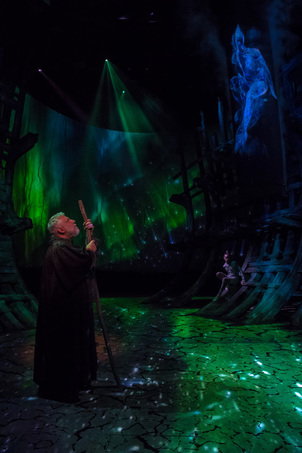 Technological innovation: Simon Russell Beale interacts with Ariel's avatar in The Tempest. Photo by Topher McGrillis. © RSC
Technological innovation: Simon Russell Beale interacts with Ariel's avatar in The Tempest. Photo by Topher McGrillis. © RSC
THE TEMPEST
* * * *
November 18, 2016
RSC, Royal Shakespeare Theatre, Stratford-upon-Avon, until Saturday, January 21, 2017, then transferring to The Barbican, London
Simon Russell Beale returns to Stratford after more than 20 years, playing a particularly poignant Prospero in a landmark production marked out by its unprecedented use of technological innovation.
For Michael Davies’s full review, visit whatsonstage.com
* * * *
November 18, 2016
RSC, Royal Shakespeare Theatre, Stratford-upon-Avon, until Saturday, January 21, 2017, then transferring to The Barbican, London
Simon Russell Beale returns to Stratford after more than 20 years, playing a particularly poignant Prospero in a landmark production marked out by its unprecedented use of technological innovation.
For Michael Davies’s full review, visit whatsonstage.com
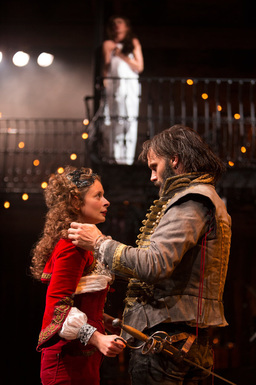 Faye Castelow and Joseph Millson in The Rover. Photo by Ellie Kurttz. © RSC.
Faye Castelow and Joseph Millson in The Rover. Photo by Ellie Kurttz. © RSC.
THE ROVER
* * * *
September 16, 2016
RSC, The Swan Theatre, Stratford-upon-Avon, until Saturday, February 11, 2017
Thirty years on from its appearance at the opening of The Swan, Aphra Behn’s riotous Restoration romp gets the full feminist treatment in a dynamic new production in the same house. Loveday Ingram directs a sumptuous, sultry stroll through the sexual shenanigans of the 1650s.
For Michael Davies’s full review visit whatsonstage.com
* * * *
September 16, 2016
RSC, The Swan Theatre, Stratford-upon-Avon, until Saturday, February 11, 2017
Thirty years on from its appearance at the opening of The Swan, Aphra Behn’s riotous Restoration romp gets the full feminist treatment in a dynamic new production in the same house. Loveday Ingram directs a sumptuous, sultry stroll through the sexual shenanigans of the 1650s.
For Michael Davies’s full review visit whatsonstage.com
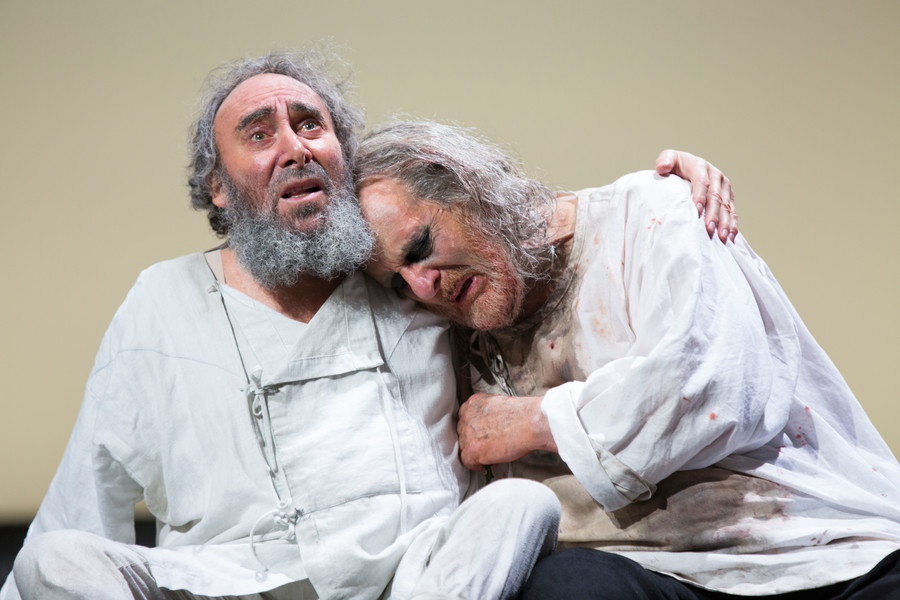 Antony Sher as King Lear and David Troughton as the blinded Gloucester in the RSC's new production. Photo by Ellie Kurttz. © RSC
Antony Sher as King Lear and David Troughton as the blinded Gloucester in the RSC's new production. Photo by Ellie Kurttz. © RSC
KING LEAR
* * * *
September 1, 2016
RSC, Royal Shakespeare Theatre, Stratford-upon-Avon, until Saturday, October 15, 2016, then at the Barbican, London from Thursday, November 10, to Friday, December 23, 2016
The much-anticipated Antony Sher interpretation of Shakespeare’s monumental role in a production directed by RSC chief Gregory Doran has much to commend it.
For Michael Davies’s full review visit whatsonstage.com
* * * *
September 1, 2016
RSC, Royal Shakespeare Theatre, Stratford-upon-Avon, until Saturday, October 15, 2016, then at the Barbican, London from Thursday, November 10, to Friday, December 23, 2016
The much-anticipated Antony Sher interpretation of Shakespeare’s monumental role in a production directed by RSC chief Gregory Doran has much to commend it.
For Michael Davies’s full review visit whatsonstage.com
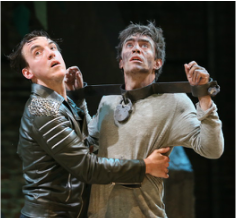 Jamie Wilkes (left) and James Corrigan star as The Two Noble Kinsmen. Photo by Donald Cooper. © RSC
Jamie Wilkes (left) and James Corrigan star as The Two Noble Kinsmen. Photo by Donald Cooper. © RSC
THE TWO NOBLE KINSMEN
* * *
August 25, 2016
RSC, The Swan Theatre, Stratford-upon-Avon, until Tuesday, February 7, 2017
Shakespeare’s rarely performed final play, co-written with John Fletcher, gets an airing to celebrate the 30th birthday of the RSC’s Swan auditorium.
For Michael Davies’s full review visit whatsonstage.com
* * *
August 25, 2016
RSC, The Swan Theatre, Stratford-upon-Avon, until Tuesday, February 7, 2017
Shakespeare’s rarely performed final play, co-written with John Fletcher, gets an airing to celebrate the 30th birthday of the RSC’s Swan auditorium.
For Michael Davies’s full review visit whatsonstage.com
ALWAYS ORANGE / FALL OF THE KINGDOM, RISE OF THE FOOT SOLDIER
* * * / * * *
July 30, 2016
RSC, The Other Place, Stratford-upon-Avon, until Saturday, August 27, 2016
The first two in a summer season quartet of radical plays under the banner Making Mischief get an airing in the RSC’s newly refurbished studio space.
For the full review visit whatsonstage.com
* * * / * * *
July 30, 2016
RSC, The Other Place, Stratford-upon-Avon, until Saturday, August 27, 2016
The first two in a summer season quartet of radical plays under the banner Making Mischief get an airing in the RSC’s newly refurbished studio space.
For the full review visit whatsonstage.com
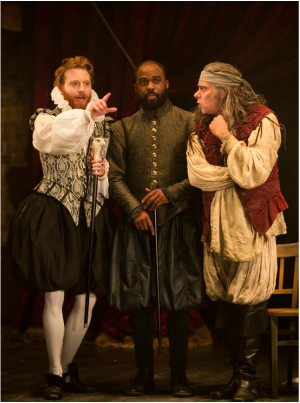 Kastril (Tom McCall, left) is duped by Jeremy (Ken Nwosu) and The Alchemist (Mark Lockyer). Photo by Helen Maybanks. © RSC
Kastril (Tom McCall, left) is duped by Jeremy (Ken Nwosu) and The Alchemist (Mark Lockyer). Photo by Helen Maybanks. © RSC
THE ALCHEMIST
* * * *
June 3, 2016
RSC, The Swan Theatre, Stratford-upon-Avon, until Saturday, August 6, 2016
Polly Findlay’s romping production of Ben Jonson’s masterpiece makes a worthy addition to the RSC’s summer repertoire.
For Michael Davies’s full review visit whatsonstage.com
* * * *
June 3, 2016
RSC, The Swan Theatre, Stratford-upon-Avon, until Saturday, August 6, 2016
Polly Findlay’s romping production of Ben Jonson’s masterpiece makes a worthy addition to the RSC’s summer repertoire.
For Michael Davies’s full review visit whatsonstage.com
CYMBELINE
* * * *
May 11, 2016
RSC, Royal Shakespeare Theatre, Stratford-upon-Avon, until Saturday, October 15, 2016
Melly Still’s production grabs the attention and rarely lets go.
For Michael Davies’s full review visit whatsonstage.com
* * * *
May 11, 2016
RSC, Royal Shakespeare Theatre, Stratford-upon-Avon, until Saturday, October 15, 2016
Melly Still’s production grabs the attention and rarely lets go.
For Michael Davies’s full review visit whatsonstage.com
 Vibrant: Paapa Essiedu as Hamlet. Photo by Manuel Harlan. © RSC
Vibrant: Paapa Essiedu as Hamlet. Photo by Manuel Harlan. © RSC
HAMLET
* * * *
April 6, 2016
RSC, Royal Shakespeare Theatre, Stratford-upon-Avon, until Saturday, August 13, 2016
Forget all the nonsense about the rights or wrongs of a black Hamlet: sit back and enjoy the show. Paapa Essiedu has as much right to the Danish princedom as anyone who’s trodden the Stratford boards in black clothes and mood.
In fact – and it’s one of the markers of Simon Godwin’s vivacious new production for the RSC – there’s precious little black to be seen among Paul Wills’s colourful designs and costumes. Transposing the Danish court to a third-world African dictatorship may have its conceptual flaws, but it’s consistently and imaginatively seen through, to considerable dramatic effect.
Thus the royal family appear in a range of vibrant outfits to match their heritage, while the Gravedigger is a full-on tribal warrior, complete with body paint and deep red soil in the hole he’s emptying. The travelling players exploit this cultural seam to the max, dancing and festooning the transformed RST with garish hand-daubed banners and tarpaulins. It’s all hugely authentic and simultaneously oddly alienating, adding a thought-provoking new perspective to this best-known of Shakespeare’s tragedies.
Among the performances, Essiedu is supreme. His Hamlet is pre-meditated, vengeful but still compassionate, toying with his Ophelia before becoming wracked with guilt after her death. He finds fresh meaning and purpose in his so-famous monologues and combines a stirring adulthood with a childish vulnerability that is strikingly appealing.
Clarence Smith is utterly believable, scheming and smarming convincingly as Hamlet’s murderous uncle Claudius, and Cyril Nri delivers an entertainingly wordy Polonius, with an end as dramatic as I’ve seen thanks to a stunning arras and a riveting coup de theatre.
Elsewhere, Natalie Simpson’s painfully poignant Ophelia tugs at the heartstrings while Marcus Griffiths makes the most his indignant, powerful Laertes.
Paul Anderson’s terrific lighting reinforces the textures and tones of a hot, arid landscape, while composer Sola Akingbola brings the wildness and menace of the narrative’s undercurrent to exhilarating life with a drum-led, pulsating African score.
For Godwin’s second effort in the RST – his first was a pleasing Two Gentlemen of Verona a couple of years back – this Hamlet is a worthy addition to a season commemorating the 400th anniversary of its author’s death.
* * * *
April 6, 2016
RSC, Royal Shakespeare Theatre, Stratford-upon-Avon, until Saturday, August 13, 2016
Forget all the nonsense about the rights or wrongs of a black Hamlet: sit back and enjoy the show. Paapa Essiedu has as much right to the Danish princedom as anyone who’s trodden the Stratford boards in black clothes and mood.
In fact – and it’s one of the markers of Simon Godwin’s vivacious new production for the RSC – there’s precious little black to be seen among Paul Wills’s colourful designs and costumes. Transposing the Danish court to a third-world African dictatorship may have its conceptual flaws, but it’s consistently and imaginatively seen through, to considerable dramatic effect.
Thus the royal family appear in a range of vibrant outfits to match their heritage, while the Gravedigger is a full-on tribal warrior, complete with body paint and deep red soil in the hole he’s emptying. The travelling players exploit this cultural seam to the max, dancing and festooning the transformed RST with garish hand-daubed banners and tarpaulins. It’s all hugely authentic and simultaneously oddly alienating, adding a thought-provoking new perspective to this best-known of Shakespeare’s tragedies.
Among the performances, Essiedu is supreme. His Hamlet is pre-meditated, vengeful but still compassionate, toying with his Ophelia before becoming wracked with guilt after her death. He finds fresh meaning and purpose in his so-famous monologues and combines a stirring adulthood with a childish vulnerability that is strikingly appealing.
Clarence Smith is utterly believable, scheming and smarming convincingly as Hamlet’s murderous uncle Claudius, and Cyril Nri delivers an entertainingly wordy Polonius, with an end as dramatic as I’ve seen thanks to a stunning arras and a riveting coup de theatre.
Elsewhere, Natalie Simpson’s painfully poignant Ophelia tugs at the heartstrings while Marcus Griffiths makes the most his indignant, powerful Laertes.
Paul Anderson’s terrific lighting reinforces the textures and tones of a hot, arid landscape, while composer Sola Akingbola brings the wildness and menace of the narrative’s undercurrent to exhilarating life with a drum-led, pulsating African score.
For Godwin’s second effort in the RST – his first was a pleasing Two Gentlemen of Verona a couple of years back – this Hamlet is a worthy addition to a season commemorating the 400th anniversary of its author’s death.
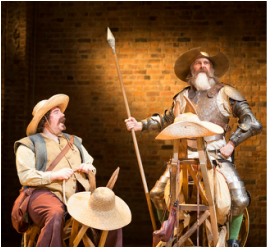 Man of La Mancha: David Threlfall (right) and Rufus Hound in Don Quixote. Photo by Helen Maybanks. © RSC
Man of La Mancha: David Threlfall (right) and Rufus Hound in Don Quixote. Photo by Helen Maybanks. © RSC
DON QUIXOTE
* * * *
March 4, 2016
RSC, The Swan Theatre, Stratford-upon-Avon, until Saturday, May 21, 2016
ONE of the main attractions of this new adaptation lies in the return of David Threlfall to the RSC, where he made such an impression well over thirty years ago in the iconic Nicholas Nickleby. But just as intriguing is the starry line-up of comedian Rufus Hound as Sancho Panza, poet James Fenton doing the adapting and Angus Jackson – fresh from his triumph with Oppenheimer – directing.
It’s not just on paper that the combination works enjoyably well. In Jackson’s safe hands, we know we’re in for a rollercoaster ride of physical gags, double-takes and belly-laughs, and the cast revel in every opportunity. Fenton’s script might not have the rapier-sharp satirical edge of the original Cervantes novel, which essentially created a new medium of European fiction, but there’s no shortage of entertaining jokes and amusing set-pieces.
Threlfall and Hound make a fine, if unlikely, double act, the elder statesman generously allowing his younger, less experienced compadre take the lion’s share of the laughs. Tottering around like some minor public school Billy Connolly lookalike, Threlfall’s Don Quixote is pathetic and poignant in equal measure, while Hound’s sidekick in a fatsuit runs proceedings amiably and capably enough to allow us to relax into the silliness of the whole enterprise.
The spirit of Monty Python is invoked repeatedly, from silly voices to comedy monks, and the episodic nature of Quixote’s adventures only adds to the notion of a collection of sketches strung together. Some punchlines are better than others, and there’s a real sense of things running out of steam badly in the second half, but everyone’s clearly having a ball and it’s infectious.
The grand designs of Robert Innes Hopkins make smart use of the Swan’s limitations, while Grant Olding’s songs are charming and atmospheric, even if they don’t add much to the narrative besides extending it to a numbing three-hour marathon.
With its palpable daftness and relentless eagerness to please, this Don Quixote hits more windmills than it misses, and makes a worthy tribute to the Spanish writer, the 400th anniversary of whose death we celebrate alongside Shakespeare’s in 2016.
* * * *
March 4, 2016
RSC, The Swan Theatre, Stratford-upon-Avon, until Saturday, May 21, 2016
ONE of the main attractions of this new adaptation lies in the return of David Threlfall to the RSC, where he made such an impression well over thirty years ago in the iconic Nicholas Nickleby. But just as intriguing is the starry line-up of comedian Rufus Hound as Sancho Panza, poet James Fenton doing the adapting and Angus Jackson – fresh from his triumph with Oppenheimer – directing.
It’s not just on paper that the combination works enjoyably well. In Jackson’s safe hands, we know we’re in for a rollercoaster ride of physical gags, double-takes and belly-laughs, and the cast revel in every opportunity. Fenton’s script might not have the rapier-sharp satirical edge of the original Cervantes novel, which essentially created a new medium of European fiction, but there’s no shortage of entertaining jokes and amusing set-pieces.
Threlfall and Hound make a fine, if unlikely, double act, the elder statesman generously allowing his younger, less experienced compadre take the lion’s share of the laughs. Tottering around like some minor public school Billy Connolly lookalike, Threlfall’s Don Quixote is pathetic and poignant in equal measure, while Hound’s sidekick in a fatsuit runs proceedings amiably and capably enough to allow us to relax into the silliness of the whole enterprise.
The spirit of Monty Python is invoked repeatedly, from silly voices to comedy monks, and the episodic nature of Quixote’s adventures only adds to the notion of a collection of sketches strung together. Some punchlines are better than others, and there’s a real sense of things running out of steam badly in the second half, but everyone’s clearly having a ball and it’s infectious.
The grand designs of Robert Innes Hopkins make smart use of the Swan’s limitations, while Grant Olding’s songs are charming and atmospheric, even if they don’t add much to the narrative besides extending it to a numbing three-hour marathon.
With its palpable daftness and relentless eagerness to please, this Don Quixote hits more windmills than it misses, and makes a worthy tribute to the Spanish writer, the 400th anniversary of whose death we celebrate alongside Shakespeare’s in 2016.
 Match of the day: Oliver Ryan (left) and Sandy Grierson strike to decide who plays what. Photo by Helen Maybanks. © RSC
Match of the day: Oliver Ryan (left) and Sandy Grierson strike to decide who plays what. Photo by Helen Maybanks. © RSC
DOCTOR FAUSTUS
* *
February 12, 2016
RSC, The Swan Theatre, Stratford-upon-Avon, until Thursday, August 4, 2016
The RSC’s new production of Marlowe’s dark drama is something of an endurance test, and not just because it runs for nearly two hours uninterrupted. Besides its length without an interval – inexcusable when there are so many opportunities to split the action and give everyone a break – it’s also a feast of gimmicks and directorial tricks that do little except detract from the magisterial masterpiece.
The tricksiness begins before a word is even spoken, with lead actors Sandy Grierson and Oliver Ryan, dressed identically, performing a drawn-out dumb show of mirrored actions culminating in both striking a match. The one whose match burns out first gets to play Faustus. The other is his nemesis Mephistophilis.
In the performance I saw, Grierson claimed the title role, his thick Scottish accent adding an additional layer of difficulty to the comprehension of director Maria Aberg’s interpretation. He’s intense, committed and thoughtful but he’s also hamstrung by the production’s heavy-handed conceits and brash sensibilities. Ryan, meanwhile, prowls the stage menacingly in blackened bare feet and a white suit, delivering the whims and wishes of Faustus in return for the brilliant doctor’s soul after 24 years of hedonism.
Unfortunately, with Naomi Dawson’s stark, cold design accompanied by Orlando Gough’s sterile score, those 24 years are portrayed as bleak, miserable and superficial, a million miles from the richness of Marlowe’s language and imagery. The soaring text is all but lost under a welter of tacky costumes, pointless musical interludes and an unintentionally comedic chorus of Charlie Chaplin lookalikes punctuating the narrative.
It’s hard to blame anyone other than Aberg for all this. With such iconic raw material and a talented cast of actors and musicians at her disposal, she’s managed to reduce one of the great epic tragedies of English literature to tawdry melodrama. Along the way she throws in everything from mime to cross-dressing but it’s all in vain.
Where there should be the sinister allure of the occult and the intoxicating appeal of forbidden magicke, there’s some inexplicable jiggling about and a bit of petty revenge. Let’s just say that Faustus hardly makes the most of his two and a half decades of omnipotence.
And ultimately, that’s what’s most depressing about the whole enterprise: despite the considerable resources of the RSC and the grand scale of Marlowe’s majestic play, this Doctor Faustus ends up being frustrating, tiresome and very, very long.
* *
February 12, 2016
RSC, The Swan Theatre, Stratford-upon-Avon, until Thursday, August 4, 2016
The RSC’s new production of Marlowe’s dark drama is something of an endurance test, and not just because it runs for nearly two hours uninterrupted. Besides its length without an interval – inexcusable when there are so many opportunities to split the action and give everyone a break – it’s also a feast of gimmicks and directorial tricks that do little except detract from the magisterial masterpiece.
The tricksiness begins before a word is even spoken, with lead actors Sandy Grierson and Oliver Ryan, dressed identically, performing a drawn-out dumb show of mirrored actions culminating in both striking a match. The one whose match burns out first gets to play Faustus. The other is his nemesis Mephistophilis.
In the performance I saw, Grierson claimed the title role, his thick Scottish accent adding an additional layer of difficulty to the comprehension of director Maria Aberg’s interpretation. He’s intense, committed and thoughtful but he’s also hamstrung by the production’s heavy-handed conceits and brash sensibilities. Ryan, meanwhile, prowls the stage menacingly in blackened bare feet and a white suit, delivering the whims and wishes of Faustus in return for the brilliant doctor’s soul after 24 years of hedonism.
Unfortunately, with Naomi Dawson’s stark, cold design accompanied by Orlando Gough’s sterile score, those 24 years are portrayed as bleak, miserable and superficial, a million miles from the richness of Marlowe’s language and imagery. The soaring text is all but lost under a welter of tacky costumes, pointless musical interludes and an unintentionally comedic chorus of Charlie Chaplin lookalikes punctuating the narrative.
It’s hard to blame anyone other than Aberg for all this. With such iconic raw material and a talented cast of actors and musicians at her disposal, she’s managed to reduce one of the great epic tragedies of English literature to tawdry melodrama. Along the way she throws in everything from mime to cross-dressing but it’s all in vain.
Where there should be the sinister allure of the occult and the intoxicating appeal of forbidden magicke, there’s some inexplicable jiggling about and a bit of petty revenge. Let’s just say that Faustus hardly makes the most of his two and a half decades of omnipotence.
And ultimately, that’s what’s most depressing about the whole enterprise: despite the considerable resources of the RSC and the grand scale of Marlowe’s majestic play, this Doctor Faustus ends up being frustrating, tiresome and very, very long.
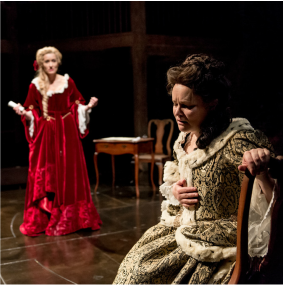 Natascha McElhone (left) as Sarah Churchill and Emma Cunniffe as Queen Anne. Photo by Manuel Harlan. © RSC
Natascha McElhone (left) as Sarah Churchill and Emma Cunniffe as Queen Anne. Photo by Manuel Harlan. © RSC
QUEEN ANNE
* * * *
December 4, 2015
RSC, The Swan Theatre, Stratford-upon-Avon, until Saturday, January 23, 2016
CONSIDERING the political machinations and personal intrigues surrounding this largely forgotten British monarch, it’s somewhat surprising that no-one has thought to make a play about her before now. Helen Edmundson rectifies that with an intelligent, if wordy, play that premieres in the fitting environs of the RSC’s Swan Theatre.
Running at almost three hours, it’s a hefty, complex construction that demands much of its audience, but delivers considerable returns for that attention. Director Natalie Abrahami keeps the production straightforward and sparse, aiding the comprehension by not overloading it with superfluous dressings and business. The emphasis is very much on the performances.
The narrative traces the crisis around the succession to the throne as Protestant Anne moves out of her child-bearing years, having endured 17 pregnancies without any full-grown offspring to show for them. The possibility of a Hanoverian successor or – worse – a Catholic one exercises the advisers and politicians around her almost as much as it troubles the queen herself.
Meanwhile, in her difficult personal life, Anne is struggling to maintain her childhood friendship with Sarah Churchill, wife of the dashing military leader who will become Lord Marlborough and win a thrilling victory at Blenheim. The pressure of the politicians and the people, as represented by satirists Jonathan Swift and Daniel Defoe, takes a heavy toll on the relationship.
For all the wheeling and dealing of the different factions, it’s this personal drama that carries greatest potential for emotional exploration, and it feels like a missed opportunity when Edmundson opts for the political story as her main thread. Having said that, she makes the dense subject matter work excitingly, always rendering the twists and turns with clarity and authenticity.
In the title role, Emma Cunniffe grows throughout the evening, starting as a naïve pawn and emerging as a political heavyweight in her own right. From the frail fragility of her latest failed pregnancy, she develops a steely self-determination that provides a real engine for the story.
Opposite her, making her RSC debut, Natascha McElhone goes the other way, crashing from a striking schemer to a spent force in spectacular fashion. Her final speech, claiming to be the greatest woman of her age, has a brilliant hollowness to it, reinforced by the lurking figure of Anne, seeming to claim that mantle for herself instead.
Across the capable cast, there are many delightful cameos, from Michael Fenton Stevens’s quack of a doctor to Jonathan Broadbent’s sycophantic Leader of the Commons. Hannah Clark’s simple set serves to highlight the significance of the words and there are some credibly entertaining satirical songs by Edmundson that help leaven the atmosphere at strategic points.
Quite apart from anything else, it’s wonderful to see a new play with such meaty roles for two leading women, piggybacking on the Swan’s 2014 Roaring Girls season to keep strong female characters firmly in the spotlight.
* * * *
December 4, 2015
RSC, The Swan Theatre, Stratford-upon-Avon, until Saturday, January 23, 2016
CONSIDERING the political machinations and personal intrigues surrounding this largely forgotten British monarch, it’s somewhat surprising that no-one has thought to make a play about her before now. Helen Edmundson rectifies that with an intelligent, if wordy, play that premieres in the fitting environs of the RSC’s Swan Theatre.
Running at almost three hours, it’s a hefty, complex construction that demands much of its audience, but delivers considerable returns for that attention. Director Natalie Abrahami keeps the production straightforward and sparse, aiding the comprehension by not overloading it with superfluous dressings and business. The emphasis is very much on the performances.
The narrative traces the crisis around the succession to the throne as Protestant Anne moves out of her child-bearing years, having endured 17 pregnancies without any full-grown offspring to show for them. The possibility of a Hanoverian successor or – worse – a Catholic one exercises the advisers and politicians around her almost as much as it troubles the queen herself.
Meanwhile, in her difficult personal life, Anne is struggling to maintain her childhood friendship with Sarah Churchill, wife of the dashing military leader who will become Lord Marlborough and win a thrilling victory at Blenheim. The pressure of the politicians and the people, as represented by satirists Jonathan Swift and Daniel Defoe, takes a heavy toll on the relationship.
For all the wheeling and dealing of the different factions, it’s this personal drama that carries greatest potential for emotional exploration, and it feels like a missed opportunity when Edmundson opts for the political story as her main thread. Having said that, she makes the dense subject matter work excitingly, always rendering the twists and turns with clarity and authenticity.
In the title role, Emma Cunniffe grows throughout the evening, starting as a naïve pawn and emerging as a political heavyweight in her own right. From the frail fragility of her latest failed pregnancy, she develops a steely self-determination that provides a real engine for the story.
Opposite her, making her RSC debut, Natascha McElhone goes the other way, crashing from a striking schemer to a spent force in spectacular fashion. Her final speech, claiming to be the greatest woman of her age, has a brilliant hollowness to it, reinforced by the lurking figure of Anne, seeming to claim that mantle for herself instead.
Across the capable cast, there are many delightful cameos, from Michael Fenton Stevens’s quack of a doctor to Jonathan Broadbent’s sycophantic Leader of the Commons. Hannah Clark’s simple set serves to highlight the significance of the words and there are some credibly entertaining satirical songs by Edmundson that help leaven the atmosphere at strategic points.
Quite apart from anything else, it’s wonderful to see a new play with such meaty roles for two leading women, piggybacking on the Swan’s 2014 Roaring Girls season to keep strong female characters firmly in the spotlight.
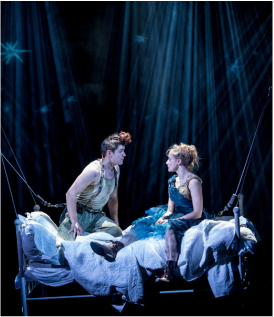 Mariah Gale and Rhys Rusbatch fly as Wendy and Peter Pan. Photo by Manuel Harlan. © RSC
Mariah Gale and Rhys Rusbatch fly as Wendy and Peter Pan. Photo by Manuel Harlan. © RSC
WENDY AND PETER PAN
* * * *
November 25, 2015
RSC, Royal Shakespeare Theatre, Stratford-upon-Avon, until Sunday, January 31, 2016
Ella Hickson’s retelling of the JM Barrie classic returns for a second boisterous helping.
For Michael Davies’s full review visit whatsonstage.com
* * * *
November 25, 2015
RSC, Royal Shakespeare Theatre, Stratford-upon-Avon, until Sunday, January 31, 2016
Ella Hickson’s retelling of the JM Barrie classic returns for a second boisterous helping.
For Michael Davies’s full review visit whatsonstage.com
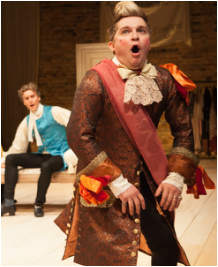 Restoration romp: Tom Turner (left) and Jonathan Broadbent in Love for Love. Photo by Ellie Kurttz. © RSC
Restoration romp: Tom Turner (left) and Jonathan Broadbent in Love for Love. Photo by Ellie Kurttz. © RSC
LOVE FOR LOVE
* * * *
November 4, 2015
RSC, The Swan Theatre, Stratford-upon-Avon, until Friday, January 22, 2016
William Congreve’s Restoration comedy gets a roisterous rendition courtesy of director Selina Cadell and a talented ensemble.
For Michael Davies’s full review visit whatsonstage.com
* * * *
November 4, 2015
RSC, The Swan Theatre, Stratford-upon-Avon, until Friday, January 22, 2016
William Congreve’s Restoration comedy gets a roisterous rendition courtesy of director Selina Cadell and a talented ensemble.
For Michael Davies’s full review visit whatsonstage.com
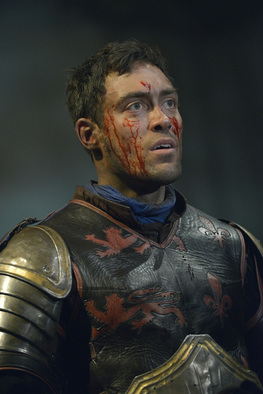 Alex Hassell as Henry V in Gregory Doran's new production. Photo by Keith Pattison. © RSC
Alex Hassell as Henry V in Gregory Doran's new production. Photo by Keith Pattison. © RSC
HENRY V
* * * *
October 2, 2015
RSC, Royal Shakespeare Theatre, Stratford-upon-Avon, until Sunday, October 25, 2015
THERE’S a real sense of transition in Gregory Doran’s excellent new production of Henry V at Stratford. And at the heart of it is the subtle but superbly developed performance of Alex Hassell in the title role.
Somewhat overshadowed by Antony Sher’s glorious Falstaff in the earlier history plays, Hassell’s boy-king emerges from the roisterous ne’er-do-well of his Prince Hal chrysalis into the beautifully formed butterfly of the newly-crowned king. His journey to manhood and statesmanhood continues throughout this production, marking out Hassell’s performance as thoughtful, well-judged and ultimately assertive.
Doran’s show emphasises the king’s devotion to divine right and to God, placing England (and even Wales) at the pinnacle of the medieval league table. If the French suffer as comic idiots as a result, that’s too bad – there’s no mistaking the political line in Shakespeare’s narrative. But Doran doesn’t duck the personal either, with a touching wooing scene (often a lame add-on) with the French princess Katherine (a scene-stealing Jennifer Kirby).
The strong company draw out plenty of humour, too, from the feisty Welsh captain Fluellen (Joshua Richards) to an incoherently brilliant Simon Yadoo as a Scottish officer, contrasting the muddy grimness of war with some welcome lighter touches.
Strolling through proceedings is a schoolmasterly Oliver Ford Davies as the Chorus, imploring us in rich, velvety tones to lend our imaginations to supply the battle scenes. With a constant twinkle in his eye, he’s Everyman up on stage, representing us among the conscripted soldiers and preventing the soaring language from distancing us from the harsh realities.
Stephen Brimson Lewis’s shimmering set design and costumes look fabulous, Paul Englishby’s ever-reliable score works brilliantly, and Tim Mitchell’s lighting adds atmosphere aplenty. With imposing performances from noblemen and peasants alike, it’s a Henry that sits well within the long line of Stratford greats.
* * * *
October 2, 2015
RSC, Royal Shakespeare Theatre, Stratford-upon-Avon, until Sunday, October 25, 2015
THERE’S a real sense of transition in Gregory Doran’s excellent new production of Henry V at Stratford. And at the heart of it is the subtle but superbly developed performance of Alex Hassell in the title role.
Somewhat overshadowed by Antony Sher’s glorious Falstaff in the earlier history plays, Hassell’s boy-king emerges from the roisterous ne’er-do-well of his Prince Hal chrysalis into the beautifully formed butterfly of the newly-crowned king. His journey to manhood and statesmanhood continues throughout this production, marking out Hassell’s performance as thoughtful, well-judged and ultimately assertive.
Doran’s show emphasises the king’s devotion to divine right and to God, placing England (and even Wales) at the pinnacle of the medieval league table. If the French suffer as comic idiots as a result, that’s too bad – there’s no mistaking the political line in Shakespeare’s narrative. But Doran doesn’t duck the personal either, with a touching wooing scene (often a lame add-on) with the French princess Katherine (a scene-stealing Jennifer Kirby).
The strong company draw out plenty of humour, too, from the feisty Welsh captain Fluellen (Joshua Richards) to an incoherently brilliant Simon Yadoo as a Scottish officer, contrasting the muddy grimness of war with some welcome lighter touches.
Strolling through proceedings is a schoolmasterly Oliver Ford Davies as the Chorus, imploring us in rich, velvety tones to lend our imaginations to supply the battle scenes. With a constant twinkle in his eye, he’s Everyman up on stage, representing us among the conscripted soldiers and preventing the soaring language from distancing us from the harsh realities.
Stephen Brimson Lewis’s shimmering set design and costumes look fabulous, Paul Englishby’s ever-reliable score works brilliantly, and Tim Mitchell’s lighting adds atmosphere aplenty. With imposing performances from noblemen and peasants alike, it’s a Henry that sits well within the long line of Stratford greats.
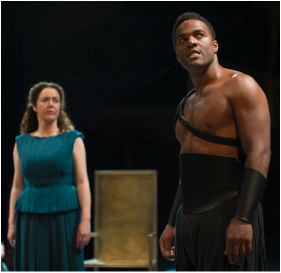 Derbhle Crotty as Hecuba and Ray Fearon as Agamemnon. Photo by Topher McGrillis. © RSC
Derbhle Crotty as Hecuba and Ray Fearon as Agamemnon. Photo by Topher McGrillis. © RSC
HECUBA
* * *
September 30, 2015
RSC, The Swan Theatre, Stratford-upon-Avon, until Saturday, October 17, 2015
THERE’S a dramatic and powerful play in the story of Hecuba, the last tragic queen of Troy who watched as her family was literally dismembered in front of her by the invading Greeks. Sadly, this isn’t it.
Marina Carr’s new version for the RSC adopts the quirky, inaccessible device of having the characters explain the story in reported speech to the audience, rather than simply saying the words to each other. This disastrous decision shifts everything into a kind of detached mode, separating all the characters from their emotions and reducing the extraordinary, bloody narrative to an ancient history lesson.
Coupled with some distinctly unqueenly dialogue (“Shut it!”) and a weirdly measured pace of delivery, it begins to make the almost two-hour production – run inexplicably with no interval – feel like a Homerian epic of endurance.
The weight of the script is not aided by Erica Whyman’s static, sombre production. Soutra Gilmour’s shiny design is simple to the point of basic, with plain costumes preventing any distraction and the predominantly empty stage largely unfettered by props.
There’s refuge in the performances, though, with Ray Fearon in particularly imposing form as the Greek general Agamemnon. His stature and gravitas are impressive, commanding the stage whenever he’s on it, and he gets strong support from Chu Omambala as his lieutenant Odysseus.
The women of Troy, led by Hecuba herself, are stoic under threat. Derbhle Crotty as the eponymous queen is asked to carry insane amounts of misery – the opening scene begins with her description of sitting among the butchered remains of her children – but is prevented from fully engaging with the character’s emotions thanks to the distancing nature of the text. Nadia Albina makes another notable RSC contribution in the role of Cassandra, Hecuba’s prophetess daughter, and singer Lara Stubbs adds an unworldly dimension with some fine vocal expression in Isobel Waller-Bridge’s evocative music.
But it’s a long couple of hours of grim storytelling that leaves you longing for a bit of straightforward playwriting as a way of connecting properly with the audience.
* * *
September 30, 2015
RSC, The Swan Theatre, Stratford-upon-Avon, until Saturday, October 17, 2015
THERE’S a dramatic and powerful play in the story of Hecuba, the last tragic queen of Troy who watched as her family was literally dismembered in front of her by the invading Greeks. Sadly, this isn’t it.
Marina Carr’s new version for the RSC adopts the quirky, inaccessible device of having the characters explain the story in reported speech to the audience, rather than simply saying the words to each other. This disastrous decision shifts everything into a kind of detached mode, separating all the characters from their emotions and reducing the extraordinary, bloody narrative to an ancient history lesson.
Coupled with some distinctly unqueenly dialogue (“Shut it!”) and a weirdly measured pace of delivery, it begins to make the almost two-hour production – run inexplicably with no interval – feel like a Homerian epic of endurance.
The weight of the script is not aided by Erica Whyman’s static, sombre production. Soutra Gilmour’s shiny design is simple to the point of basic, with plain costumes preventing any distraction and the predominantly empty stage largely unfettered by props.
There’s refuge in the performances, though, with Ray Fearon in particularly imposing form as the Greek general Agamemnon. His stature and gravitas are impressive, commanding the stage whenever he’s on it, and he gets strong support from Chu Omambala as his lieutenant Odysseus.
The women of Troy, led by Hecuba herself, are stoic under threat. Derbhle Crotty as the eponymous queen is asked to carry insane amounts of misery – the opening scene begins with her description of sitting among the butchered remains of her children – but is prevented from fully engaging with the character’s emotions thanks to the distancing nature of the text. Nadia Albina makes another notable RSC contribution in the role of Cassandra, Hecuba’s prophetess daughter, and singer Lara Stubbs adds an unworldly dimension with some fine vocal expression in Isobel Waller-Bridge’s evocative music.
But it’s a long couple of hours of grim storytelling that leaves you longing for a bit of straightforward playwriting as a way of connecting properly with the audience.
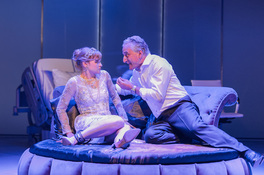 Henry Goodman's Volpone attempts to seduce a victim (Rhiannon Handy) in Trevor Nunn's production. Photo by Manuel Harlan. © RSC
Henry Goodman's Volpone attempts to seduce a victim (Rhiannon Handy) in Trevor Nunn's production. Photo by Manuel Harlan. © RSC
VOLPONE
* * *
July 11, 2015
RSC, The Swan Theatre, Stratford-upon-Avon, until Saturday, September 12, 2015
A SATIRE on the self-serving greed of the uber-rich – what could be more apposite for our economically troubled times? A glitzy dissection of the destructive power of avarice – how pertinently entertaining. And insofar as it pokes fun at its easy targets with glee and panache, Trevor Nunn’s new production of Ben Jonson’s 400-year-old comedy is both satirical and entertaining.
But the modern-day world in which the director sets his version is not one that is easily recognisable. The sly, grasping Volpone surrounds himself with the trinkets and baubles of wealth but the victims of his cons are simply other wealthy merchants, so as an audience we’re never really bothered who ends up with the loot. Plainly, it isn’t going to be anyone deserving.
The fact that Jonson brings them all to a sorry conclusion barely makes up for the fact that, for the most part, we’re watching a bunch of scheming, unpleasant City types trying to do each other down. In the end, it all becomes a little tiresome.
There are plenty of fireworks along the way, however, and they pretty much all centre on Henry Goodman’s extraordinary Volpone. Whether he’s impersonating a sick old duffer, an Italian snake-oil salesman or a worldly-wise court officer, his versatility and bravado are breathtaking. At times, it’s like he’s channelling Robin Williams or Ronnie Barker with his range of voices and stunning array of personae. And there’s always a twinkle in the eye, a warmth that belies the unlikeable exterior of this selfish hero.
The rest of the production is clearly built around this virtuoso performance. The problem with that is that whenever he’s off-stage, the pace inevitably flags. Even the opening scene, in which he feigns terminal illness to dupe a variety of would-be heirs, runs out of steam and, like the whole show, could stand some judicious cutting.
It looks fabulous, with a stark modernist design by Stephen Brimson Lewis, and there are enjoyable performances among the supporting cast, notably Steven Pacey’s nice-but-dim toff Sir Politic Would-Be and his Essex wife (Annette McLaughlin). But the pace and tone are too uneven and the evening too long to maintain the enthusiastic energy of its star.
* * *
July 11, 2015
RSC, The Swan Theatre, Stratford-upon-Avon, until Saturday, September 12, 2015
A SATIRE on the self-serving greed of the uber-rich – what could be more apposite for our economically troubled times? A glitzy dissection of the destructive power of avarice – how pertinently entertaining. And insofar as it pokes fun at its easy targets with glee and panache, Trevor Nunn’s new production of Ben Jonson’s 400-year-old comedy is both satirical and entertaining.
But the modern-day world in which the director sets his version is not one that is easily recognisable. The sly, grasping Volpone surrounds himself with the trinkets and baubles of wealth but the victims of his cons are simply other wealthy merchants, so as an audience we’re never really bothered who ends up with the loot. Plainly, it isn’t going to be anyone deserving.
The fact that Jonson brings them all to a sorry conclusion barely makes up for the fact that, for the most part, we’re watching a bunch of scheming, unpleasant City types trying to do each other down. In the end, it all becomes a little tiresome.
There are plenty of fireworks along the way, however, and they pretty much all centre on Henry Goodman’s extraordinary Volpone. Whether he’s impersonating a sick old duffer, an Italian snake-oil salesman or a worldly-wise court officer, his versatility and bravado are breathtaking. At times, it’s like he’s channelling Robin Williams or Ronnie Barker with his range of voices and stunning array of personae. And there’s always a twinkle in the eye, a warmth that belies the unlikeable exterior of this selfish hero.
The rest of the production is clearly built around this virtuoso performance. The problem with that is that whenever he’s off-stage, the pace inevitably flags. Even the opening scene, in which he feigns terminal illness to dupe a variety of would-be heirs, runs out of steam and, like the whole show, could stand some judicious cutting.
It looks fabulous, with a stark modernist design by Stephen Brimson Lewis, and there are enjoyable performances among the supporting cast, notably Steven Pacey’s nice-but-dim toff Sir Politic Would-Be and his Essex wife (Annette McLaughlin). But the pace and tone are too uneven and the evening too long to maintain the enthusiastic energy of its star.
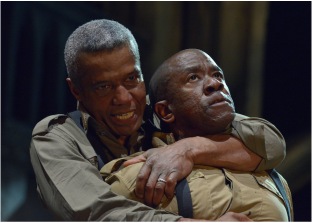 Hugh Quarshie and Lucian Msamati as Othello and Iago. Photo by Keith Pattison. © RSC
Hugh Quarshie and Lucian Msamati as Othello and Iago. Photo by Keith Pattison. © RSC
OTHELLO
* * * *
July 11, 2015
RSC, Royal Shakespeare Theatre, Stratford-upon-Avon, until Friday, August 28, 2015
THE notion of the outsider is a self-confessed engine behind this summer’s Stratford offerings from the RSC. We’ve already had a contentious Merchant of Venice and Jew of Malta competing to throw off the centuries-old ‘anti-Semitic’ tag. Now comes Othello, which looks to portray its study of racism in a new light by casting black actors as both the title character and his devious sidekick Iago.
Fortunately, director Iqbal Khan – who brought us a vibrant, Indian-themed Much Ado a few years back – doesn’t overplay this idea, and Hugh Quarshie and Lucian Msamati deliver terrific performances that make this colourblind casting work perfectly well, without sparking worrying questions in the viewer’s mind.
In fact, it’s their counterbalancing that provides the real drive for this considered, well-paced production. Msamati makes the most of his opportunities as Iago, dissembling and deceiving with just the right amount of venom, without ever stepping over into caricature or comedy villainy. Quarshie, meanwhile, is a thoughtful and quiet (sometimes too quiet for this big space) Othello, finding pathos as well as pigheadedness in the doomed general who’s duped into accusing his faithful wife of adultery.
Joanna Vanderham makes a stunning RSC debut as Desdemona, a subtle combination of feisty young bride and obedient wife with a fine vocal delivery and real stage presence. If you haven’t already discovered her from the BBC’s The Paradise, keep an eye on that name – she’s going to be one to watch.
Khan’s production looks sumptuous, thanks to crumbling Venetian architecture and real canals in Ciaran Bagnall’s evocative set, and the supporting ensemble offer plenty of strong interpretations, from Ayesha Dharker’s poignant maid Emilia to Jacob Fortune-Lloyd’s boyish, bemused Cassio, the unfortunate lieutenant co-accused with Desdemona.
With the emphasis on telling this powerful narrative with clarity and excitement, Khan delivers a production that explores its themes of race, jealousy and rage without allowing any one of them to dominate. It’s a fine addition to the summer season.
* * * *
July 11, 2015
RSC, Royal Shakespeare Theatre, Stratford-upon-Avon, until Friday, August 28, 2015
THE notion of the outsider is a self-confessed engine behind this summer’s Stratford offerings from the RSC. We’ve already had a contentious Merchant of Venice and Jew of Malta competing to throw off the centuries-old ‘anti-Semitic’ tag. Now comes Othello, which looks to portray its study of racism in a new light by casting black actors as both the title character and his devious sidekick Iago.
Fortunately, director Iqbal Khan – who brought us a vibrant, Indian-themed Much Ado a few years back – doesn’t overplay this idea, and Hugh Quarshie and Lucian Msamati deliver terrific performances that make this colourblind casting work perfectly well, without sparking worrying questions in the viewer’s mind.
In fact, it’s their counterbalancing that provides the real drive for this considered, well-paced production. Msamati makes the most of his opportunities as Iago, dissembling and deceiving with just the right amount of venom, without ever stepping over into caricature or comedy villainy. Quarshie, meanwhile, is a thoughtful and quiet (sometimes too quiet for this big space) Othello, finding pathos as well as pigheadedness in the doomed general who’s duped into accusing his faithful wife of adultery.
Joanna Vanderham makes a stunning RSC debut as Desdemona, a subtle combination of feisty young bride and obedient wife with a fine vocal delivery and real stage presence. If you haven’t already discovered her from the BBC’s The Paradise, keep an eye on that name – she’s going to be one to watch.
Khan’s production looks sumptuous, thanks to crumbling Venetian architecture and real canals in Ciaran Bagnall’s evocative set, and the supporting ensemble offer plenty of strong interpretations, from Ayesha Dharker’s poignant maid Emilia to Jacob Fortune-Lloyd’s boyish, bemused Cassio, the unfortunate lieutenant co-accused with Desdemona.
With the emphasis on telling this powerful narrative with clarity and excitement, Khan delivers a production that explores its themes of race, jealousy and rage without allowing any one of them to dominate. It’s a fine addition to the summer season.
 Doomed: Catrin Stewart and Matthew Needham in Love's Sacrifice. Photo by Helen Maybanks. © RSC
Doomed: Catrin Stewart and Matthew Needham in Love's Sacrifice. Photo by Helen Maybanks. © RSC
LOVE’S SACRIFICE
* * * *
May 28, 2015
RSC, The Swan Theatre, Stratford-upon-Avon, until Wednesday, June 24, 2015
IT’S quite possible that John Ford’s tragedy of jealousy and misplaced rage has not been professionally performed for nearly 400 years. There’s even a chance that this RSC production is a world premiere. The claim certainly adds a frisson of excitement to the unveiling of what turns out to be rather an impressive evening.
Certainly, there are parallels with Shakespeare’s rather better known tragedy of jealousy, Othello – which will be opening later this summer in the main house next door. As a curtain-raiser, Ford’s brisk, bloody potboiler has a great deal to offer. Its themes are powerful and resonate down the centuries, and director Matthew Dunster brings it entertainingly to life in his debut for the RSC.
Anna Fleischle creates a trompe l’oeil design of iron arches and stained glass that gives the impression of epic scale in the intimate confines of The Swan, and Alexander Balanescu’s underscoring music adds to the atmosphere generated by Lee Curran’s evocative lighting. Dunster keeps the pace rattling along, although the regular dumb-show vignettes are somewhat overdone and unnecessary.
Where the production scores most highly is in its performances. Catrin Stewart and Jamie Thomas King make a striking will-they-won’t-they couple at the heart of the story, tearing themselves apart in their desperate reluctance to cuckold her husband and his friend, the unfortunate Duke of Pavy (Matthew Needham). This rollercoaster emotional struggle provides the driving force for the unfolding narrative, which proceeds relentlessly and chillingly to its inevitable conclusion with verve and vitality.
Comic relief comes in the shape of Matthew Kelly’s touching but idiotic courtier Mauruccio, and the ensemble remains strong across its entirety. With surefooted confidence in their unknown but worthy source material, the company presents a show that asks one big question: why has it taken this long to surface?
* * * *
May 28, 2015
RSC, The Swan Theatre, Stratford-upon-Avon, until Wednesday, June 24, 2015
IT’S quite possible that John Ford’s tragedy of jealousy and misplaced rage has not been professionally performed for nearly 400 years. There’s even a chance that this RSC production is a world premiere. The claim certainly adds a frisson of excitement to the unveiling of what turns out to be rather an impressive evening.
Certainly, there are parallels with Shakespeare’s rather better known tragedy of jealousy, Othello – which will be opening later this summer in the main house next door. As a curtain-raiser, Ford’s brisk, bloody potboiler has a great deal to offer. Its themes are powerful and resonate down the centuries, and director Matthew Dunster brings it entertainingly to life in his debut for the RSC.
Anna Fleischle creates a trompe l’oeil design of iron arches and stained glass that gives the impression of epic scale in the intimate confines of The Swan, and Alexander Balanescu’s underscoring music adds to the atmosphere generated by Lee Curran’s evocative lighting. Dunster keeps the pace rattling along, although the regular dumb-show vignettes are somewhat overdone and unnecessary.
Where the production scores most highly is in its performances. Catrin Stewart and Jamie Thomas King make a striking will-they-won’t-they couple at the heart of the story, tearing themselves apart in their desperate reluctance to cuckold her husband and his friend, the unfortunate Duke of Pavy (Matthew Needham). This rollercoaster emotional struggle provides the driving force for the unfolding narrative, which proceeds relentlessly and chillingly to its inevitable conclusion with verve and vitality.
Comic relief comes in the shape of Matthew Kelly’s touching but idiotic courtier Mauruccio, and the ensemble remains strong across its entirety. With surefooted confidence in their unknown but worthy source material, the company presents a show that asks one big question: why has it taken this long to surface?
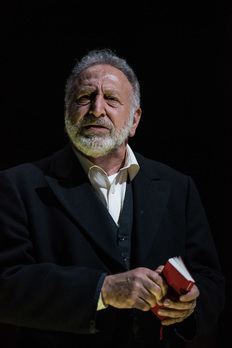 Sidelined: Makram J Khoury as Shylock. Photo by Hugo Glendinning. © RSC
Sidelined: Makram J Khoury as Shylock. Photo by Hugo Glendinning. © RSC
THE MERCHANT OF VENICE
* * *
May 28, 2015
RSC, Royal Shakespeare Theatre, Stratford-upon-Avon, until Wednesday, September 2, 2015
THE shadow of Rupert Goold’s five-star, Las Vegas-inspired 2011 production hangs over Stratford’s main house like an intimidating older brother. But even without the sparkling memory of that extraordinary show, Polly Findlay’s latest version for the RSC would emerge as solid and sound at best.
It’s one of those productions which has the director’s stamp all over it – for better or for worse – and regular readers will know that going for the “concept” interpretation is, to this reviewer’s mind, a veritable tightrope. Goold managed it with a confident swagger; Findlay is less successful.
Her modern-day Merchant sidelines Shylock decisively, placing the titular merchant Antonio and his cross-dressing saviour Portia at the heart of the story. This, in itself, is perfectly reasonable and consistently presented. Where the problems begin to arise is in some of the more obscure directorial decisions and their consequences.
For instance, Antonio is portrayed as a fawning homosexual lover of his good friend Bassanio, whose flakiness almost leads to the unfortunate merchant’s demise. So far, so interesting. But when it comes to following through on this, with Portia’s relationship with Bassanio hanging in the balance, the compelling potential of the subtext is allowed to dissipate, and it never becomes more than a rather intriguing idea.
Elsewhere, a massive metal pendulum, set in motion early on by Portia and left to swing throughout the entire play, is never satisfactorily explained. Nor is the presence of many (but not all) of the performers on benches at the side of the stage, awaiting their entrances in solemnity – or is it boredom?
Despite its shortcomings, the production looks splendid, partly thanks to a gleaming reflective black surface on floor and walls in Johannes Shutz’s pared-back design. Patsy Ferran offers a spirited, nuanced Portia and there’s some useful supporting work from a large ensemble cast. Jamie Ballard’s Antonio is emotional and weepy, while Tim Samuels has a decent go at mining some cynical comedy from the thankless role of Launcelot Gobbo. Makram J Khoury’s Shylock, meanwhile, is underpowered and forgettable – although how much of this is down to the performance and how much to the production it’s hard to say.
For anyone coming new to the play, it’s a perfectly serviceable reading that delivers plenty of action and a clear narrative. If you saw the Goold version, it’s probably a different story.
* * *
May 28, 2015
RSC, Royal Shakespeare Theatre, Stratford-upon-Avon, until Wednesday, September 2, 2015
THE shadow of Rupert Goold’s five-star, Las Vegas-inspired 2011 production hangs over Stratford’s main house like an intimidating older brother. But even without the sparkling memory of that extraordinary show, Polly Findlay’s latest version for the RSC would emerge as solid and sound at best.
It’s one of those productions which has the director’s stamp all over it – for better or for worse – and regular readers will know that going for the “concept” interpretation is, to this reviewer’s mind, a veritable tightrope. Goold managed it with a confident swagger; Findlay is less successful.
Her modern-day Merchant sidelines Shylock decisively, placing the titular merchant Antonio and his cross-dressing saviour Portia at the heart of the story. This, in itself, is perfectly reasonable and consistently presented. Where the problems begin to arise is in some of the more obscure directorial decisions and their consequences.
For instance, Antonio is portrayed as a fawning homosexual lover of his good friend Bassanio, whose flakiness almost leads to the unfortunate merchant’s demise. So far, so interesting. But when it comes to following through on this, with Portia’s relationship with Bassanio hanging in the balance, the compelling potential of the subtext is allowed to dissipate, and it never becomes more than a rather intriguing idea.
Elsewhere, a massive metal pendulum, set in motion early on by Portia and left to swing throughout the entire play, is never satisfactorily explained. Nor is the presence of many (but not all) of the performers on benches at the side of the stage, awaiting their entrances in solemnity – or is it boredom?
Despite its shortcomings, the production looks splendid, partly thanks to a gleaming reflective black surface on floor and walls in Johannes Shutz’s pared-back design. Patsy Ferran offers a spirited, nuanced Portia and there’s some useful supporting work from a large ensemble cast. Jamie Ballard’s Antonio is emotional and weepy, while Tim Samuels has a decent go at mining some cynical comedy from the thankless role of Launcelot Gobbo. Makram J Khoury’s Shylock, meanwhile, is underpowered and forgettable – although how much of this is down to the performance and how much to the production it’s hard to say.
For anyone coming new to the play, it’s a perfectly serviceable reading that delivers plenty of action and a clear narrative. If you saw the Goold version, it’s probably a different story.
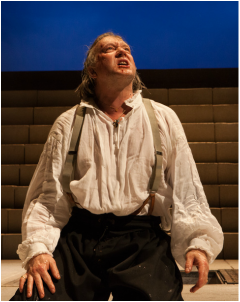 Twinkle: Jasper Britton as The Jew of Malta. Photo by Ellie Kurtz. © RSC
Twinkle: Jasper Britton as The Jew of Malta. Photo by Ellie Kurtz. © RSC
THE JEW OF MALTA
* * * *
April 25, 2015
RSC, The Swan Theatre, Stratford-upon-Avon, until Tuesday, September 8, 2015
FORGET any worries about anti-Semitism in this 400-year-old Christopher Marlowe tragedy. RSC debutant director Justin Audibert renders it thrillingly up to date by drawing out its universal themes of greed, revenge and casual racism. Yes, the eponymous Jew has an evil streak a mile wide, but his deceitfulness and treachery are more than matched by the Christians and Turks who attack him.
The glee with which these are played out by a vibrant cast contribute much to the overall success of the production. It rarely stands still to draw breath, let alone meditate on the unfolding drama. Instead, Marlowe and Audibert give us relentless action, implausible plot twists and a thundering thriller of political intrigue and personal vengeance.
The whole show hinges on its central performance, and Jasper Britton hurls himself at the role of Barabas with brilliantly controlled recklessness. His energy and raw power are constantly gripping, lurching from emotion to emotion as he’s first stripped of his wealth by Malta’s governor to pay off the marauding Turkish army, then abandoned by the daughter he’s just tricked, and finally betrayed by those closest to him.
Britton has a mean twinkle in his eye, but it’s far from a one-man show. Steven Pacey is a finely aristocratic Maltese governor Ferneze, Catrin Stewart a judicious mixture of brittle and bold as Barabas’s daughter Abigail, while Geoffrey Freshwater and Matthew Kelly offer an enjoyable matching pair of Friars niggling each other over her potential conversion.
Lily Arnold’s simple stone wall design is well used and effective, and Oliver Fenwick’s lighting and Jonathan Girling’s atmospheric music add considerably to the effectiveness of the storytelling. The decision to play in Elizabethan costume and period proves a wise one, allowing Marlowe’s verse and the complex narrative plenty of room to speak for themselves, while also giving the drama an entirely appropriate context.
In a witty opening, the prologue is delivered by a man in a T-shirt that sports a logo reading RMC – Royal Marlowe Company. With productions as entertaining as this, you do start to wonder whether things might have worked out a little differently…
* * * *
April 25, 2015
RSC, The Swan Theatre, Stratford-upon-Avon, until Tuesday, September 8, 2015
FORGET any worries about anti-Semitism in this 400-year-old Christopher Marlowe tragedy. RSC debutant director Justin Audibert renders it thrillingly up to date by drawing out its universal themes of greed, revenge and casual racism. Yes, the eponymous Jew has an evil streak a mile wide, but his deceitfulness and treachery are more than matched by the Christians and Turks who attack him.
The glee with which these are played out by a vibrant cast contribute much to the overall success of the production. It rarely stands still to draw breath, let alone meditate on the unfolding drama. Instead, Marlowe and Audibert give us relentless action, implausible plot twists and a thundering thriller of political intrigue and personal vengeance.
The whole show hinges on its central performance, and Jasper Britton hurls himself at the role of Barabas with brilliantly controlled recklessness. His energy and raw power are constantly gripping, lurching from emotion to emotion as he’s first stripped of his wealth by Malta’s governor to pay off the marauding Turkish army, then abandoned by the daughter he’s just tricked, and finally betrayed by those closest to him.
Britton has a mean twinkle in his eye, but it’s far from a one-man show. Steven Pacey is a finely aristocratic Maltese governor Ferneze, Catrin Stewart a judicious mixture of brittle and bold as Barabas’s daughter Abigail, while Geoffrey Freshwater and Matthew Kelly offer an enjoyable matching pair of Friars niggling each other over her potential conversion.
Lily Arnold’s simple stone wall design is well used and effective, and Oliver Fenwick’s lighting and Jonathan Girling’s atmospheric music add considerably to the effectiveness of the storytelling. The decision to play in Elizabethan costume and period proves a wise one, allowing Marlowe’s verse and the complex narrative plenty of room to speak for themselves, while also giving the drama an entirely appropriate context.
In a witty opening, the prologue is delivered by a man in a T-shirt that sports a logo reading RMC – Royal Marlowe Company. With productions as entertaining as this, you do start to wonder whether things might have worked out a little differently…
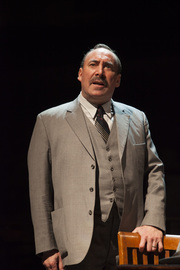 Triumph: Antony Sher as Willy Loman. Photo by Ellie Kurtz. © RSC
Triumph: Antony Sher as Willy Loman. Photo by Ellie Kurtz. © RSC
DEATH OF A SALESMAN
* * * *
April 25, 2015
RSC, Royal Shakespeare Theatre, Stratford-upon-Avon, until Saturday, May 2, 2015, then transferring to the Noel Coward Theatre, London, until Saturday, July 18, 2015
Marking the centenary of Arthur Miller’s birth, RSC artistic director Gregory Doran takes perhaps his most iconic protagonist, Willy Loman, and places him centre stage in the Royal Shakespeare Theatre. For such a little man, with little to show for his life, it’s a bold step.
But Willy’s dreams are big. They’ve always been big. Now, in the twilight of his career as a salesman, he’s forced to contemplate his own mortality and the notion of transferring his own dreams onto his unwilling sons Biff and Happy, all the while watched and implicitly supported by his long-suffering wife Linda.
Although plenty of ancillary characters come and go in Doran’s immaculately constructed production, it’s this central family quartet that grabs the attention from the outset and never lets go. Stephen Brimson Lewis’s inventive and versatile design renders their home claustrophobic and quietly intimidating, while opening out cleverly for the scenes from Willy’s memory or set in the outside world.
Alex Hassell and Sam Marks manage the difficult feat of delivering Willy’s sons as both grown-ups and gawky teenagers, and they play off each other as highly believable siblings. Harriet Walter is deceptively straightforward and dignified as their loyal mother, ready to spring to the fierce defence of her husband when required.
The real triumph, though, is Antony Sher’s performance as Willy. Utterly credible as a washed-up has-been desperately clinging to the fabricated futility he’s created for himself, Sher is achingly moving, whether he’s giving his boys a paternal pep talk or convincing himself that suicide is the best option for everyone.
And at the height of his greatest vulnerability, just when you think he’s finally realised that his life is not everything he claims it to be, suddenly he reaches deep inside for one more bash at self-deception. It raises a bitter, agonised laugh of astonishment from the audience.
It’s a towering performance in a powerful production. Whether Miller intended it to be quite as bleak and nihilistic as it’s presented here is debatable, and it’s this pessimism which slightly takes the edge off Doran’s revival, but its well-deserved transfer to London will allow plenty more people to be the judge.
* * * *
April 25, 2015
RSC, Royal Shakespeare Theatre, Stratford-upon-Avon, until Saturday, May 2, 2015, then transferring to the Noel Coward Theatre, London, until Saturday, July 18, 2015
Marking the centenary of Arthur Miller’s birth, RSC artistic director Gregory Doran takes perhaps his most iconic protagonist, Willy Loman, and places him centre stage in the Royal Shakespeare Theatre. For such a little man, with little to show for his life, it’s a bold step.
But Willy’s dreams are big. They’ve always been big. Now, in the twilight of his career as a salesman, he’s forced to contemplate his own mortality and the notion of transferring his own dreams onto his unwilling sons Biff and Happy, all the while watched and implicitly supported by his long-suffering wife Linda.
Although plenty of ancillary characters come and go in Doran’s immaculately constructed production, it’s this central family quartet that grabs the attention from the outset and never lets go. Stephen Brimson Lewis’s inventive and versatile design renders their home claustrophobic and quietly intimidating, while opening out cleverly for the scenes from Willy’s memory or set in the outside world.
Alex Hassell and Sam Marks manage the difficult feat of delivering Willy’s sons as both grown-ups and gawky teenagers, and they play off each other as highly believable siblings. Harriet Walter is deceptively straightforward and dignified as their loyal mother, ready to spring to the fierce defence of her husband when required.
The real triumph, though, is Antony Sher’s performance as Willy. Utterly credible as a washed-up has-been desperately clinging to the fabricated futility he’s created for himself, Sher is achingly moving, whether he’s giving his boys a paternal pep talk or convincing himself that suicide is the best option for everyone.
And at the height of his greatest vulnerability, just when you think he’s finally realised that his life is not everything he claims it to be, suddenly he reaches deep inside for one more bash at self-deception. It raises a bitter, agonised laugh of astonishment from the audience.
It’s a towering performance in a powerful production. Whether Miller intended it to be quite as bleak and nihilistic as it’s presented here is debatable, and it’s this pessimism which slightly takes the edge off Doran’s revival, but its well-deserved transfer to London will allow plenty more people to be the judge.
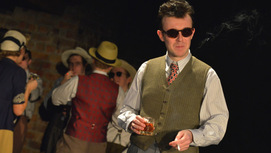 John Heffernan in the title role of Oppenheimer. Photo by Keith Pattison. © RSC
John Heffernan in the title role of Oppenheimer. Photo by Keith Pattison. © RSC
OPPENHEIMER
* * * *
January 23, 2015
RSC, The Swan Theatre, Stratford-upon-Avon, until Saturday, March 7, 2015
PLAYWRIGHT Tom Morton-Smith has taken an epic tale of war, politics and conspiracy and delivered a highly-charged, personal story of moral dilemmas, emotional trauma and ultimate tragedy.
How the charismatic J Robert Oppenheimer came to lead a team of vagabond scientists to develop the atom bomb that ended World War Two is not a revelation, and this new play brings little in the way of fresh information. What it has aplenty, however, is the domestic drama that accompanied the big story behind the scenes, including adultery, ambition and an alarming lack of scruples.
Morton-Smith’s taut and gripping script is well served by director Angus Jackson and a terrific, utterly believable ensemble cast, led by the extraordinary John Heffernan in the title role. At times pleasantly affable, he’s prone to launch into a look of startling intensity that reveals as much about the enigmatic Oppenheimer as any of his grandstanding speeches.
William Gaminara is in excellent form as the US Army General charged with keeping the wayward, possibly Communist-sympathising scientists on task, while Thomasin Rand and Catherine Steadman as Oppenheimer’s wife and lover respectively bring real humanity to their roles, struggling to find a place in his life alongside the all-consuming Manhattan project.
A simple but effective set by Robert Innes Hopkins makes superb use of The Swan’s space and Grant Olding’s 1940s-influenced score adds considerable texture to what is a thrilling retelling of event history with more than a dash of political intrigue and individual drive.
* * * *
January 23, 2015
RSC, The Swan Theatre, Stratford-upon-Avon, until Saturday, March 7, 2015
PLAYWRIGHT Tom Morton-Smith has taken an epic tale of war, politics and conspiracy and delivered a highly-charged, personal story of moral dilemmas, emotional trauma and ultimate tragedy.
How the charismatic J Robert Oppenheimer came to lead a team of vagabond scientists to develop the atom bomb that ended World War Two is not a revelation, and this new play brings little in the way of fresh information. What it has aplenty, however, is the domestic drama that accompanied the big story behind the scenes, including adultery, ambition and an alarming lack of scruples.
Morton-Smith’s taut and gripping script is well served by director Angus Jackson and a terrific, utterly believable ensemble cast, led by the extraordinary John Heffernan in the title role. At times pleasantly affable, he’s prone to launch into a look of startling intensity that reveals as much about the enigmatic Oppenheimer as any of his grandstanding speeches.
William Gaminara is in excellent form as the US Army General charged with keeping the wayward, possibly Communist-sympathising scientists on task, while Thomasin Rand and Catherine Steadman as Oppenheimer’s wife and lover respectively bring real humanity to their roles, struggling to find a place in his life alongside the all-consuming Manhattan project.
A simple but effective set by Robert Innes Hopkins makes superb use of The Swan’s space and Grant Olding’s 1940s-influenced score adds considerable texture to what is a thrilling retelling of event history with more than a dash of political intrigue and individual drive.
 David Troughton and Vivien Parry in The Shoemaker's Holiday. Photo by Pete Le May. © RSC
David Troughton and Vivien Parry in The Shoemaker's Holiday. Photo by Pete Le May. © RSC
THE SHOEMAKER’S HOLIDAY
* * *
December 20, 2014
RSC, Swan Theatre, Stratford-upon-Avon, until Saturday, March 7, 2015
IT’S hard to fault the intention behind the choice of plays in The Swan. The juxtaposition of some of Shakespeare’s contemporaries alongside the works of the Bard himself makes for fascinating historical context and an important re-evaluation of the importance and sheer extraordinariness of England’s greatest playwright.
But the simple fact of their existence is hardly enough to justify their production on the second stage of our foremost Shakespearean company, at considerable expense, with large casts and magnificent resources. Thomas Dekker’s 1599 comedy provides an illustrative case in point.
It might have been funny 400 years ago. Actually, I’m not totally convinced of that, but even if it were true, the jokes have failed to survive the intervening years. Some fruity insults and a bit of slapstick do not a comedy make, and director Phillip Breen struggles at times to derive either entertainment or, frankly, much interest from his raw material.
Production values are high, with an elegant set design by Max Jones and a six-piece band providing a subtle underscore, while the large company does its best with the uninspired content.
David Troughton, leading the cast as the eponymous shoemaker who rises implausibly to become Lord Mayor of London, makes a manful attempt to plumb humour from the long, wordy script, and there’s good comic support from Vivien Parry as his wife. Jack Holden offers the greatest fun of the night as a precocious, haughty but secretly mischievous King – a kind of prototype Prince Harry.
But there’s not much else to engage the attention or even provide useful context for what Mr Shakespeare was up to at the same time (Henry V, since you’re asking), and the resulting three hours ends up feeling just a bit worthy but dull.
* * *
December 20, 2014
RSC, Swan Theatre, Stratford-upon-Avon, until Saturday, March 7, 2015
IT’S hard to fault the intention behind the choice of plays in The Swan. The juxtaposition of some of Shakespeare’s contemporaries alongside the works of the Bard himself makes for fascinating historical context and an important re-evaluation of the importance and sheer extraordinariness of England’s greatest playwright.
But the simple fact of their existence is hardly enough to justify their production on the second stage of our foremost Shakespearean company, at considerable expense, with large casts and magnificent resources. Thomas Dekker’s 1599 comedy provides an illustrative case in point.
It might have been funny 400 years ago. Actually, I’m not totally convinced of that, but even if it were true, the jokes have failed to survive the intervening years. Some fruity insults and a bit of slapstick do not a comedy make, and director Phillip Breen struggles at times to derive either entertainment or, frankly, much interest from his raw material.
Production values are high, with an elegant set design by Max Jones and a six-piece band providing a subtle underscore, while the large company does its best with the uninspired content.
David Troughton, leading the cast as the eponymous shoemaker who rises implausibly to become Lord Mayor of London, makes a manful attempt to plumb humour from the long, wordy script, and there’s good comic support from Vivien Parry as his wife. Jack Holden offers the greatest fun of the night as a precocious, haughty but secretly mischievous King – a kind of prototype Prince Harry.
But there’s not much else to engage the attention or even provide useful context for what Mr Shakespeare was up to at the same time (Henry V, since you’re asking), and the resulting three hours ends up feeling just a bit worthy but dull.
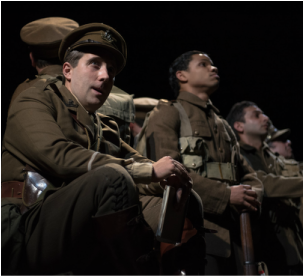 Joseph Kloska leads his men as Lieutenant Bruce Bairnsfather. Photo by Topher McGrillis. © RSC
Joseph Kloska leads his men as Lieutenant Bruce Bairnsfather. Photo by Topher McGrillis. © RSC
THE CHRISTMAS TRUCE
* * * *
December 19, 2014
RSC, Royal Shakespeare Theatre, Stratford-upon-Avon, until Saturday, January 31, 2015
THE story of the 1914 soccer-playing truce across the war-torn trenches of Flanders is so well-known these days as to be almost a cliché. It’s a compliment, then, to Phil Porter’s rewarding and nuanced script that the RSC’s festive offering never strays into melodrama or pathos. In fact, under Erica Whyman’s direction, it delivers emotional punch and historical drama in equal measure.
Much of its success is down to the imaginative staging, which converts simple wooden chairs and stepladders into dugouts, church halls and even trains, brilliantly lit by Charles Balfour to supplement the power of the audience’s imagination.
That’s to take nothing away from the excellent cast, who strike exactly the right notes of camaraderie and tension as the story unfolds of the unwilling Warwickshire Regiment heading off to this unwanted war.
Joseph Kloska is a beautifully bumbling but dedicated Lieutenant Bruce Bairnsfather, a real-life artist whose cartoons of life in the trenches would go on to become a staple of wartime entertainment. Loved by his men and respected by his colleagues, Bairnsfather emerges in Kloska’s portrait as a quiet hero.
By contrast, Gerard Horan is fabulously loud and bombastic as the main object of Bairnsfather’s artistic eye – the comic private immortalised in the cartoons as Old Bill. Horan conveys the wizened old trouper with a judicious mix of affability and world-weariness and ultimately carries the weight of the show on his broad shoulders.
Jamie Newall and Nick Haverson lead the opposing forces with style and reserved teutonic flair as members of the Saxon regiment that inspires the Christmas ceasefire with its rendition of Silent Night, and the sense of wary comradeship despite the enmity is almost palpable.
There’s a rather superfluous and heavy-handed subplot about squabbling frontline nurses who reach their own form of truce for the greater good, but for the most part, this is a lively, poignant and evocative tribute to the fallen Warwickshires and that extraordinary moment in history.
* * * *
December 19, 2014
RSC, Royal Shakespeare Theatre, Stratford-upon-Avon, until Saturday, January 31, 2015
THE story of the 1914 soccer-playing truce across the war-torn trenches of Flanders is so well-known these days as to be almost a cliché. It’s a compliment, then, to Phil Porter’s rewarding and nuanced script that the RSC’s festive offering never strays into melodrama or pathos. In fact, under Erica Whyman’s direction, it delivers emotional punch and historical drama in equal measure.
Much of its success is down to the imaginative staging, which converts simple wooden chairs and stepladders into dugouts, church halls and even trains, brilliantly lit by Charles Balfour to supplement the power of the audience’s imagination.
That’s to take nothing away from the excellent cast, who strike exactly the right notes of camaraderie and tension as the story unfolds of the unwilling Warwickshire Regiment heading off to this unwanted war.
Joseph Kloska is a beautifully bumbling but dedicated Lieutenant Bruce Bairnsfather, a real-life artist whose cartoons of life in the trenches would go on to become a staple of wartime entertainment. Loved by his men and respected by his colleagues, Bairnsfather emerges in Kloska’s portrait as a quiet hero.
By contrast, Gerard Horan is fabulously loud and bombastic as the main object of Bairnsfather’s artistic eye – the comic private immortalised in the cartoons as Old Bill. Horan conveys the wizened old trouper with a judicious mix of affability and world-weariness and ultimately carries the weight of the show on his broad shoulders.
Jamie Newall and Nick Haverson lead the opposing forces with style and reserved teutonic flair as members of the Saxon regiment that inspires the Christmas ceasefire with its rendition of Silent Night, and the sense of wary comradeship despite the enmity is almost palpable.
There’s a rather superfluous and heavy-handed subplot about squabbling frontline nurses who reach their own form of truce for the greater good, but for the most part, this is a lively, poignant and evocative tribute to the fallen Warwickshires and that extraordinary moment in history.
THE WITCH OF EDMONTON
* * *
November 14, 2014
RSC, The Swan Theatre, Stratford-upon-Avon, until Saturday, November 29, 2014
FIRST things first: it’s great to see Eileen Atkins on stage at the RSC, even if it’s as a downtrodden old hag in a ropey old wig. Whenever she’s on – which is sadly not enough in this workmanlike revival of an overblown Jacobean drama – she commands the Swan with her presence.
The story is muddled and ridiculous, even by the supernatural standards of the day, and the multiplicity of authors with a nib in the inkpot doesn’t help. Suffice it to say that Atkins’s eponymous witch is accused of all sorts of nefarious goings-on in the village, while the locals are themselves quite capable of some mayhem of their own. Arthur Miller it ain’t, and the anomalous west country accents in the north London setting add another layer of mystification to the proceedings.
On the plus side, many of the performances are enjoyable, with Jay Simpson standing out as a bizarrely adorned devil in disguise as a black dog. His movements and leering are appropriately weird, although the overall effect is of a strangely affable demonic force, rather than one of terror. Elsewhere, Faye Castelow is a pleasing peasant girl who meets an untimely end, while stalwarts Geoffrey Freshwater, Ian Redford and Liz Crowther turn in dependable performances as the older generation.
Director Gregory Doran stages the whole grim performance on an equally grim set designed by Niki Turner, with usefully underscored music from the ever reliable Paul Englishby, and the result is an interesting curiosity that serves some contextual purpose for Jacobean drama without ever quite sparking into dramatic life itself.
* * *
November 14, 2014
RSC, The Swan Theatre, Stratford-upon-Avon, until Saturday, November 29, 2014
FIRST things first: it’s great to see Eileen Atkins on stage at the RSC, even if it’s as a downtrodden old hag in a ropey old wig. Whenever she’s on – which is sadly not enough in this workmanlike revival of an overblown Jacobean drama – she commands the Swan with her presence.
The story is muddled and ridiculous, even by the supernatural standards of the day, and the multiplicity of authors with a nib in the inkpot doesn’t help. Suffice it to say that Atkins’s eponymous witch is accused of all sorts of nefarious goings-on in the village, while the locals are themselves quite capable of some mayhem of their own. Arthur Miller it ain’t, and the anomalous west country accents in the north London setting add another layer of mystification to the proceedings.
On the plus side, many of the performances are enjoyable, with Jay Simpson standing out as a bizarrely adorned devil in disguise as a black dog. His movements and leering are appropriately weird, although the overall effect is of a strangely affable demonic force, rather than one of terror. Elsewhere, Faye Castelow is a pleasing peasant girl who meets an untimely end, while stalwarts Geoffrey Freshwater, Ian Redford and Liz Crowther turn in dependable performances as the older generation.
Director Gregory Doran stages the whole grim performance on an equally grim set designed by Niki Turner, with usefully underscored music from the ever reliable Paul Englishby, and the result is an interesting curiosity that serves some contextual purpose for Jacobean drama without ever quite sparking into dramatic life itself.
LOVE’S LABOUR’S LOST / LOVE’S LABOUR’S WON
* * * * * / * * * * *
October 25, 2014
RSC, Royal Shakespeare Theatre, Stratford-upon-Avon, until Saturday, March 14, 2015
LEAVING aside the rather gimmicky idea of re-labelling Much Ado About Nothing as Love’s Labour’s Won (there is a tenuous theory to support it but even artistic director Gregory Doran admits it’s a longshot), the decision to pair these two plays is a stroke of genius. You can’t help wondering why people aren’t doing it all the time.
Set either side of the First World War, this unusual but effective framing device allows director Christopher Luscombe to explore Edwardian frippery and Roaring Twenties flappery alongside the darker undertones of both plays, for which the shadow of war proves a useful backdrop.
His laudable ambitions and deft direction are reinforced to spectacular effect with some magnificent stagings. Simon Higlett’s extraordinary set, shared by both productions, is sumptuous, hugely imaginative and endlessly versatile in a design as wonderful as any I’ve seen at Stratford in recent years. Combined with Oliver Fenwick’s subtle, supportive lighting, it’s an absolute triumph.
The other major technical contributor to the overall success of the production is a simply delightful score from composer Nigel Hess. Capturing the spirit of everything from cod-G&S to some ravishing Ivor Novello-inspired lyrical songs, Hess’s music provides the perfect complement to the action, never interrupting but always enlightening and enhancing, whether it’s in a fully-staged production number or in his judicious, apposite underscoring.
With all these elements coming together so seamlessly, it’s a real pleasure to be able to record that the performances soar on this expressive foundation, enjoying the liberation and the playground provided by the creative team. The same cast performs both plays and clearly revels in the opportunities they offer.
There’s some beautifully judged comedy from John Hodgkinson as a Spanish guest of the court in LLL, while Nick Haverson makes the most of the twin nincompoops Costard and Dogberry without overblowing the mugging. Sam Alexander makes both a fine, upstanding King of Navarre and a nuanced, villainous Don John, while Michelle Terry offsets her restrained courtier Rosaline with a feisty, full-bodied Beatrice in the later play.
But there’s no doubting who’s the king of this double bill, and Edward Bennett is unquestionably up to the sizeable task. As Berowne in Love’s Labour’s Lost, he plots playfully and hilariously, while his Benedick is commanding, believable and a joy to be in the company of. Whether ramping up the comedy or pausing to heighten the poignancy, his timing is immaculate and he’s at the top of his game.
Luscombe coaxes a whole pack of superb performances out of his large, talented cast and, played out against the magical setting delivered by his creatives, conjures up a lost world in vivid reality. It’s merry, moving and a must-see.
* * * * * / * * * * *
October 25, 2014
RSC, Royal Shakespeare Theatre, Stratford-upon-Avon, until Saturday, March 14, 2015
LEAVING aside the rather gimmicky idea of re-labelling Much Ado About Nothing as Love’s Labour’s Won (there is a tenuous theory to support it but even artistic director Gregory Doran admits it’s a longshot), the decision to pair these two plays is a stroke of genius. You can’t help wondering why people aren’t doing it all the time.
Set either side of the First World War, this unusual but effective framing device allows director Christopher Luscombe to explore Edwardian frippery and Roaring Twenties flappery alongside the darker undertones of both plays, for which the shadow of war proves a useful backdrop.
His laudable ambitions and deft direction are reinforced to spectacular effect with some magnificent stagings. Simon Higlett’s extraordinary set, shared by both productions, is sumptuous, hugely imaginative and endlessly versatile in a design as wonderful as any I’ve seen at Stratford in recent years. Combined with Oliver Fenwick’s subtle, supportive lighting, it’s an absolute triumph.
The other major technical contributor to the overall success of the production is a simply delightful score from composer Nigel Hess. Capturing the spirit of everything from cod-G&S to some ravishing Ivor Novello-inspired lyrical songs, Hess’s music provides the perfect complement to the action, never interrupting but always enlightening and enhancing, whether it’s in a fully-staged production number or in his judicious, apposite underscoring.
With all these elements coming together so seamlessly, it’s a real pleasure to be able to record that the performances soar on this expressive foundation, enjoying the liberation and the playground provided by the creative team. The same cast performs both plays and clearly revels in the opportunities they offer.
There’s some beautifully judged comedy from John Hodgkinson as a Spanish guest of the court in LLL, while Nick Haverson makes the most of the twin nincompoops Costard and Dogberry without overblowing the mugging. Sam Alexander makes both a fine, upstanding King of Navarre and a nuanced, villainous Don John, while Michelle Terry offsets her restrained courtier Rosaline with a feisty, full-bodied Beatrice in the later play.
But there’s no doubting who’s the king of this double bill, and Edward Bennett is unquestionably up to the sizeable task. As Berowne in Love’s Labour’s Lost, he plots playfully and hilariously, while his Benedick is commanding, believable and a joy to be in the company of. Whether ramping up the comedy or pausing to heighten the poignancy, his timing is immaculate and he’s at the top of his game.
Luscombe coaxes a whole pack of superb performances out of his large, talented cast and, played out against the magical setting delivered by his creatives, conjures up a lost world in vivid reality. It’s merry, moving and a must-see.
THE WHITE DEVIL
* * * *
August 15, 2014
RSC, The Swan, Stratford-upon-Avon, until Saturday, November 29, 2014
Director Maria Aberg has, it must be said, a certain style to her work. Keen to update old classics to contemporary dress, feminist sensibilities and in-yer-face ultra-modernism, she’s already exercised these techniques on King John and As You Like It. Now it’s John Webster who gets the treatment.
So we’re given provocative video projections, a gender-swapping villain Flaminio and some uncomfortably graphic sexual overtones, coupled with a dispiriting treatment of the female actors in particular.
All this gimmickry is utterly unnecessary and ultimately unhelpful. Fortunately, Webster’s revenge tragedy survives as a gripping conspiracy thriller, and it’s largely down to some terrific performances.
At the heart of it are the duplicitous adulterers Vittoria and Bracciano, whose scheming results in murder and misery for those around them. Kirsty Bushell and David Sturzaker are both on blistering form, fiery and credible and chillingly watchable as the doomed lovers.
Faye Castelow and Keir Charles as their wronged other halves also make a fine impression with their accomplished performances, while Liz Crowther is almost in danger of stealing the show as Vittoria’s heartbroken mother.
Laura Elphinstone offers a decent enough Flaminio, and recasting the character as Vittoria’s deceitful sister, rather than dominating brother, is an interesting choice. Less explicable is the decision to make her, alone among her family, a Geordie.
But this is typical of the whole production, which is also poorly served by a brash design and some thoroughly irritating underscored music. I would have loved to see this talented clutch of beautifully delivered performances in a staging that truly did them justice. The real tragedy here is that, if you can see past the flashy tricksiness, there’s a stunning show trying desperately to get out.
THE TWO GENTLEMEN OF VERONA
* * *
August 14, 2014
RSC, Royal Shakespeare Theatre, Stratford-upon-Avon, until Thursday, September 4, 2014
DIRECTOR Simon Godwin makes his debut for the RSC with this zippy, amiable romp through one of Shakespeare’s earliest comedies. Not fully staged in Stratford for more than 40 years, it provides both a pleasing reacquaintance with the play and a useful calling card for Godwin.
The story of thwarted loves, secret elopements and cross dressing – well, this is an early Shakespeare comedy – is clearly told and ably handled by both the director and his talented cast and creative team. Designer Paul Wills gives us a romanticised Italy that’s all checkerboard tablecloths and sharp fashion, providing an elegant backdrop to the well-paced action, while the onstage band of accomplished musicians adds much to the evocative charm.
Among the players, Michael Marcus and Sarah MacRae stand out as Valentine and Silvia, one of the pairs of lovers destined to undergo a series of confusions and complications on their path to true love. But there are plenty of other performances to enjoy, not least the partnership between Roger Morlidge as the comedy turn Launce and the show-stealing Mossop as his dog Crab.
It’s a very enjoyable presentation of a lesser Bardic piece which should do good business with the summer tourists. And if it fails to lodge firmly in the memory or emerge strikingly as a landmark production, it’s hardly the fault of the actors or their capable commander in chief.
DEAN FRIEDMAN
* * * * *
July 7, 2014
No. 1 Shakespeare Street, Stratford-upon-Avon, then touring
IF all you know of Dean Friedman is Lucky Stars and “Well, Well,” Said the Rocking Chair, then you’re missing out. This unassuming but hugely talented singer-songwriter has spent more than 40 years honing a craft that has lost none of its early skill, passion and humour.
There are occasional hints of all kinds of other people – Randy Newman, Sting, even Tom Lehrer – but Friedman is unequivocally his own man, a writer and performer with a wealth of entertaining, satirical and occasionally barbed material.
His latest UK outing will take in the Edinburgh Festival and a host of dates nationwide as a solo performer, but he’s supported for the first leg of the tour by his stunning band, The South Street Fusion Project. Drummer Kiril Orenstein, virtuoso bassist Chris Talio (wielding an extraordinary seven-string instrument) and Friedman’s own multi-instrumentalist son Sam provide a class accompaniment to their silver-haired frontman.
All the old favourites are there, including Lydia, Ariel and the BBC-banned McDonald’s Girl, but they’re judiciously intermingled with some instrumental jazz fusion numbers that dazzlingly showcase the band’s considerable musical talent. Friedman Junior, for instance, proves himself a brilliantly accomplished harmonica player alongside his keyboard skills.
The intimate, welcoming venue makes the ideal setting for this warm, witty and rather wonderful performer, who allows his songs to do the talking in the most eloquent fashion. For fans of great musicianship and intelligent songwriting, it’s a chance not to be missed.
HENRY IV Parts 1 and 2
* * * * * / * * * *
June 7, 2014
RSC, Royal Shakespeare Theatre, Stratford-upon-Avon, until Saturday, September 6, 2014
NOT the most memorable of Shakespeare’s history plays, the two parts of Henry IV can be dense, stodgy and overly political in the wrong hands, making for a long six hours of complex manoeuvring. As RSC artistic director Gregory Doran proves, however, in the right hands they can be fiery, fascinating and fun.
This pair of productions have everything going for them. There’s decaying elegance in Stephen Brimson Lewis’s stunning designs and Tim Mitchell’s unobtrusive lighting. There’s some echoingly haunting music from possibly this country’s finest composer of theatre music, Paul Englishby. And there’s some astonishingly accomplished stage fighting courtesy of veteran fight director Terry King. And all that’s before you even start on the performances.
Although named after the king who deposed Richard II (who makes a fleeting but effective appearance to link this play to its David Tennant-starred predecessor), Henry IV is most notable by his relative absence. When he does turn up, however, Jasper Britton makes him highly affecting, wracked with guilt for his usurpation, visibly declining in health and a delicate mixture of brittle and battle-weary. Britton’s verse-speaking is as good as I’ve heard on the new RSC stage and his meaning and intent are crystal-clear as a result – an impressive achievement in this tricky role.
Alex Hassell plays his dissolute son Hal, the Prince of Wales, in wonderfully bombastic, cavalier style, bringing to mind a more contemporary namesake in his reckless disregard for public opinion in the quest for a good time. But when the time comes for repentance and rejection of his former life, he’s powerfully credible and adopts royalty with ease as the new Henry V.
The entire company is strong, promising much for the roll-out of all 36 Shakespeare plays over the next two or three years, and it’s particularly pleasing to see the female parts played as neither wet nor whining – full marks, then, to Jennifer Kirby, Paola Dionisotti and Nia Gwynne.
But there’s no question whose night – or should that be knight? – this is. The casting of Sir Antony Sher as Falstaff is nothing short of genius; his performance ditto. With utterly realistic padding and a head swathed in shaggy grey hair and beard, he looks, sounds and behaves as brilliantly roguish as you could hope for. He’s never less than totally believable as the lovable drunkard whose sheer charm and endless fund of invented anecdotes have kept him in sack and good company for years. In the pantheon of Sher’s stellar roles for the RSC, this is, quite simply, as memorable and definitive as any of them.
Part 2 may fare a little less well than Part 1, thanks to its intensifying of the politics and power-play, but taken together, these Henrys achieve a reconsideration of the plays within the canon as well worth a second look.
ARDEN OF FAVERSHAM
* * * *
May 8, 2014
RSC, The Swan, Stratford-upon-Avon, until Thursday, October 2, 2014
THE second in the Swan’s season of Elizabethan and Jacobean plays featuring strong women, under the season title Roaring Girls, is an anonymous, supposedly true story of the scheming wife of a Kent merchant. Together with her young, downmarket lover, she plots the murder of her wealthy husband in a variety of increasingly unlikely ways.
While this anti-heroine could hardly be held up as a role model for strong women, there is something distinctly beguiling and appealing about Sharon Small’s portrayal of Alice Arden. She’s got a wicked look in her eye and a swagger in her walk that makes her credibly terrifying as the central figure.
Ostensibly a black comedy, the play’s been transported to modern-day London, where its avaricious entrepreneurs, trashy trophy wives and East End gangsters fit in perfectly. Polly Findlay’s assured direction keeps the pace moving through an uninterrupted hour and three-quarters, while the characterisations across the ensemble are clearly well thought through and consistent.
Ian Redford may be a little too cuddly and Santa-like as the eponymous merchant, but his mistrust of his wayward wife and his suspicion of those closest to him ring true in his sturdy performance. Keir Charles, meanwhile, invests Alice’s lover Mosby with a smarmy, weaselly charm that is all too believable in this world of crooks and conmen.
The story itself, while it may not have the depth or literary prowess of its contemporary Shakespeare, is an entertaining yarn of attempted murder, conspiracy and the abuse of power. Exploiting such dark themes for comic effect is always a little discomforting, but the design, lighting and music (Merle Hensel, Lee Curran and Dan Jones respectively) mesh judiciously to provide an impressive backdrop to the tawdry tale.
One word of warning, though: avoid the front row if you’re wearing your best frock. Enough said.
THE ROARING GIRL
* * *
April 16, 2014
RSC, Swan Theatre, Stratford-upon-Avon until Tuesday, September 30, 2014
IT’S when you see some of the work of his contemporaries that you realise just how good Shakespeare is. This comedy by Thomas Dekker and Thomas Middleton is an interesting historical curiosity, but barely worthy of the expense, attention and resources that have been thrown at it in this RSC production.
Directed by RSC debutante Jo Davies, there’s plenty of knockabout stuff, double entendre and laddish behaviour, but at best it’s broad comedy, at worst coarse, unsatisfying and not all that funny.
It doesn’t help that Davies has chosen to set it in Victorian times, with a further anachronism in the bizarre, harsh music soundtrack from Gary Yershon. This fuses vaguely jazzy saxophone, trumpet, drum and bass with some utterly incongruous and mystifying hip-hop, rock and even rap.
The result is, frankly, a bit of a mess. Naomi Dawson’s lush designs are completely at odds with the brash tone of the production, while the story itself – such as it is – meanders aimlessly through a series of set pieces with some comedy business thrown in apparently to keep up the tempo.
And this highlights the play’s biggest flaw: its paper-thin narrative. Sebastian Wengrave wants to marry Mary Fitzallard but his father thinks she’s beneath him. The young man duly tricks his dad into thinking he wants to marry the dissolute, cross-dressing Moll Cutpurse – the Roaring Girl of the title – so that Mary looks a good choice by comparison. And, er… that’s it.
The fundamental problem is that it renders Moll herself as incidental to proceedings, and very much a passive character, not even the main protagonist. There’s some fun to be found in Lisa Dillon’s performance, all East End truculence and boyish swagger, but it’s not enough to carry an evening.
Elsewhere, Keir Charles shines as one of Sebastian’s wealthy, charmless coterie, and Christopher Middleton makes the most of a couple of amusing cameos. But overall the large cast’s considerable talents are sadly underused and the finished product – while admittedly going down well with some elements of the audience – is hardly a roaring success.
WOLF HALL / BRING UP THE BODIES
* * * *
January 8, 2014
RSC, Swan Theatre, Stratford-upon-Avon, until Saturday, March 29, 2014
Hilary Mantel’s two award-winning novels about the rise of Henry VIII’s right-hand man Thomas Cromwell are dense, sweeping and epic. In transferring them to the stage, adapter Mike Poulton wisely opts for storytelling clarity above all else.
There was a danger, as with his earlier RSC adaptation Morte d’Arthur, that things might descend into Pythonesque self-parody and unintentional comedy.
Fortunately for the RSC, the two plays – particularly when viewed together as a single entity – are focused, vibrant and dazzling in their ambition.
The narrative is well-served by director Jeremy Herrin, the artistic director of Headlong who here makes his RSC debut with flying colours. What could be a complicated, messy re-interpretation of the traditionally dim view of Cromwell’s scheming instead becomes a fascinating tale of intrigue, self-protection and political manoeuvring to match any modern spin doctor of the likes of Malcolm Tucker in The Thick of It.
Playing Cromwell, Ben Miles bears a certain resemblance to the foul-mouthed Tucker, but his machinations are much more subtle and low-key, given the nature of the possible result of getting it wrong. Miles is never less than commanding in a huge role – he’s barely off-stage in more than six hours of theatre – but it’s a performance of nuance and real intelligence, as befits a man who survived three of Henry’s marriage manipulations.
Nathaniel Parker is strikingly good as Henry himself, creating a conflicted, three-dimensional character out of the mental caricature we all carry from our schooldays, and these two central figures are well matched by a large and thoroughly dependable supporting cast.
Lydia Leonard’s Anne Boleyn, Daniel Fraser as Cromwell’s young son Gregory and Joshua James as his eager clerk are especially confident and impressive, while Paul Jesson’s magisterial Cardinal Wolsey manages to invest this larger-than-life historical giant with pathos and vulnerability.
One may not always share Mantel’s evident sympathies with some individuals, but the story as it is unfolded in this sell-out production is constantly gripping, powerfully dramatic and ultimately enlightening. The queue for returns is certainly worth the effort.
* * * *
August 15, 2014
RSC, The Swan, Stratford-upon-Avon, until Saturday, November 29, 2014
Director Maria Aberg has, it must be said, a certain style to her work. Keen to update old classics to contemporary dress, feminist sensibilities and in-yer-face ultra-modernism, she’s already exercised these techniques on King John and As You Like It. Now it’s John Webster who gets the treatment.
So we’re given provocative video projections, a gender-swapping villain Flaminio and some uncomfortably graphic sexual overtones, coupled with a dispiriting treatment of the female actors in particular.
All this gimmickry is utterly unnecessary and ultimately unhelpful. Fortunately, Webster’s revenge tragedy survives as a gripping conspiracy thriller, and it’s largely down to some terrific performances.
At the heart of it are the duplicitous adulterers Vittoria and Bracciano, whose scheming results in murder and misery for those around them. Kirsty Bushell and David Sturzaker are both on blistering form, fiery and credible and chillingly watchable as the doomed lovers.
Faye Castelow and Keir Charles as their wronged other halves also make a fine impression with their accomplished performances, while Liz Crowther is almost in danger of stealing the show as Vittoria’s heartbroken mother.
Laura Elphinstone offers a decent enough Flaminio, and recasting the character as Vittoria’s deceitful sister, rather than dominating brother, is an interesting choice. Less explicable is the decision to make her, alone among her family, a Geordie.
But this is typical of the whole production, which is also poorly served by a brash design and some thoroughly irritating underscored music. I would have loved to see this talented clutch of beautifully delivered performances in a staging that truly did them justice. The real tragedy here is that, if you can see past the flashy tricksiness, there’s a stunning show trying desperately to get out.
THE TWO GENTLEMEN OF VERONA
* * *
August 14, 2014
RSC, Royal Shakespeare Theatre, Stratford-upon-Avon, until Thursday, September 4, 2014
DIRECTOR Simon Godwin makes his debut for the RSC with this zippy, amiable romp through one of Shakespeare’s earliest comedies. Not fully staged in Stratford for more than 40 years, it provides both a pleasing reacquaintance with the play and a useful calling card for Godwin.
The story of thwarted loves, secret elopements and cross dressing – well, this is an early Shakespeare comedy – is clearly told and ably handled by both the director and his talented cast and creative team. Designer Paul Wills gives us a romanticised Italy that’s all checkerboard tablecloths and sharp fashion, providing an elegant backdrop to the well-paced action, while the onstage band of accomplished musicians adds much to the evocative charm.
Among the players, Michael Marcus and Sarah MacRae stand out as Valentine and Silvia, one of the pairs of lovers destined to undergo a series of confusions and complications on their path to true love. But there are plenty of other performances to enjoy, not least the partnership between Roger Morlidge as the comedy turn Launce and the show-stealing Mossop as his dog Crab.
It’s a very enjoyable presentation of a lesser Bardic piece which should do good business with the summer tourists. And if it fails to lodge firmly in the memory or emerge strikingly as a landmark production, it’s hardly the fault of the actors or their capable commander in chief.
DEAN FRIEDMAN
* * * * *
July 7, 2014
No. 1 Shakespeare Street, Stratford-upon-Avon, then touring
IF all you know of Dean Friedman is Lucky Stars and “Well, Well,” Said the Rocking Chair, then you’re missing out. This unassuming but hugely talented singer-songwriter has spent more than 40 years honing a craft that has lost none of its early skill, passion and humour.
There are occasional hints of all kinds of other people – Randy Newman, Sting, even Tom Lehrer – but Friedman is unequivocally his own man, a writer and performer with a wealth of entertaining, satirical and occasionally barbed material.
His latest UK outing will take in the Edinburgh Festival and a host of dates nationwide as a solo performer, but he’s supported for the first leg of the tour by his stunning band, The South Street Fusion Project. Drummer Kiril Orenstein, virtuoso bassist Chris Talio (wielding an extraordinary seven-string instrument) and Friedman’s own multi-instrumentalist son Sam provide a class accompaniment to their silver-haired frontman.
All the old favourites are there, including Lydia, Ariel and the BBC-banned McDonald’s Girl, but they’re judiciously intermingled with some instrumental jazz fusion numbers that dazzlingly showcase the band’s considerable musical talent. Friedman Junior, for instance, proves himself a brilliantly accomplished harmonica player alongside his keyboard skills.
The intimate, welcoming venue makes the ideal setting for this warm, witty and rather wonderful performer, who allows his songs to do the talking in the most eloquent fashion. For fans of great musicianship and intelligent songwriting, it’s a chance not to be missed.
HENRY IV Parts 1 and 2
* * * * * / * * * *
June 7, 2014
RSC, Royal Shakespeare Theatre, Stratford-upon-Avon, until Saturday, September 6, 2014
NOT the most memorable of Shakespeare’s history plays, the two parts of Henry IV can be dense, stodgy and overly political in the wrong hands, making for a long six hours of complex manoeuvring. As RSC artistic director Gregory Doran proves, however, in the right hands they can be fiery, fascinating and fun.
This pair of productions have everything going for them. There’s decaying elegance in Stephen Brimson Lewis’s stunning designs and Tim Mitchell’s unobtrusive lighting. There’s some echoingly haunting music from possibly this country’s finest composer of theatre music, Paul Englishby. And there’s some astonishingly accomplished stage fighting courtesy of veteran fight director Terry King. And all that’s before you even start on the performances.
Although named after the king who deposed Richard II (who makes a fleeting but effective appearance to link this play to its David Tennant-starred predecessor), Henry IV is most notable by his relative absence. When he does turn up, however, Jasper Britton makes him highly affecting, wracked with guilt for his usurpation, visibly declining in health and a delicate mixture of brittle and battle-weary. Britton’s verse-speaking is as good as I’ve heard on the new RSC stage and his meaning and intent are crystal-clear as a result – an impressive achievement in this tricky role.
Alex Hassell plays his dissolute son Hal, the Prince of Wales, in wonderfully bombastic, cavalier style, bringing to mind a more contemporary namesake in his reckless disregard for public opinion in the quest for a good time. But when the time comes for repentance and rejection of his former life, he’s powerfully credible and adopts royalty with ease as the new Henry V.
The entire company is strong, promising much for the roll-out of all 36 Shakespeare plays over the next two or three years, and it’s particularly pleasing to see the female parts played as neither wet nor whining – full marks, then, to Jennifer Kirby, Paola Dionisotti and Nia Gwynne.
But there’s no question whose night – or should that be knight? – this is. The casting of Sir Antony Sher as Falstaff is nothing short of genius; his performance ditto. With utterly realistic padding and a head swathed in shaggy grey hair and beard, he looks, sounds and behaves as brilliantly roguish as you could hope for. He’s never less than totally believable as the lovable drunkard whose sheer charm and endless fund of invented anecdotes have kept him in sack and good company for years. In the pantheon of Sher’s stellar roles for the RSC, this is, quite simply, as memorable and definitive as any of them.
Part 2 may fare a little less well than Part 1, thanks to its intensifying of the politics and power-play, but taken together, these Henrys achieve a reconsideration of the plays within the canon as well worth a second look.
ARDEN OF FAVERSHAM
* * * *
May 8, 2014
RSC, The Swan, Stratford-upon-Avon, until Thursday, October 2, 2014
THE second in the Swan’s season of Elizabethan and Jacobean plays featuring strong women, under the season title Roaring Girls, is an anonymous, supposedly true story of the scheming wife of a Kent merchant. Together with her young, downmarket lover, she plots the murder of her wealthy husband in a variety of increasingly unlikely ways.
While this anti-heroine could hardly be held up as a role model for strong women, there is something distinctly beguiling and appealing about Sharon Small’s portrayal of Alice Arden. She’s got a wicked look in her eye and a swagger in her walk that makes her credibly terrifying as the central figure.
Ostensibly a black comedy, the play’s been transported to modern-day London, where its avaricious entrepreneurs, trashy trophy wives and East End gangsters fit in perfectly. Polly Findlay’s assured direction keeps the pace moving through an uninterrupted hour and three-quarters, while the characterisations across the ensemble are clearly well thought through and consistent.
Ian Redford may be a little too cuddly and Santa-like as the eponymous merchant, but his mistrust of his wayward wife and his suspicion of those closest to him ring true in his sturdy performance. Keir Charles, meanwhile, invests Alice’s lover Mosby with a smarmy, weaselly charm that is all too believable in this world of crooks and conmen.
The story itself, while it may not have the depth or literary prowess of its contemporary Shakespeare, is an entertaining yarn of attempted murder, conspiracy and the abuse of power. Exploiting such dark themes for comic effect is always a little discomforting, but the design, lighting and music (Merle Hensel, Lee Curran and Dan Jones respectively) mesh judiciously to provide an impressive backdrop to the tawdry tale.
One word of warning, though: avoid the front row if you’re wearing your best frock. Enough said.
THE ROARING GIRL
* * *
April 16, 2014
RSC, Swan Theatre, Stratford-upon-Avon until Tuesday, September 30, 2014
IT’S when you see some of the work of his contemporaries that you realise just how good Shakespeare is. This comedy by Thomas Dekker and Thomas Middleton is an interesting historical curiosity, but barely worthy of the expense, attention and resources that have been thrown at it in this RSC production.
Directed by RSC debutante Jo Davies, there’s plenty of knockabout stuff, double entendre and laddish behaviour, but at best it’s broad comedy, at worst coarse, unsatisfying and not all that funny.
It doesn’t help that Davies has chosen to set it in Victorian times, with a further anachronism in the bizarre, harsh music soundtrack from Gary Yershon. This fuses vaguely jazzy saxophone, trumpet, drum and bass with some utterly incongruous and mystifying hip-hop, rock and even rap.
The result is, frankly, a bit of a mess. Naomi Dawson’s lush designs are completely at odds with the brash tone of the production, while the story itself – such as it is – meanders aimlessly through a series of set pieces with some comedy business thrown in apparently to keep up the tempo.
And this highlights the play’s biggest flaw: its paper-thin narrative. Sebastian Wengrave wants to marry Mary Fitzallard but his father thinks she’s beneath him. The young man duly tricks his dad into thinking he wants to marry the dissolute, cross-dressing Moll Cutpurse – the Roaring Girl of the title – so that Mary looks a good choice by comparison. And, er… that’s it.
The fundamental problem is that it renders Moll herself as incidental to proceedings, and very much a passive character, not even the main protagonist. There’s some fun to be found in Lisa Dillon’s performance, all East End truculence and boyish swagger, but it’s not enough to carry an evening.
Elsewhere, Keir Charles shines as one of Sebastian’s wealthy, charmless coterie, and Christopher Middleton makes the most of a couple of amusing cameos. But overall the large cast’s considerable talents are sadly underused and the finished product – while admittedly going down well with some elements of the audience – is hardly a roaring success.
WOLF HALL / BRING UP THE BODIES
* * * *
January 8, 2014
RSC, Swan Theatre, Stratford-upon-Avon, until Saturday, March 29, 2014
Hilary Mantel’s two award-winning novels about the rise of Henry VIII’s right-hand man Thomas Cromwell are dense, sweeping and epic. In transferring them to the stage, adapter Mike Poulton wisely opts for storytelling clarity above all else.
There was a danger, as with his earlier RSC adaptation Morte d’Arthur, that things might descend into Pythonesque self-parody and unintentional comedy.
Fortunately for the RSC, the two plays – particularly when viewed together as a single entity – are focused, vibrant and dazzling in their ambition.
The narrative is well-served by director Jeremy Herrin, the artistic director of Headlong who here makes his RSC debut with flying colours. What could be a complicated, messy re-interpretation of the traditionally dim view of Cromwell’s scheming instead becomes a fascinating tale of intrigue, self-protection and political manoeuvring to match any modern spin doctor of the likes of Malcolm Tucker in The Thick of It.
Playing Cromwell, Ben Miles bears a certain resemblance to the foul-mouthed Tucker, but his machinations are much more subtle and low-key, given the nature of the possible result of getting it wrong. Miles is never less than commanding in a huge role – he’s barely off-stage in more than six hours of theatre – but it’s a performance of nuance and real intelligence, as befits a man who survived three of Henry’s marriage manipulations.
Nathaniel Parker is strikingly good as Henry himself, creating a conflicted, three-dimensional character out of the mental caricature we all carry from our schooldays, and these two central figures are well matched by a large and thoroughly dependable supporting cast.
Lydia Leonard’s Anne Boleyn, Daniel Fraser as Cromwell’s young son Gregory and Joshua James as his eager clerk are especially confident and impressive, while Paul Jesson’s magisterial Cardinal Wolsey manages to invest this larger-than-life historical giant with pathos and vulnerability.
One may not always share Mantel’s evident sympathies with some individuals, but the story as it is unfolded in this sell-out production is constantly gripping, powerfully dramatic and ultimately enlightening. The queue for returns is certainly worth the effort.
For Stratford reviews from 2015, please click here
For Stratford reviews from 2014, please click here
For Stratford reviews from 2013, please click here
For Stratford reviews from 2012, please click here
For Stratford reviews from 2011, please click here
For Stratford reviews from 2010, please click here
For Stratford reviews from 2009, please click here
For Stratford reviews from 2008, please click here

